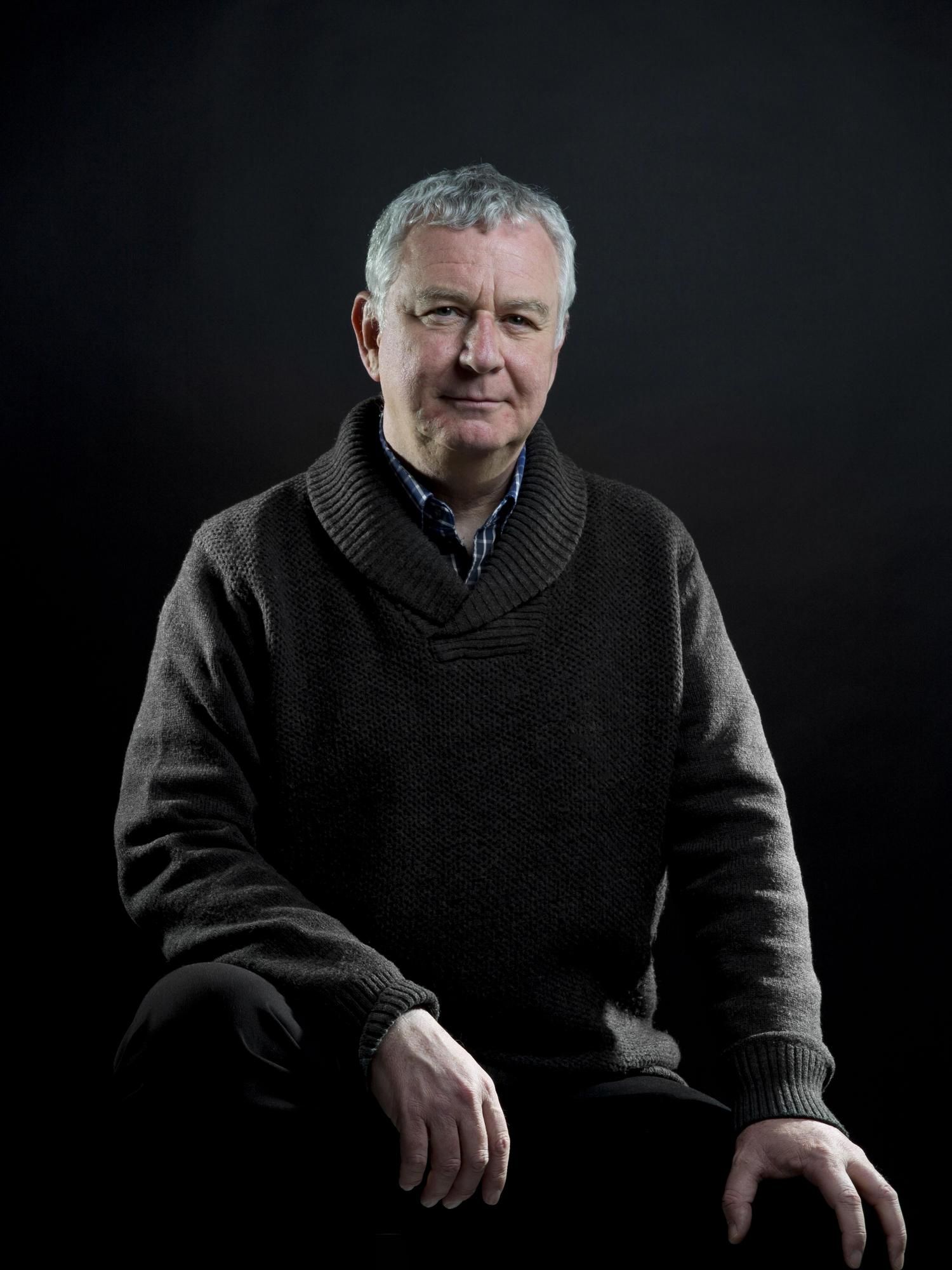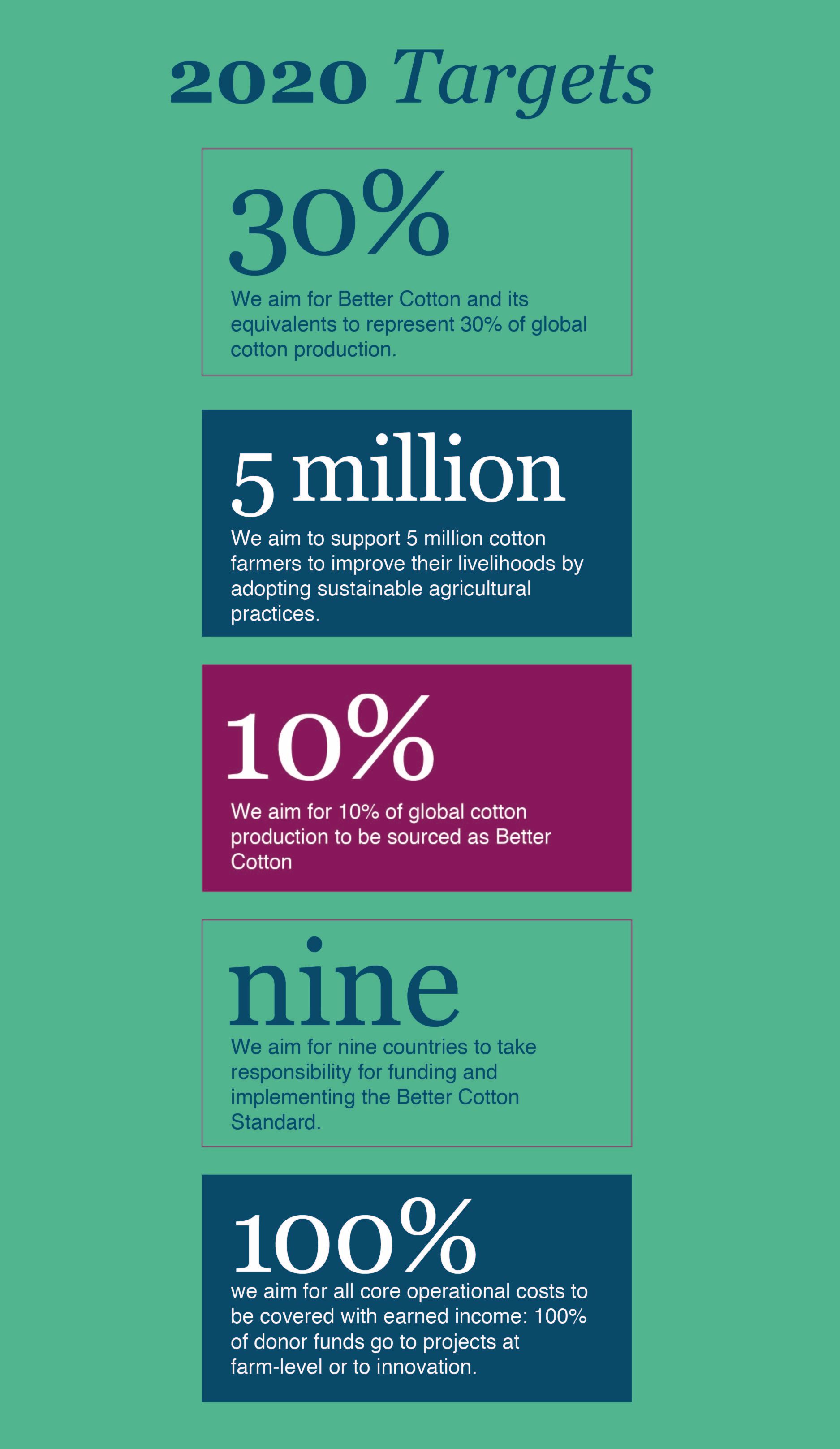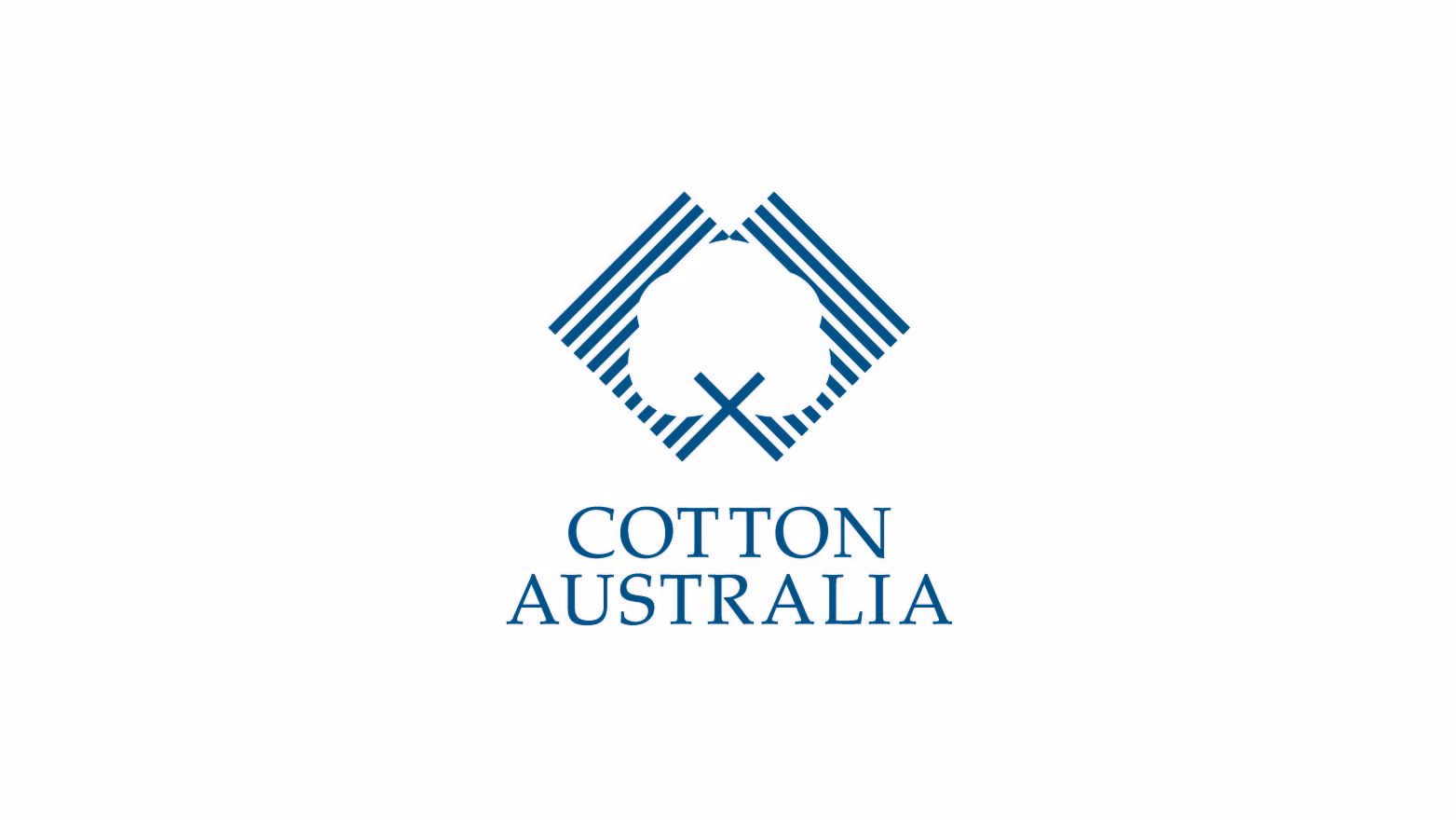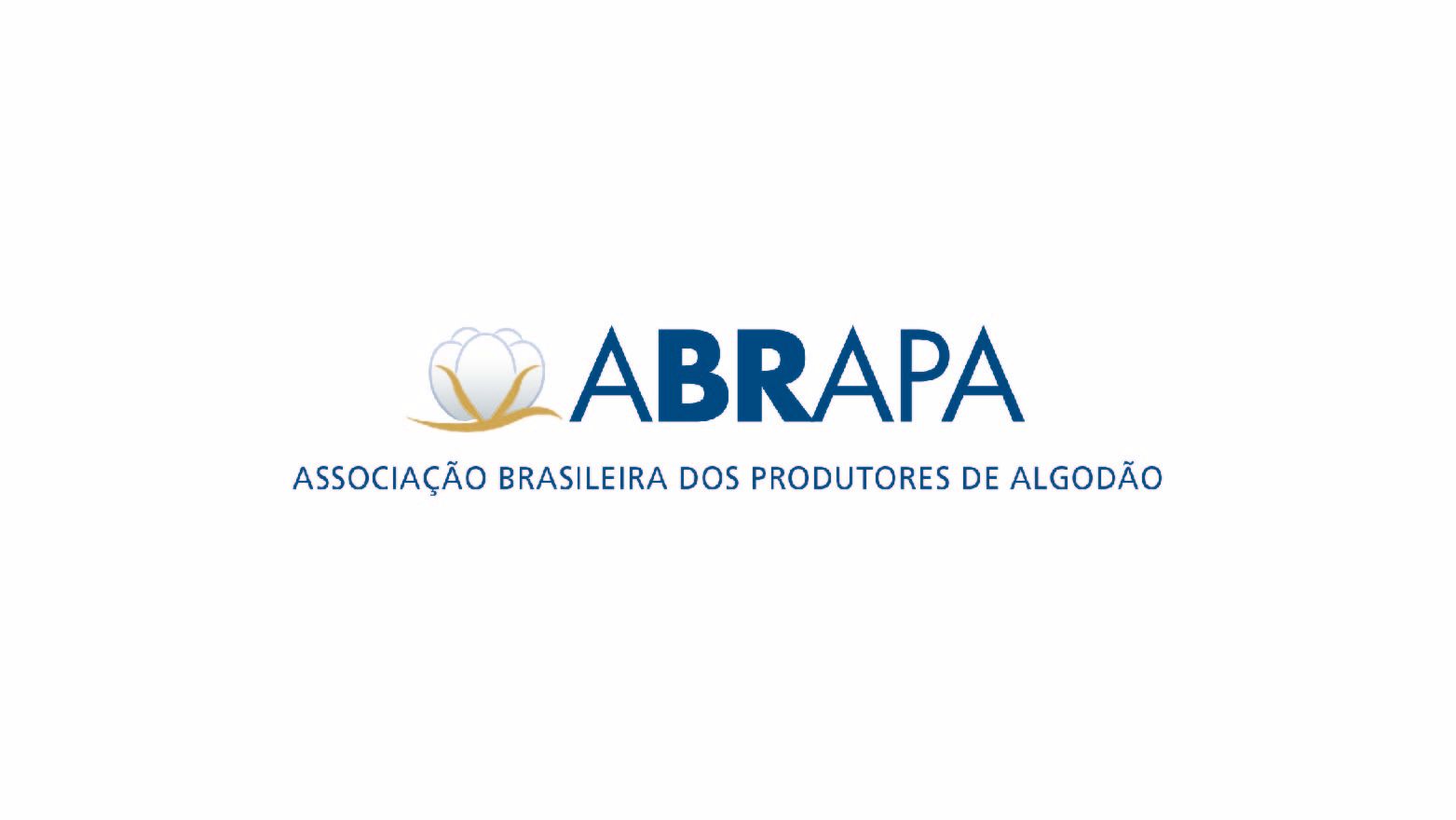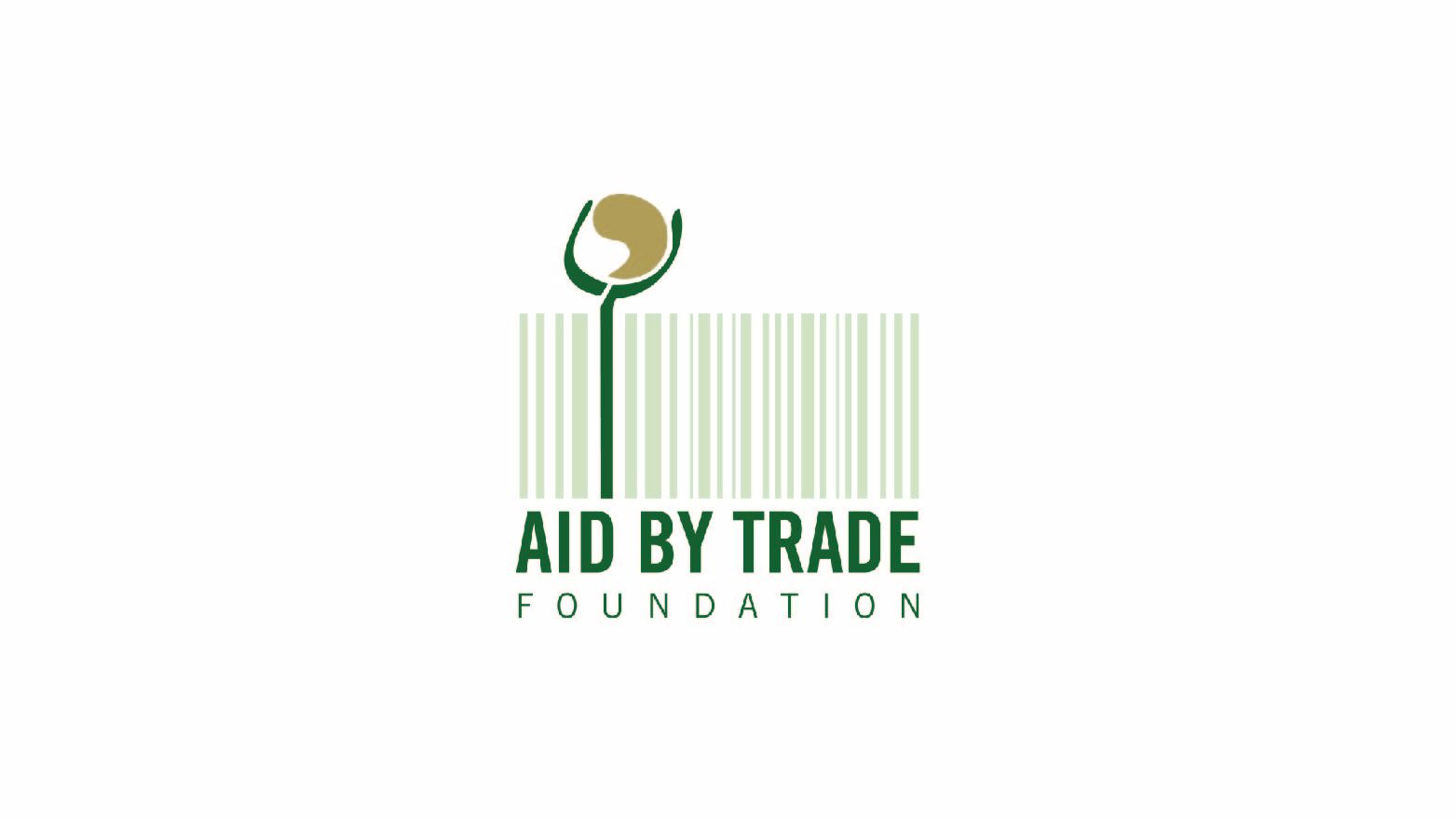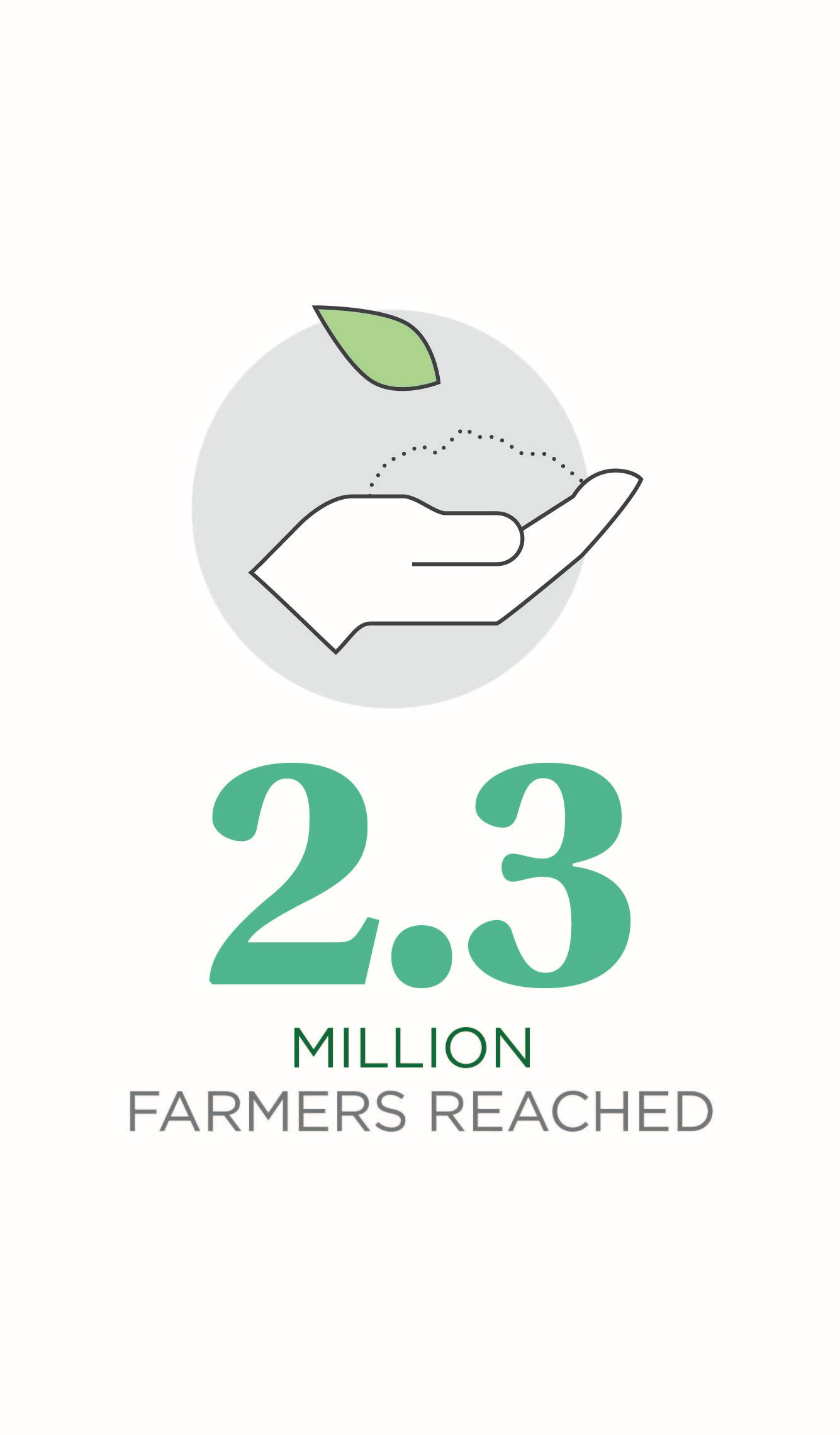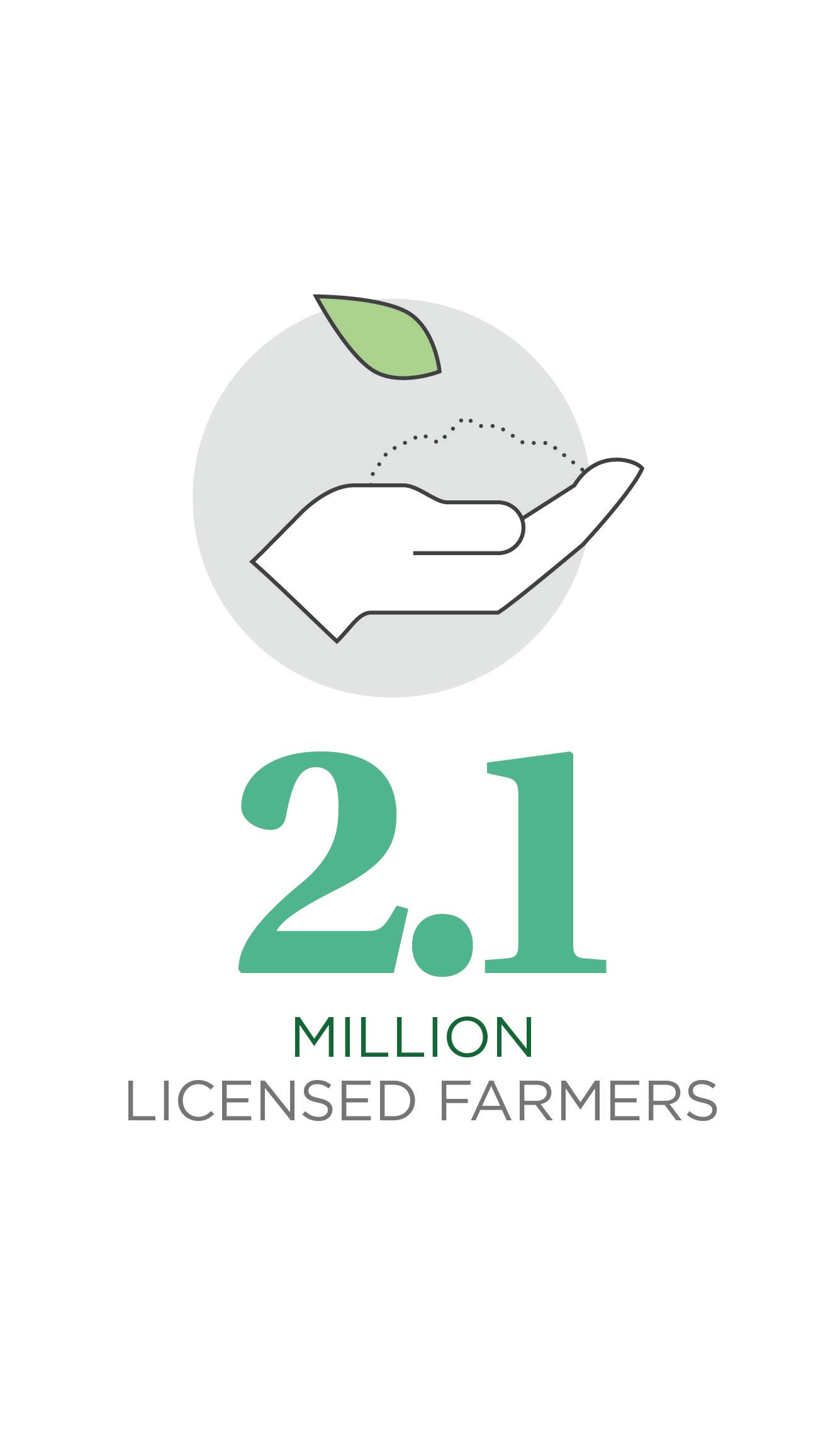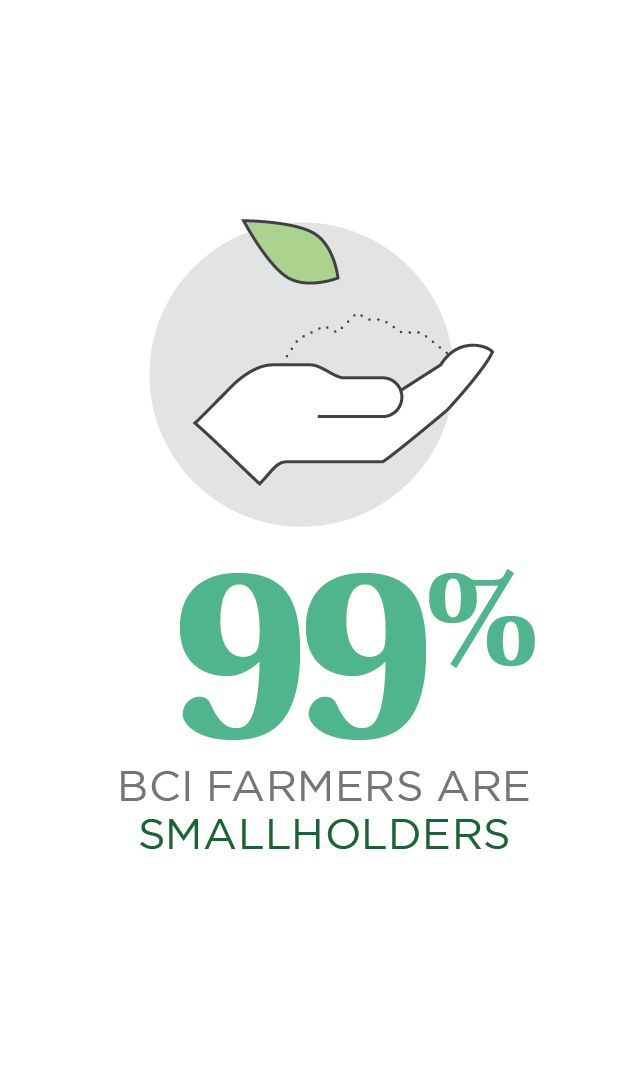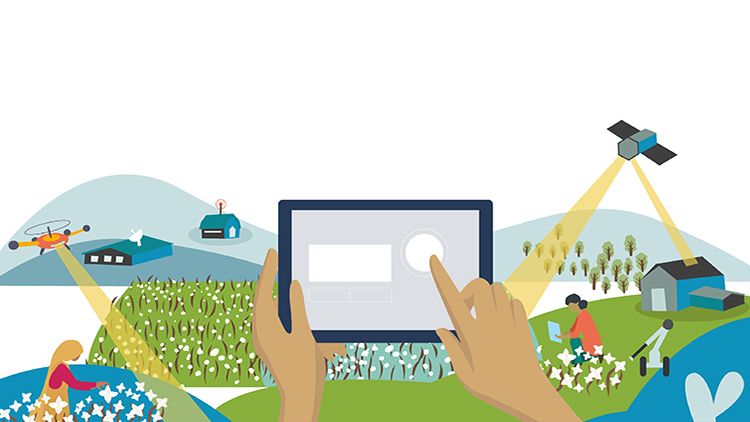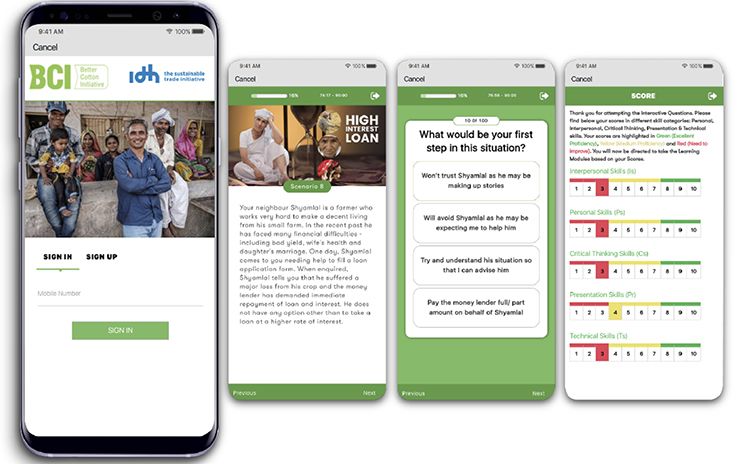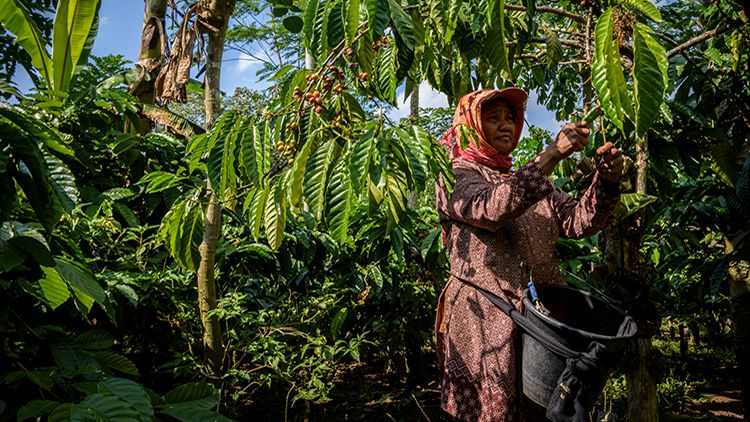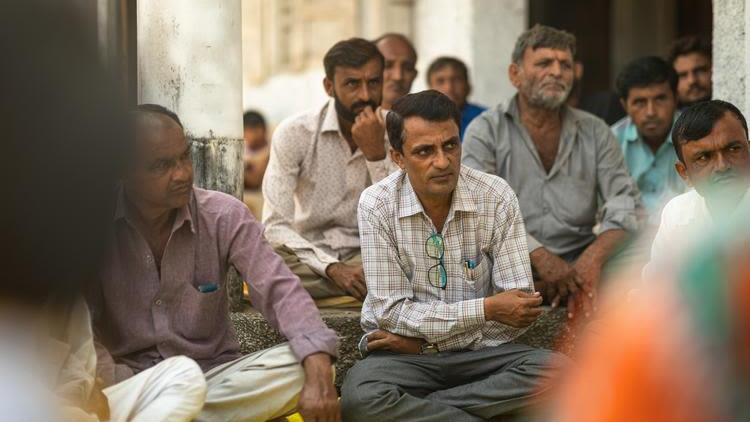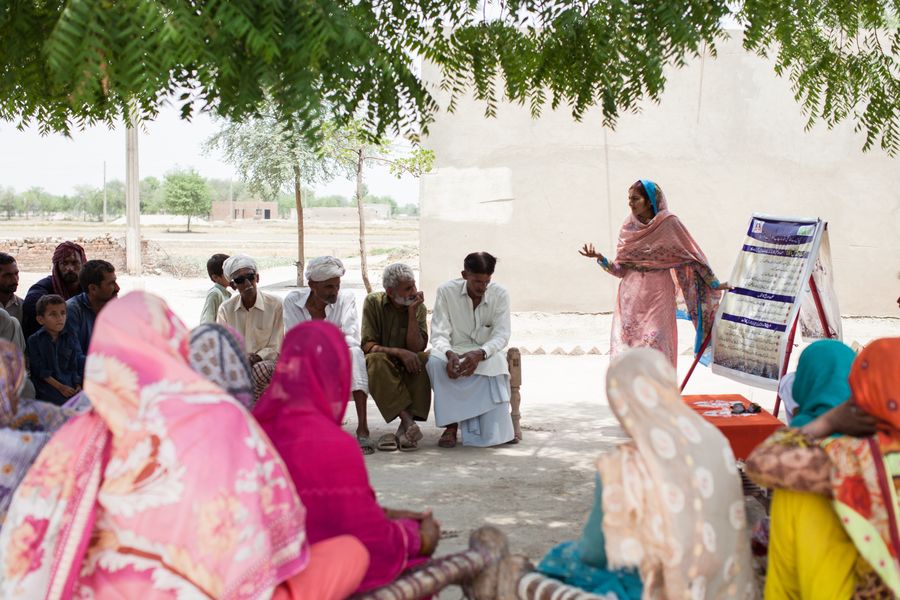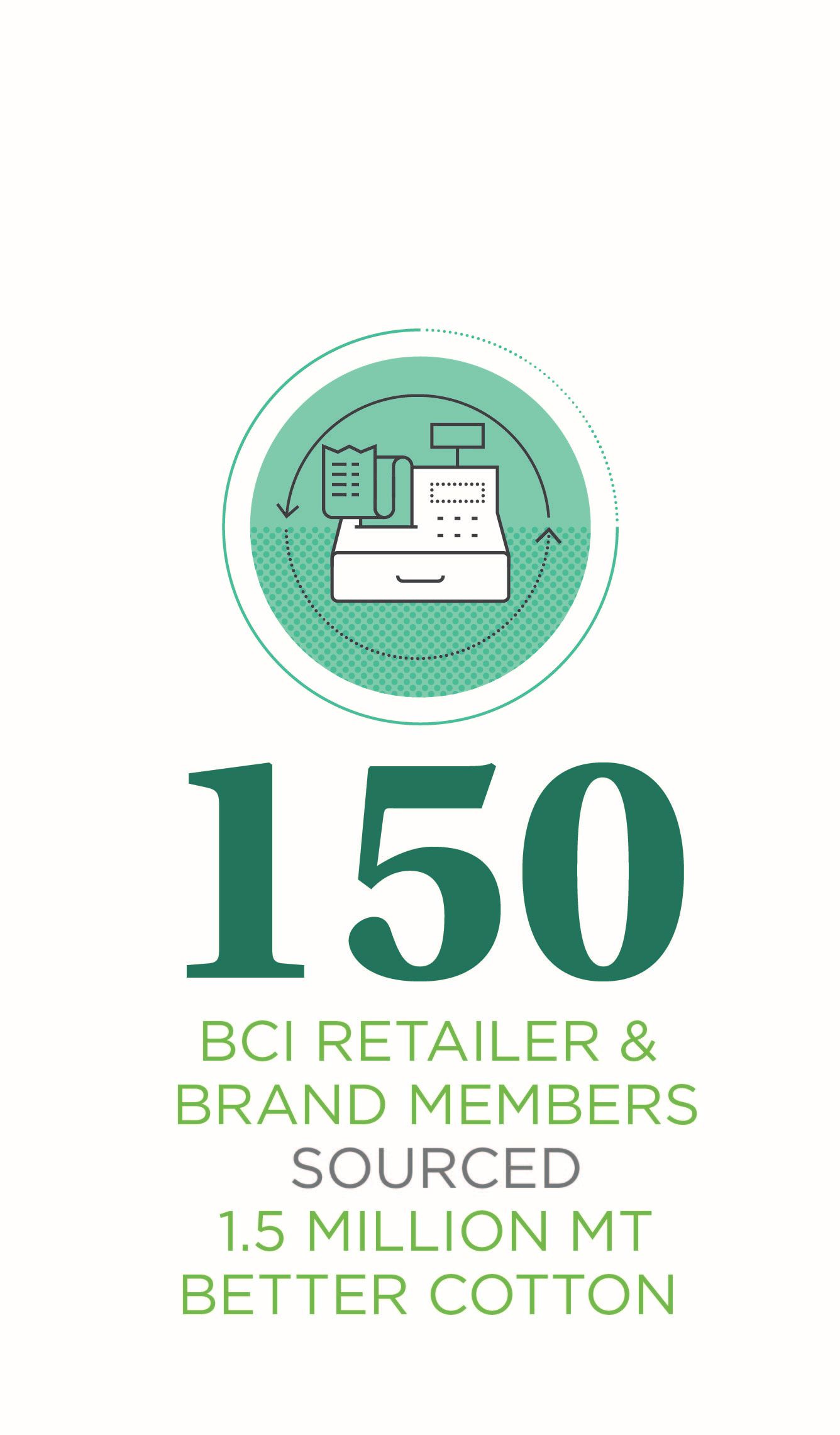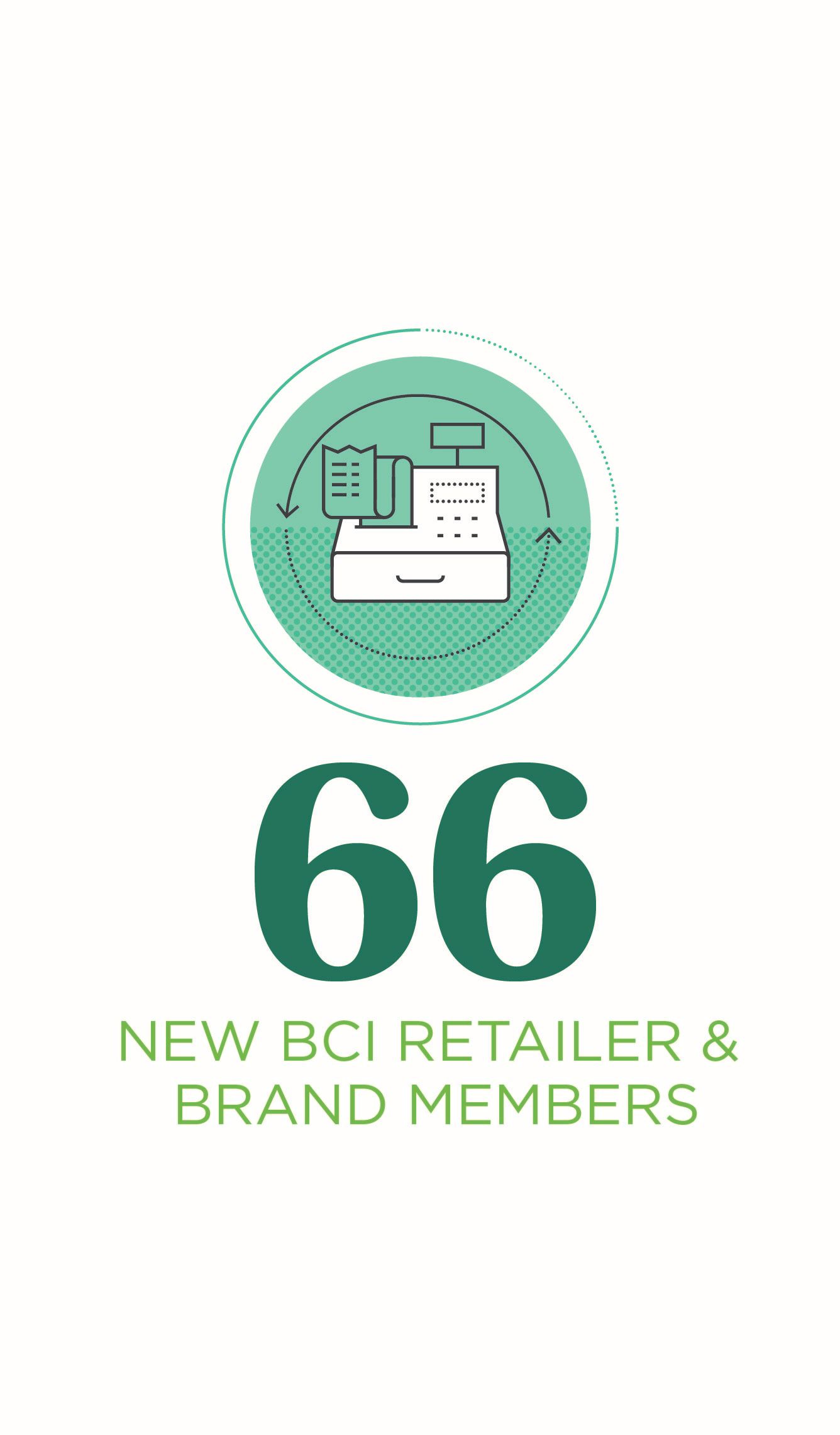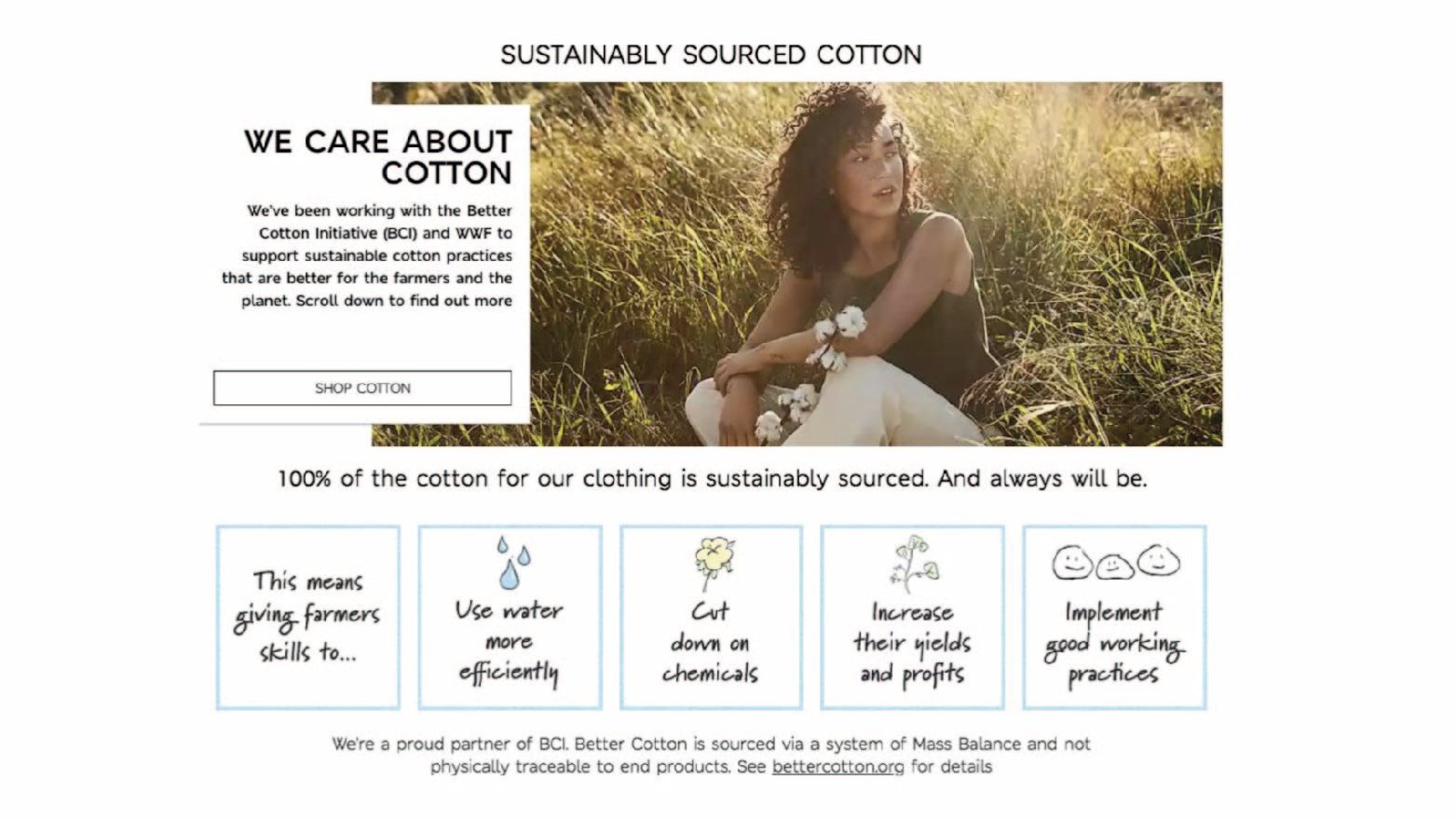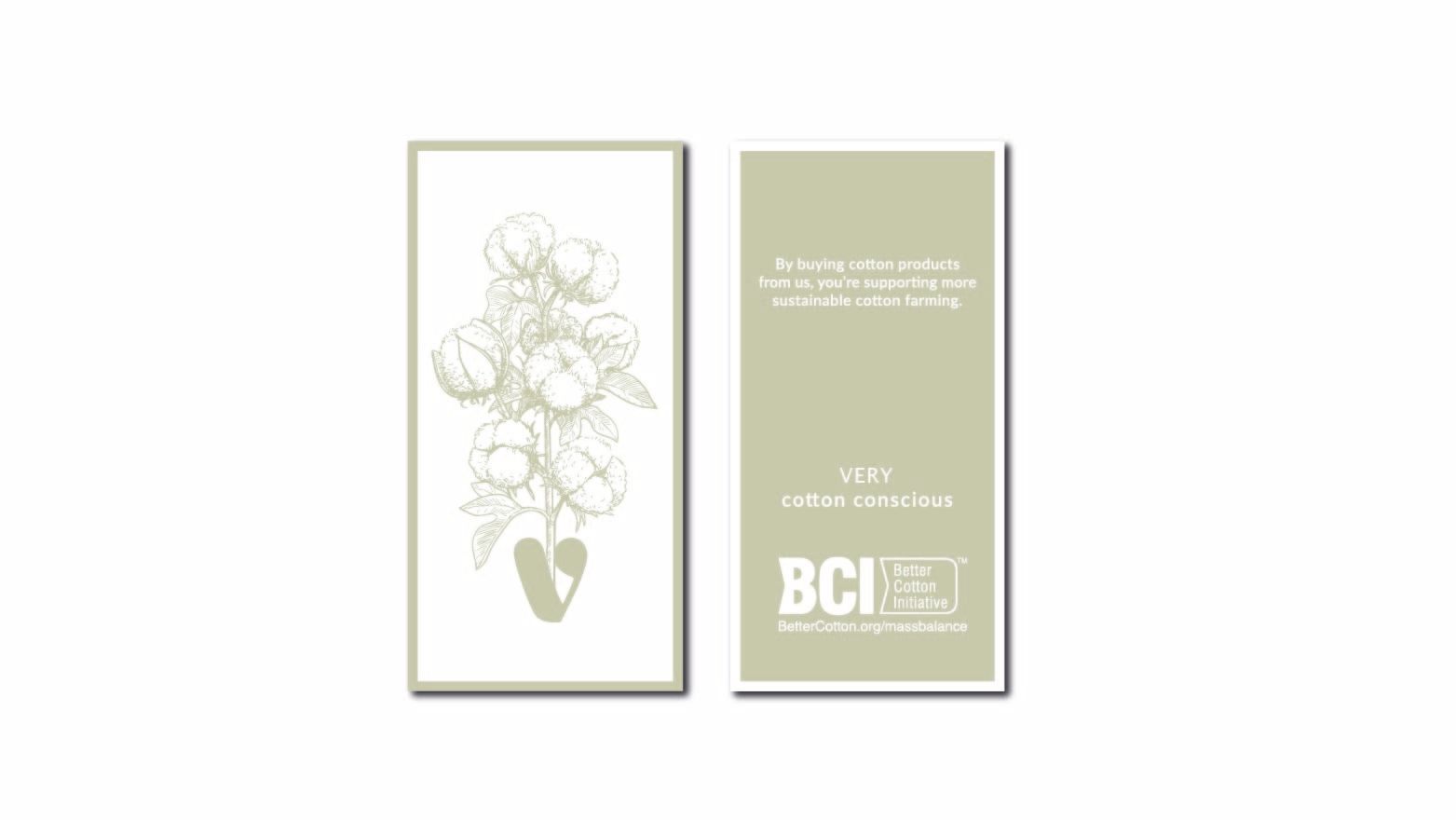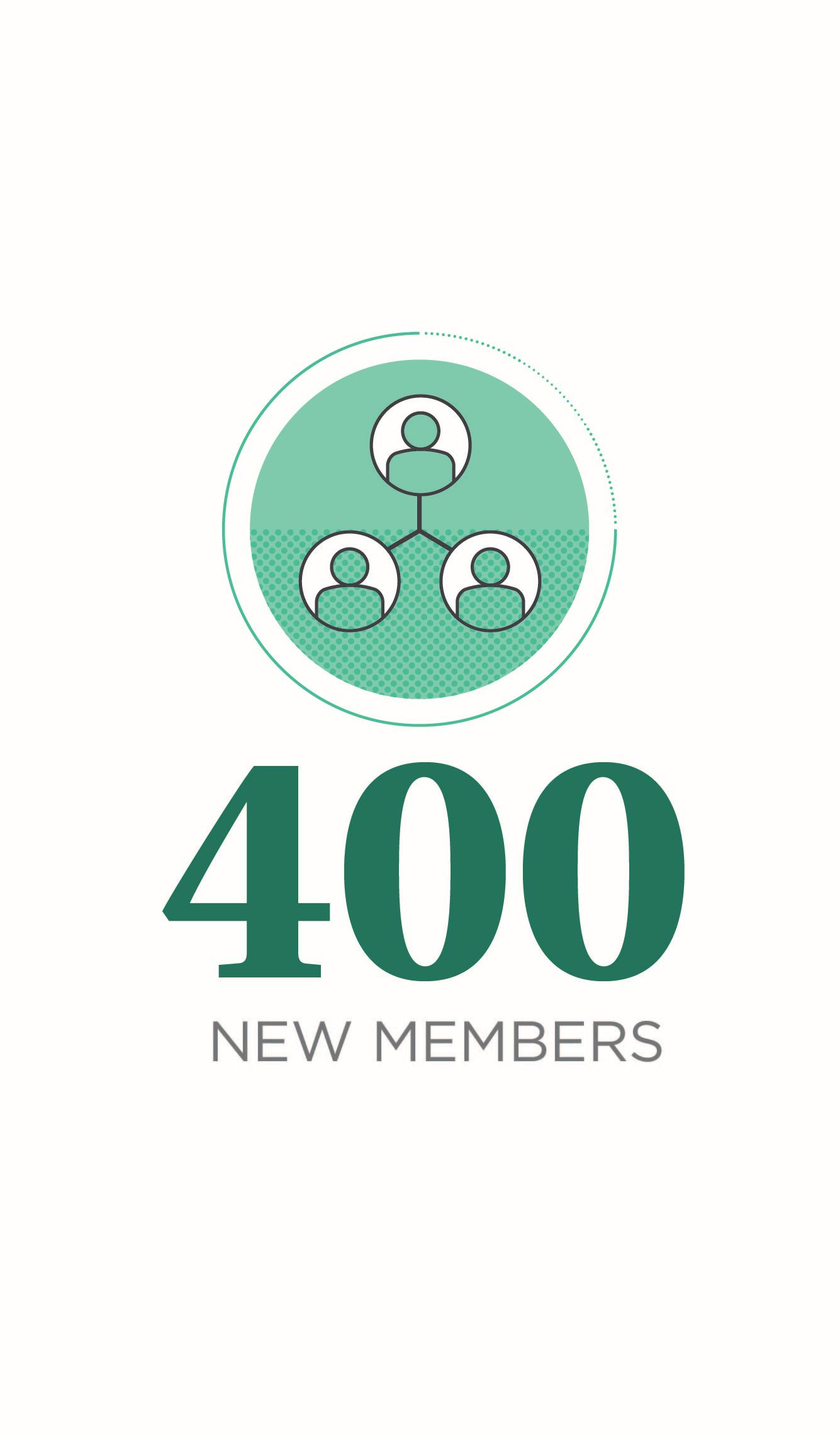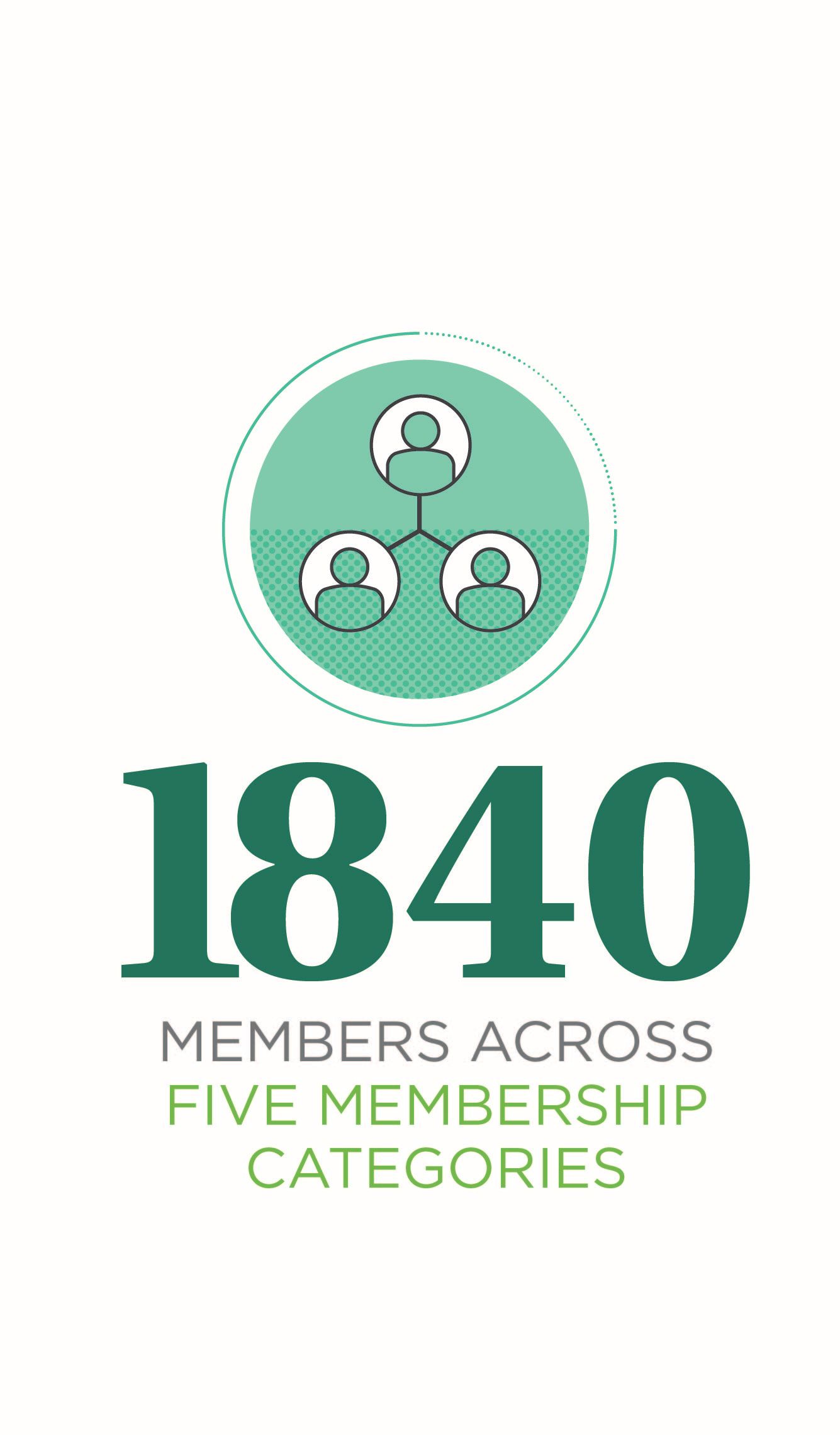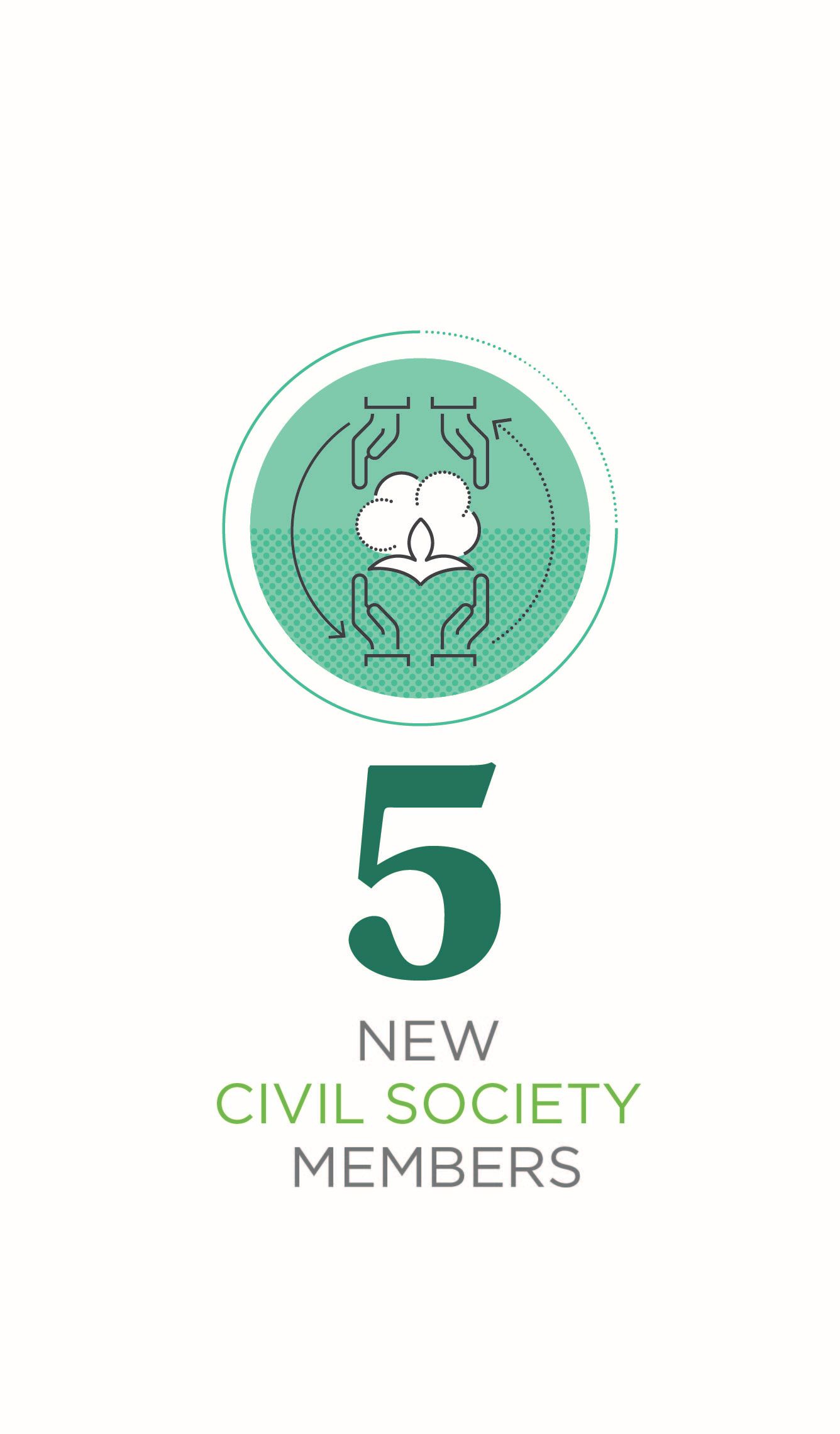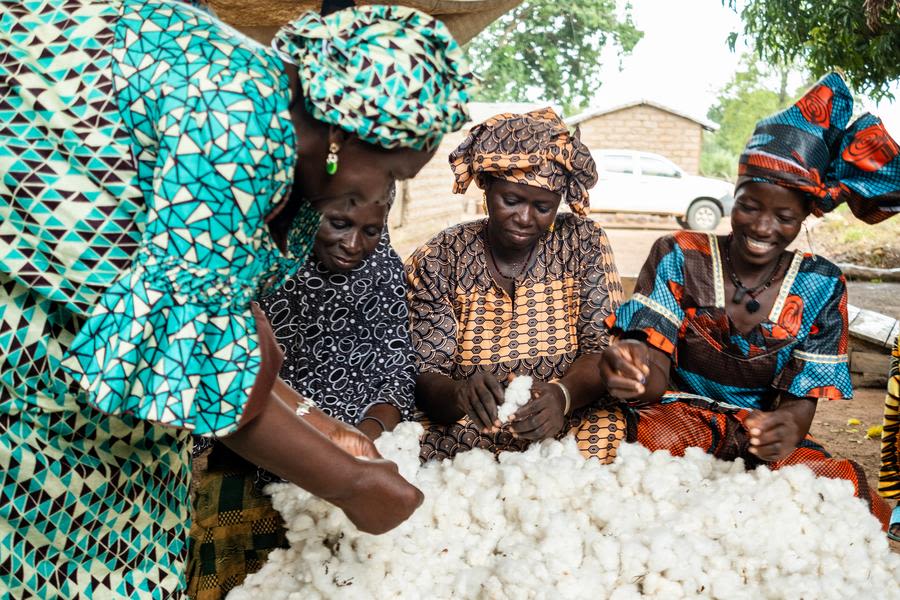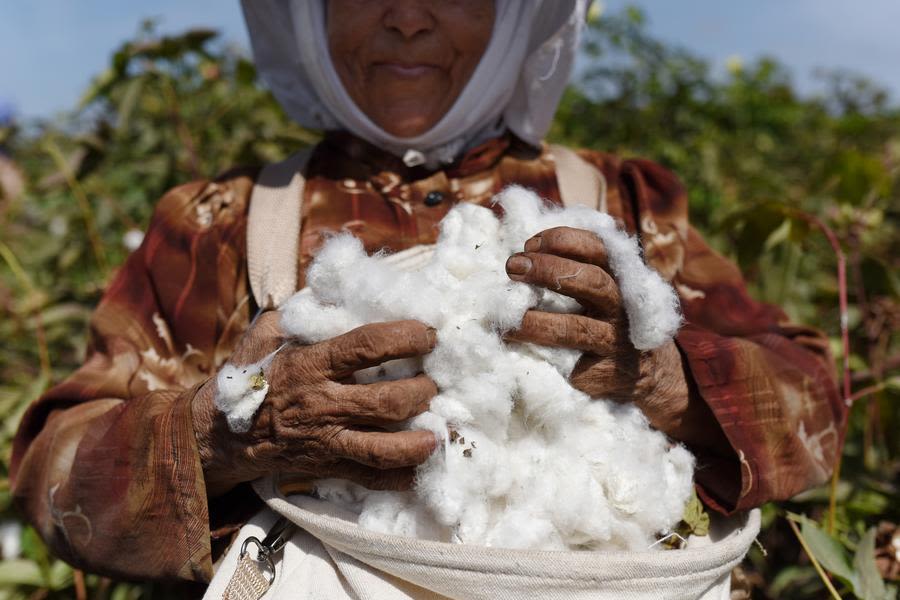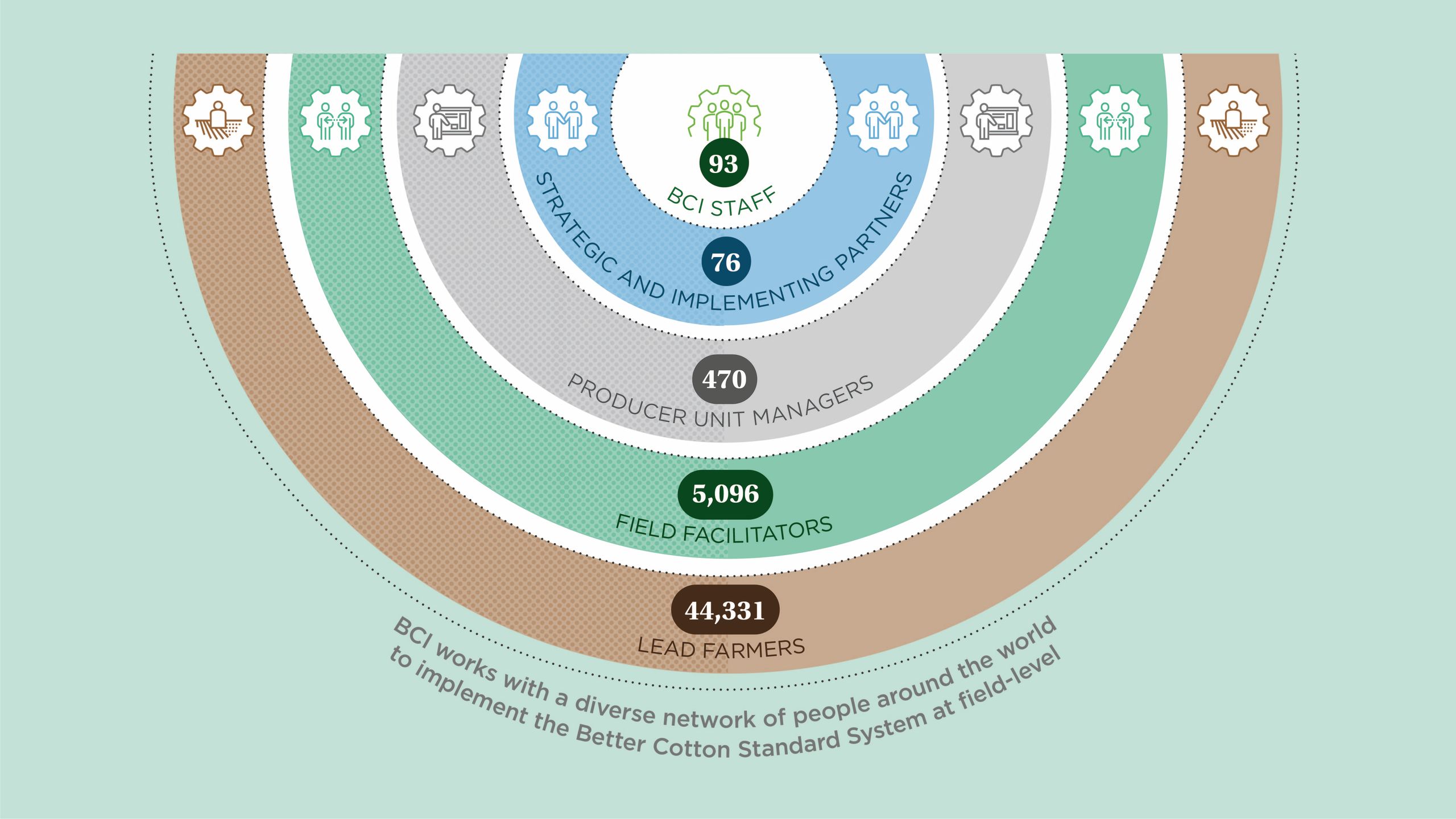Better Cotton Initiative
2019 Annual Report
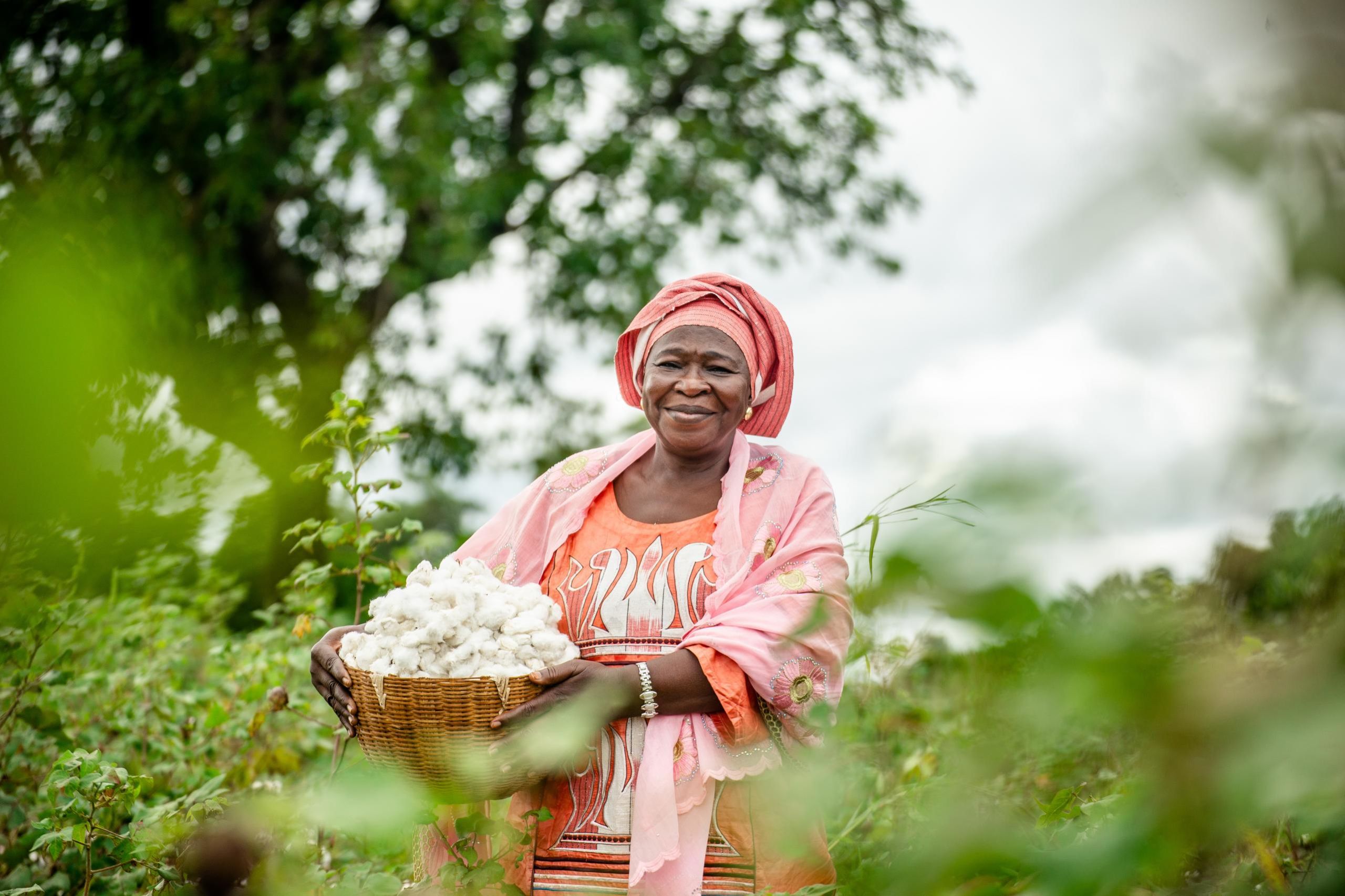
© BCI/Ion Paciu, 2019. Alan McClay, BCI CEO.
© BCI/Ion Paciu, 2019. Alan McClay, BCI CEO.
Message from the CEO
In 2019, we celebrated the Better Cotton Initiative’s (BCI’s) 10-year anniversary. BCI has come a long way since a visionary group of farmers, NGOs and apparel brands first came together to transform the way cotton is grown. In our first decade, we became the world’s largest cotton sustainability programme, supported by an unprecedented 1,842 members. Throughout this time, our activity has focused on improving cotton farmers’ livelihoods and farming practices. In the 2018-19 cotton season (which ran from August 2018 to July 2019), BCI worked with 76 on-the-ground expert partners to deliver training to 2.3 million farmers in 23 countries. Together, licensed BCI Farmers produced 5.6 million tonnes of Better Cotton, or 22% of global cotton production.
More than 400 new organisations joined BCI’s growing network in the past year, and we welcomed new members across our five membership categories: retailers and brands, suppliers and manufacturers, civil society, producer organisations and associate members. Importantly, as businesses step up their focus on sustainable materials and supply chain resilience, demand for more sustainable cotton is rising. BCI Retailer and Brand Members sourced a record 1.5 million tonnes of Better Cotton in 2019 – that is enough cotton to make approximately 1.5 billion pairs of jeans.
It is particularly pleasing to share the progress BCI is making, thanks to the concerted efforts of our members, partners and other stakeholders, towards our 2020 targets. With two more cotton seasons (2019-20 and 2020-21) within which to make further advances at field level, we are committed to not only continuing to deliver beneficial change at field level, but also to learning from the experience and adapting to become more effective. We do not yet know how close we will come to our 2020 targets, and we are still assessing how the current Covid-19 pandemic will impact our efforts. But one thing is certain, we have made significant and undeniable progress over the past 10 years, and there are many successes to celebrate. In summer 2021, we will share the final results that outline where we ended up relative to our 2020 targets. For now, in this report, we will focus on 2019 and the opportunities and challenges we addressed in the field and in the market.
2019 was a year of significant advances on the ground and in the marketplace, amid continued climate disruption and geopolitical instability. Cotton farmers worldwide have persevered in the face of extreme weather and water scarcity, from the irregular rains in Mali, to cyclones in the US cotton belt, to Australia’s multi-year drought. Building farmers’ resilience to climate change is an increasing focus for BCI and our partners and runs throughout our Better Cotton Principles and Criteria. You can read more about BCI’s work on the ground in the farmer stories shared throughout this report.
Forced Labour and discrimination are incompatible with the Better Cotton Standard and unacceptable within BCI Programmes. On a global level, we established a Task Force on Forced Labour and Decent Work to review selected elements of the Better Cotton Standard System and produce recommendations to improve the effectiveness of the system in identifying, preventing, mitigating and remediating forced labour risks.
In 2020, the BCI Council took the decision to suspend BCI assurance and licensing activities in the Xinjiang Uighur Autonomous Region (XUAR) of China effective beginning the 2020-21 season as these activities cannot currently be implemented in a credible manner within the existing operating context. You can read more about this within the report.
Today, in the midst of the global Covid-19 outbreak, our priority is to safeguard the health and wellbeing of all BCI Farmers, on-the-ground partners and staff in line with evolving government and World Health Organization guidance. In addition to immediate, practical steps to protect our people, we and our Implementing Partners are also innovating and adapting training and assurance activities to continue to effectively support farming communities and implement the Better Cotton Standard around the world. We are sharing regular updates on this through our Covid-19 website hub and Covid-19 and the Cotton Sector blog series.
We now stand on the threshold of a new decade of action. We have consulted extensively among BCI Members, Partners and stakeholders to develop our 2030 strategy, reflect on our journey to date and focus our efforts on strengthening and deepening the impact of BCI Programmes around the world. We shall present the 2030 BCI strategy in the last quarter of 2020. Delivering positive change at farm level will remain our core focus, while we continue to scale our efforts to ensure more sustainable cotton becomes the norm.
I’d like to take this opportunity to convey my sincere thanks to all our supporters and stakeholders, without whom BCI’s progress would not be possible.
I hope you enjoy this report and welcome your thoughts and feedback.
Alan McClay
The Better Cotton Initiative exists to make global cotton production better for the people who produce it, the environment it grows in and the sector's future.
2019 Highlights:
What You Need to Know
- Better Cotton was grown in 23 countries.
- Licensed BCI Farmers produced 5.6 million metric tonnes of Better Cotton. That is enough cotton to make approximately 8 billion pairs of jeans, a pair each for every person in the world.
- Better Cotton now accounts for 22% of global cotton production.
- BCI and its 76 field-level partners delivered training and support to a total of 2.3 million farmers.
- 2.1 million cotton farmers received a BCI license to sell their cotton as Better Cotton – 99% are smallholders farming on less than 20 hectares.
- BCI Retailer and Brand Members sourced 1.5 million metric tonnes of cotton as Better Cotton in 2019.
- Uptake of Better Cotton accounted for 6% of global cotton production.
- BCI welcomed more than 400 new members in 2019.
Final Reporting Periods for 2020 Targets
Back in 2012, the BCI Council laid down a formidable challenge to all BCI Members, Partners, stakeholders and staff, announcing five ambitious targets for 2020 and asking us to demonstrate that multiple stakeholders — working together — can shift a global system so that sustainability becomes mainstream.
At the end of 2020, BCI will take stock on its efforts towards achieving the five targets, and we will share our results in summer 2021. With two more cotton seasons to go (2019-2020 and 2020-21), we remain hopeful that we can get close to reaching them.
- Target One (End of reporting period: 2020-21 cotton season data*)
Better Cotton and its equivalents will represent 30% of global cotton production. - Target Two (End of reporting period: 2020-21 cotton season data*)
BCI will aim to support five million cotton farmers to improve their livelihoods through the adoption of sustainable practices. - Target Three (End of reporting period: 2020 calendar year uptake data)
10% of all cotton produced globally will be sourced as Better Cotton. - Target Four (End of reporting period: 2020 calendar year data)
Nine countries will take direct responsibility for funding and implementing the Better Cotton Standard. - Target Five (End of reporting period: 2020 calendar year financial data)
BCI will cover 100% of its core operational costs with earned income.
*Targets one and two align with the International Cotton Season (as defined by ICAC) which runs from August to July. In the 2020-21 cotton season, most of BCI’s field-level interventions (capacity building and assurance activities) take place in 2020. Therefore, the 2020-21 cotton season data will be included in our final reporting for targets one and two.
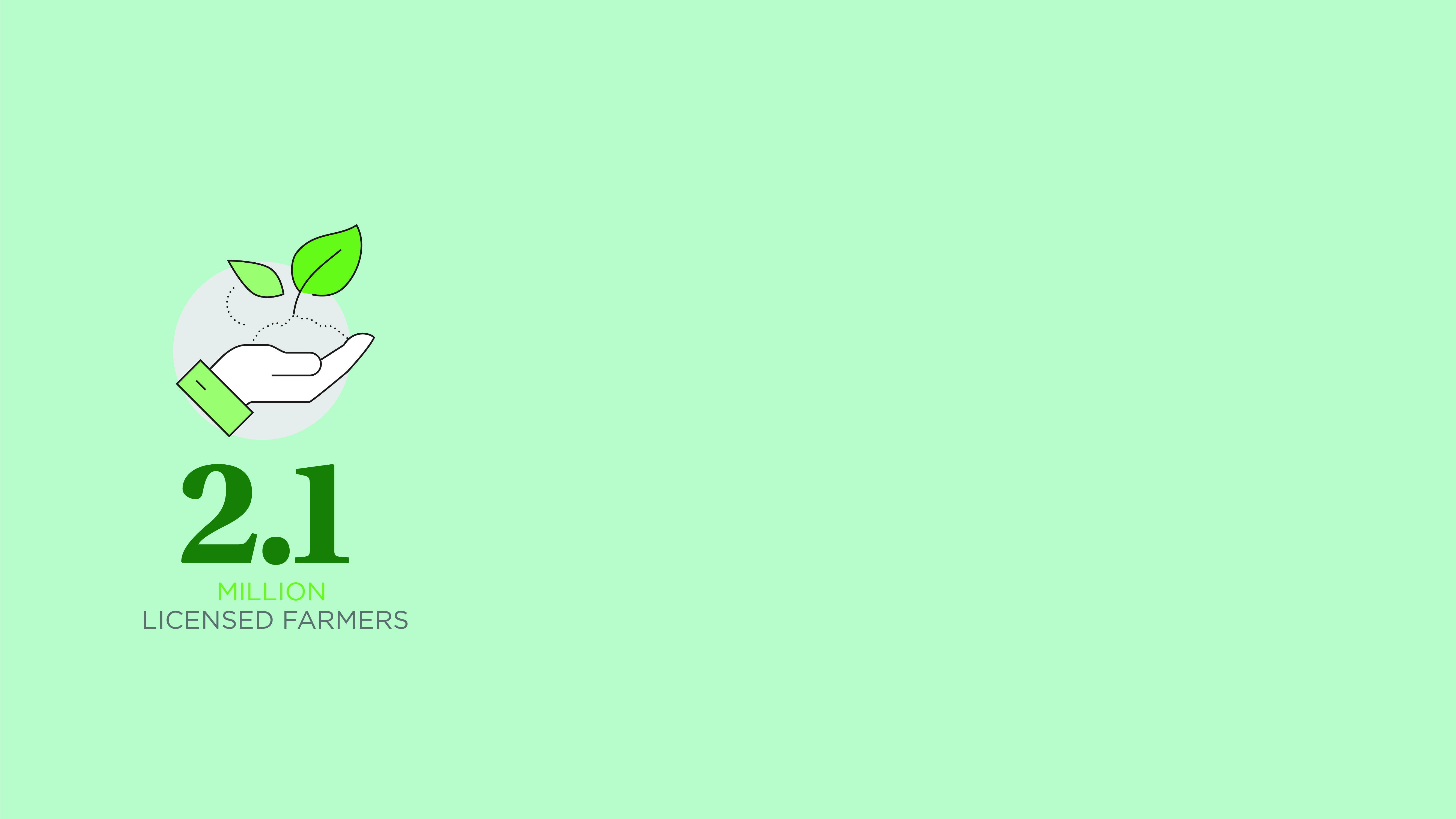

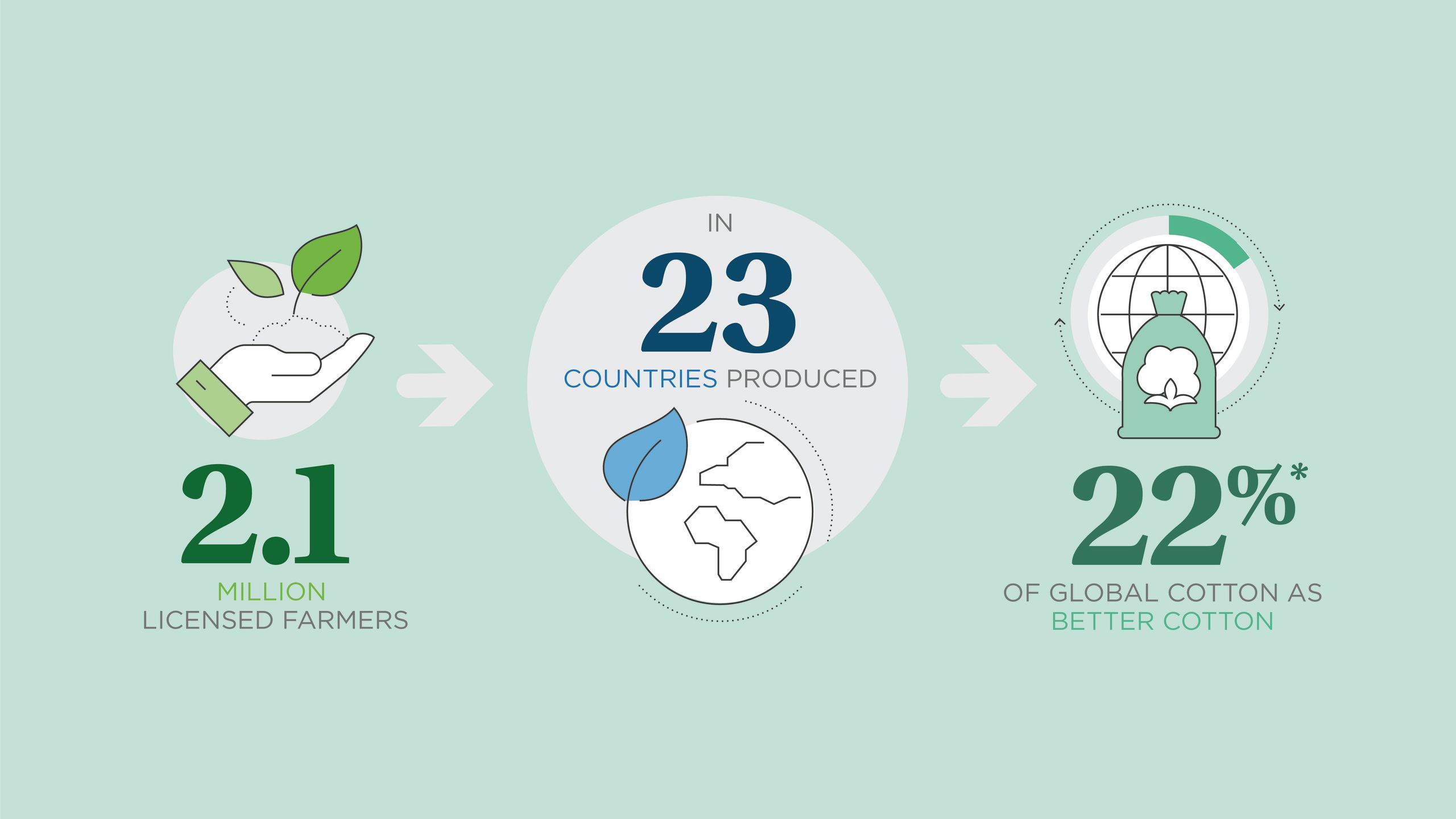
BCI Global Reach
2018-2019 Cotton Season
Target One:
By 2020, we aim for Better Cotton and its equivalents to represent 30% of global cotton production.
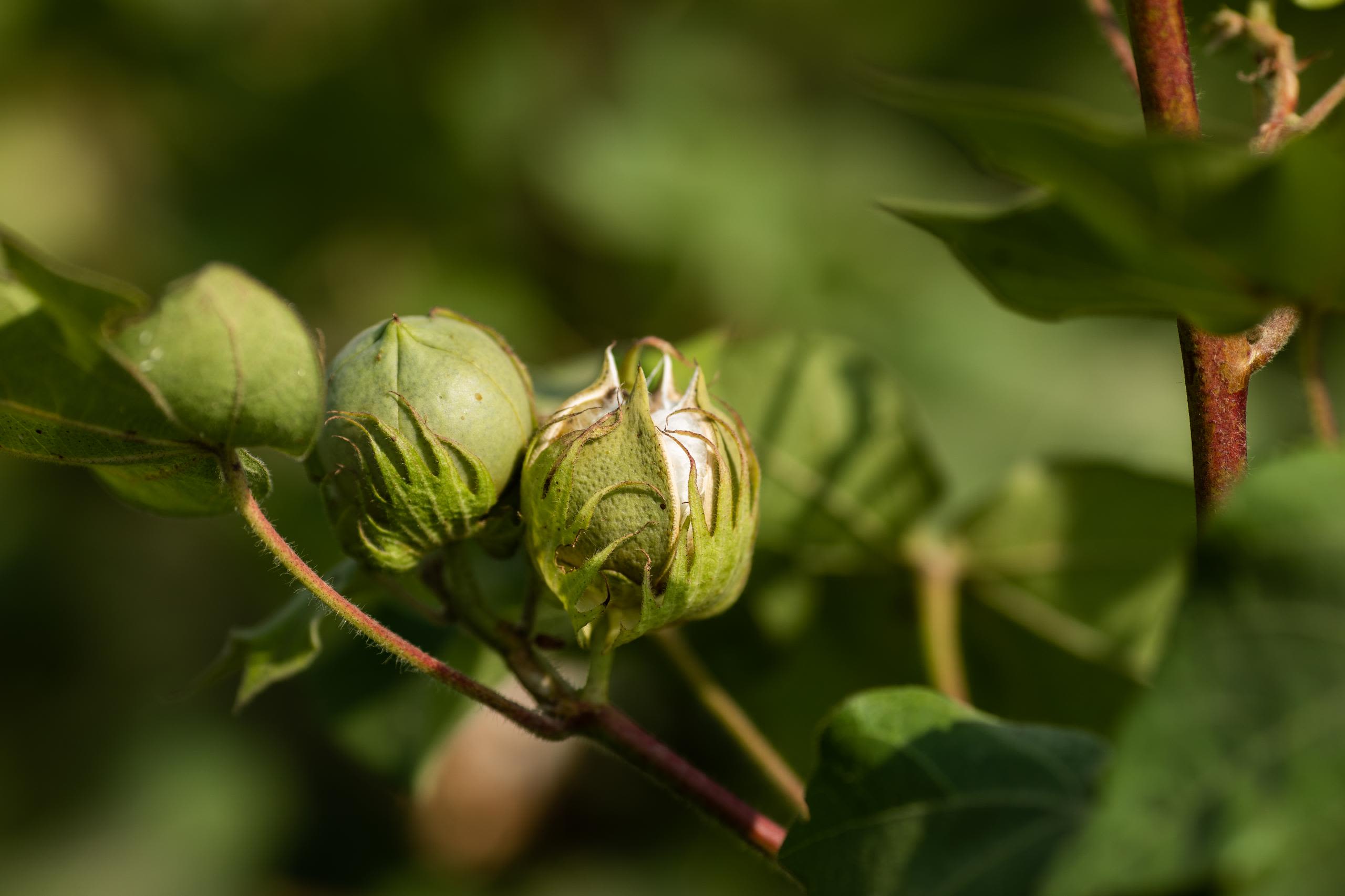
What Do We Want to Achieve
Cotton is used by nearly everyone across the world on a daily basis. Cotton production alone supports the livelihoods of more than 250 million people. Cotton is a natural and versatile fibre; it grows well in difficult environments and it is fully renewable. Yet the future of cotton is vulnerable to challenges including climate change, gender inequality, labour shortages, water scarcity and pest pressure. Today, less than 25% of cotton is grown in a way that actively protects people and the environment. BCI is striving to transform cotton production from the ground up. We want cotton farmers to become more resilient to unpredictable climate conditions and be able to make a decent living from farming by producing Better Cotton – better for farmers, the environment and the sector’s future. To achieve meaningful impact, this means reaching the farmers who need the most support, helping them to access vital training, inputs, services and finance, and building their capacity to adopt sustainable agricultural practices. Meanwhile, we work closely with BCI Members and Partners to make Better Cotton a practical reality for the cotton sector. We want Better Cotton to become a mainstream, sustainable commodity, representing 30% of global production by the end of 2020.
Hear from a cotton farming community in Gujarat, India, about their journey towards sustainable agricultural practices and the impact this had on the community.
Hear from a cotton farming community in Gujarat, India, about their journey towards sustainable agricultural practices and the impact this had on the community.
It all began back in 2012, when a group of us BCI Farmers in Kanakya village set up a committee to help other farmers in our community use pesticides and fertilisers more efficiently. We wanted to promote plant-based natural alternatives, but they weren’t readily available locally, so we had to find a way to make it easier for farmers to gain access to these products at reasonable prices. And we also had to convince them to change their ways by showing them the results in the field.
Where Are We Now
In the 2018-19 cotton season, production of Better Cotton — the cotton produced by licensed BCI Farmers — reached 5.6 million tonnes (5,627,700), representing approximately 22% of global cotton production. That is enough cotton to make approximately 8 billion pairs of jeans. We are proud that the efforts of BCI Farmers, Members, Partners and donors over the past decade have resulted in almost one quarter of the world’s cotton being grown as Better Cotton.
Better Cotton is grown in a way that protects and restores the environment, while also improving farmers’ livelihoods. BCI Farmers receive training on the Better Cotton Principles and Criteria. This includes how to use water more efficiently and consider water use in the context of local water resources, using land responsibly and conserving biodiversity, caring for soil health and lowering the impact of conventional crop protection practices (replacing them, where possible, with sustainable alternatives), preserving fibre quality and promoting Decent Work – work that offers fair pay, security and equal opportunities for learning and progression, in an environment where people feel safe, respected, and able to express their concerns or negotiate better conditions.
By adhering to these principles, farmers produce cotton in a way that is measurably better for the environment and farming communities.
Better Cotton was grown in 23 countries in the 2018-19 cotton season.
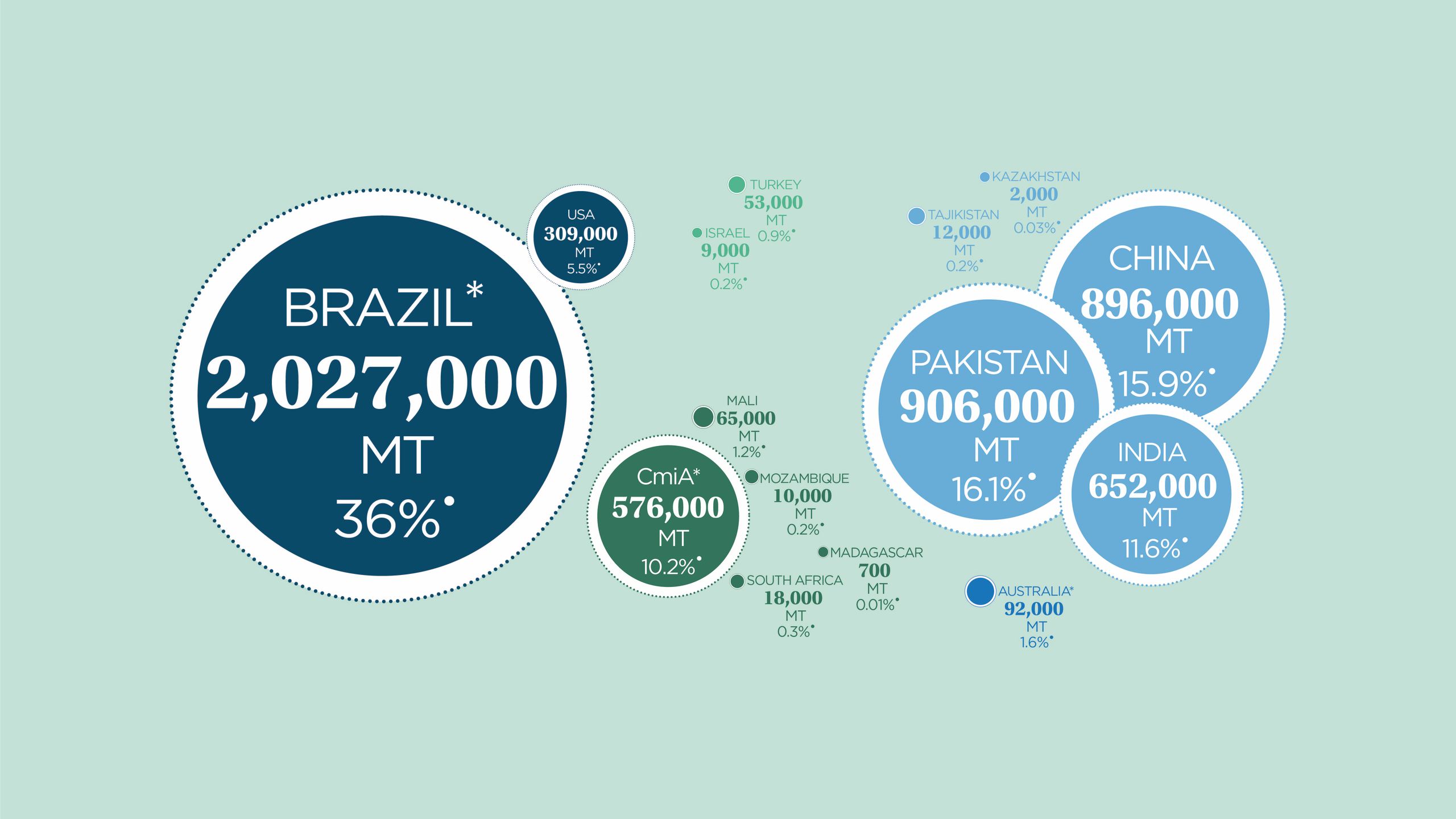
Volumes of Better Cotton Grown
2018-19 Cotton Season
Better Cotton Standard Countries vs. Equivalent Standard Countries
In many countries, the Better Cotton Standard System is directly implemented by BCI’s on-the-ground Implementing Partners. These are Better Cotton Standard Countries.
However, some countries have their own robust sustainable cotton standards in place. To date, three of these standards have been benchmarked against the Better Cotton Standard and identified as equivalent. Farmers growing cotton in line with the following standards can also sell their cotton as Better Cotton: myBMP in Australia, managed by Cotton Australia; ABR in Brazil, managed by Associação Brasileira dos Produtores de Algodão (ABRAPA); and Cotton Made in Africa (CmiA or SCS) in multiple African countries, managed by Aid by Trade Foundation (AbTF). These are Equivalent Standard Countries.
By comparing (or benchmarking) other sustainable cotton standards with the Better Cotton Standard, we and our partners are able to advance more effectively towards promoting sustainability in the cotton sector and ensuring that more sustainable cotton becomes the norm around the world.
Better Cotton Standard Countries (12): China, India, Israel, Kazakhstan, Mali, Pakistan, Tajikistan, Turkey, the US, Madagascar, Mozambique and South Africa.
Equivalent Standard Countries (12): Australia (myBMP cotton standard), Brazil (ABR cotton standard), Benin, Burkina Faso, Cameroon, Cote d'Ivoire, Ghana, Mozambique,* Nigeria, Tanzania, Uganda and Zambia (CmiA cotton standard).
* Mozambique is not counted twice.
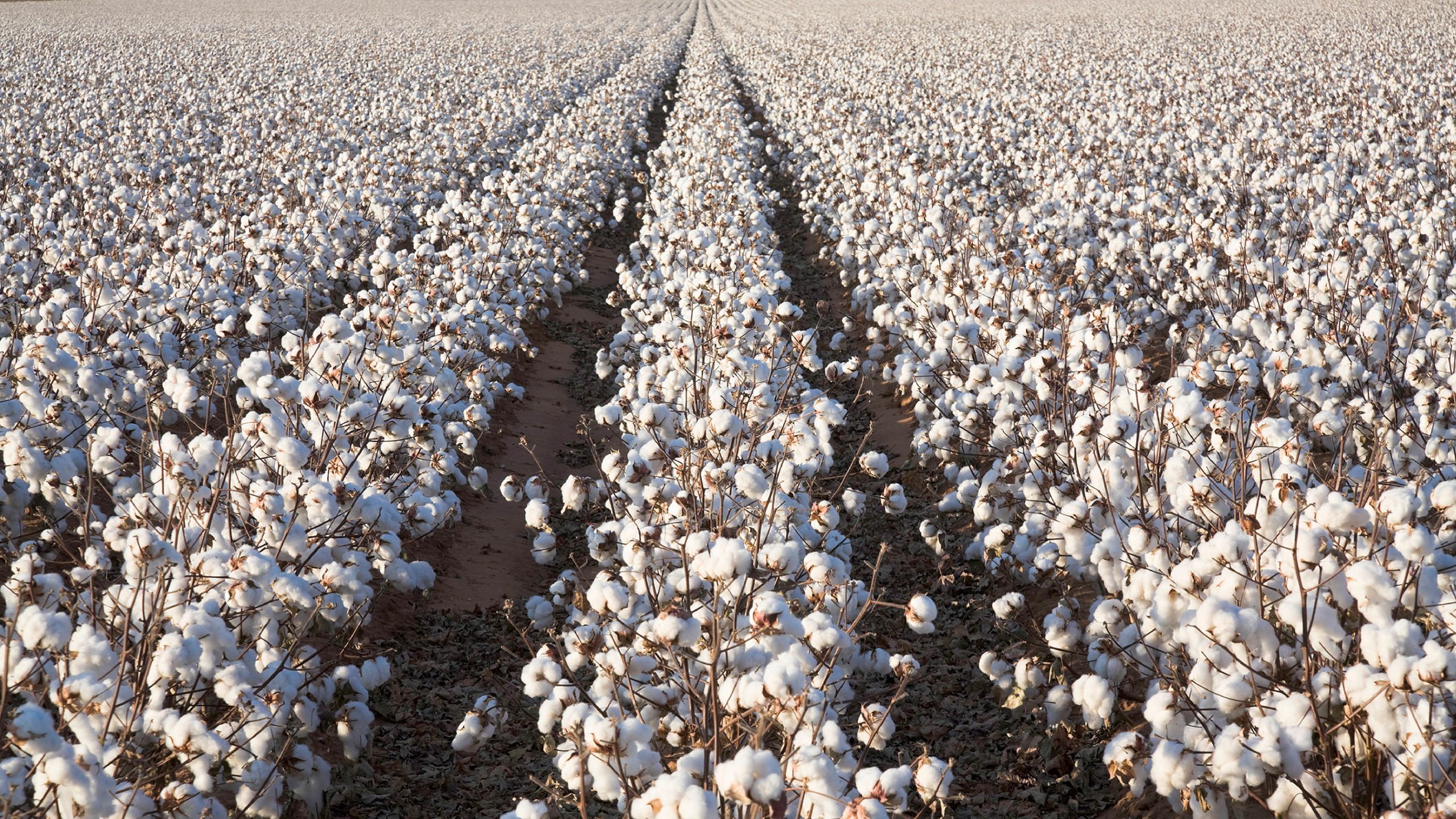
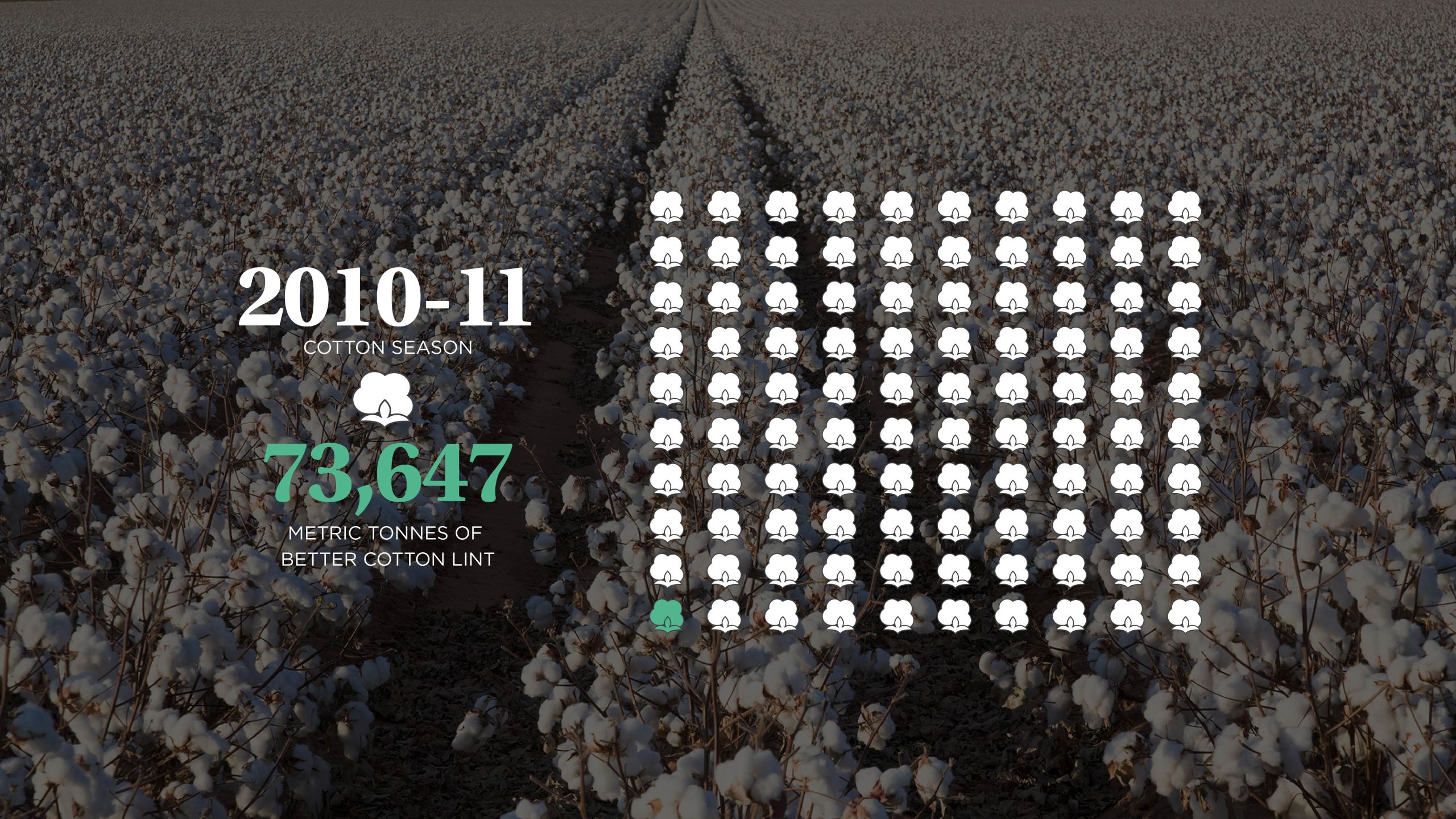
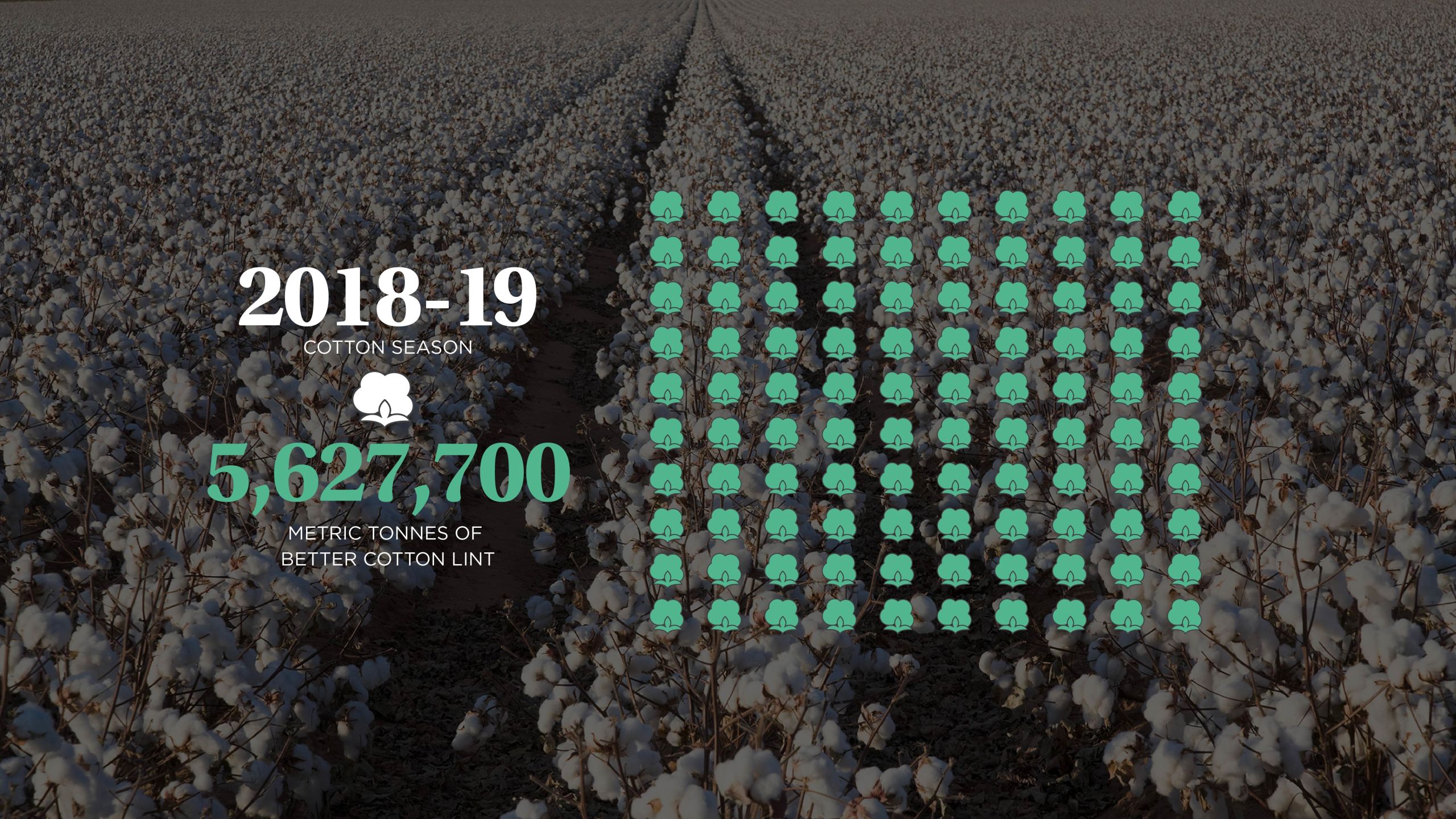
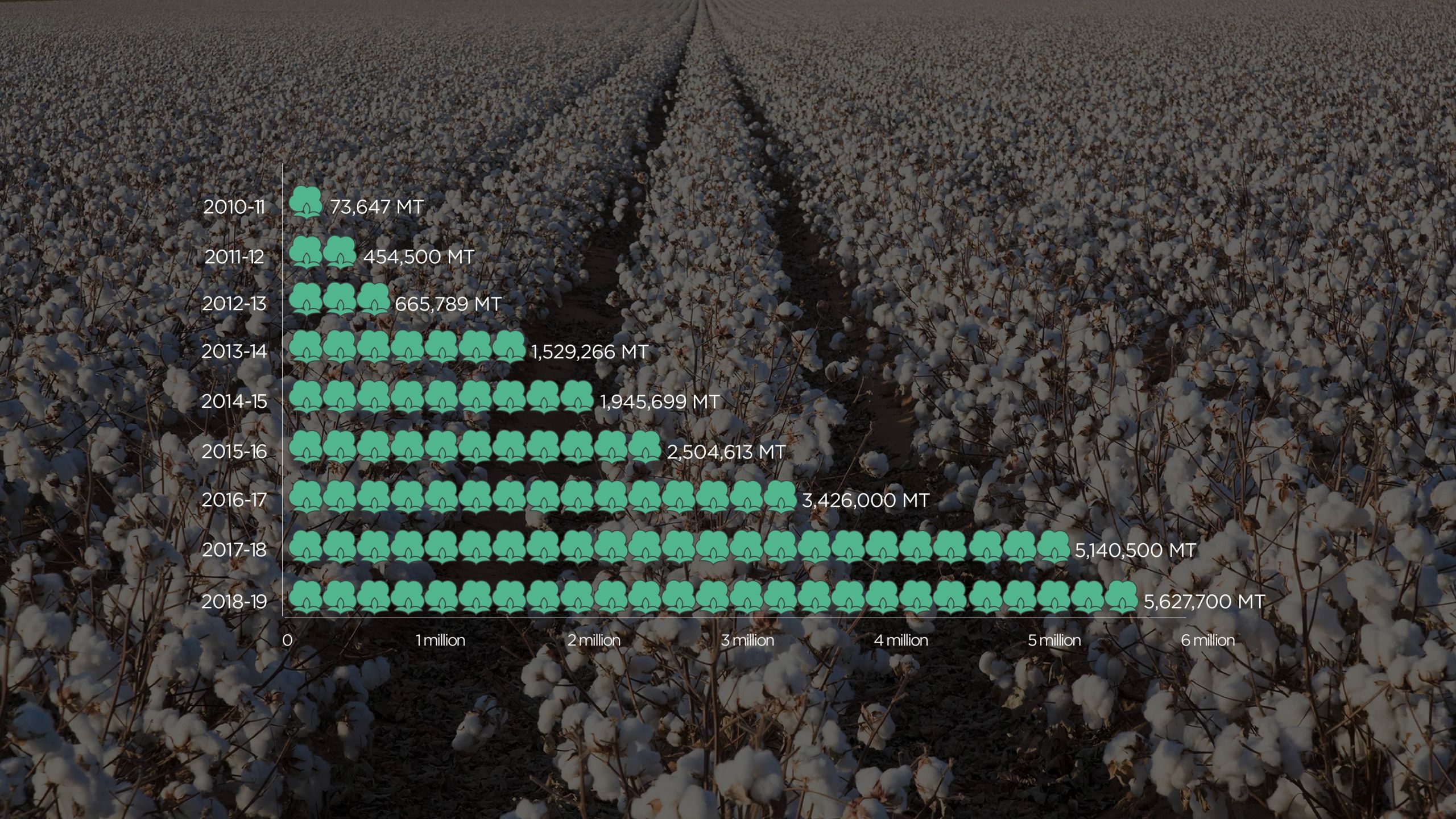
Volumes of Better Cotton Grown
2010-11 – 2018-19 Seasons
Volumes of Better Cotton Grown 2010-11 – 2018-19 Seasons
Better Cotton Country Snapshots
Did you know that Brazil produced the largest volumes of Better Cotton in the 2018-19 cotton season and that India had the greatest number of licensed BCI Farmers? In our new Country Snapshots, we dive into each country where Better Cotton is grown and explore the successes, challenges and key changes that occurred in the 2018-19 cotton season.
Explore the Better Cotton Country Snapshots.
We joined the ABR and BCI programmes in 2013 as we wanted to be 100% aligned with the social, environmental and economic best practices championed by the two Standards. Over the years we have increased our operational efficiency; focused on continuously improving our processes from soil preparation to harvest practices; made better use of available resources and technology; and placed a greater focus on long-term sustainability.
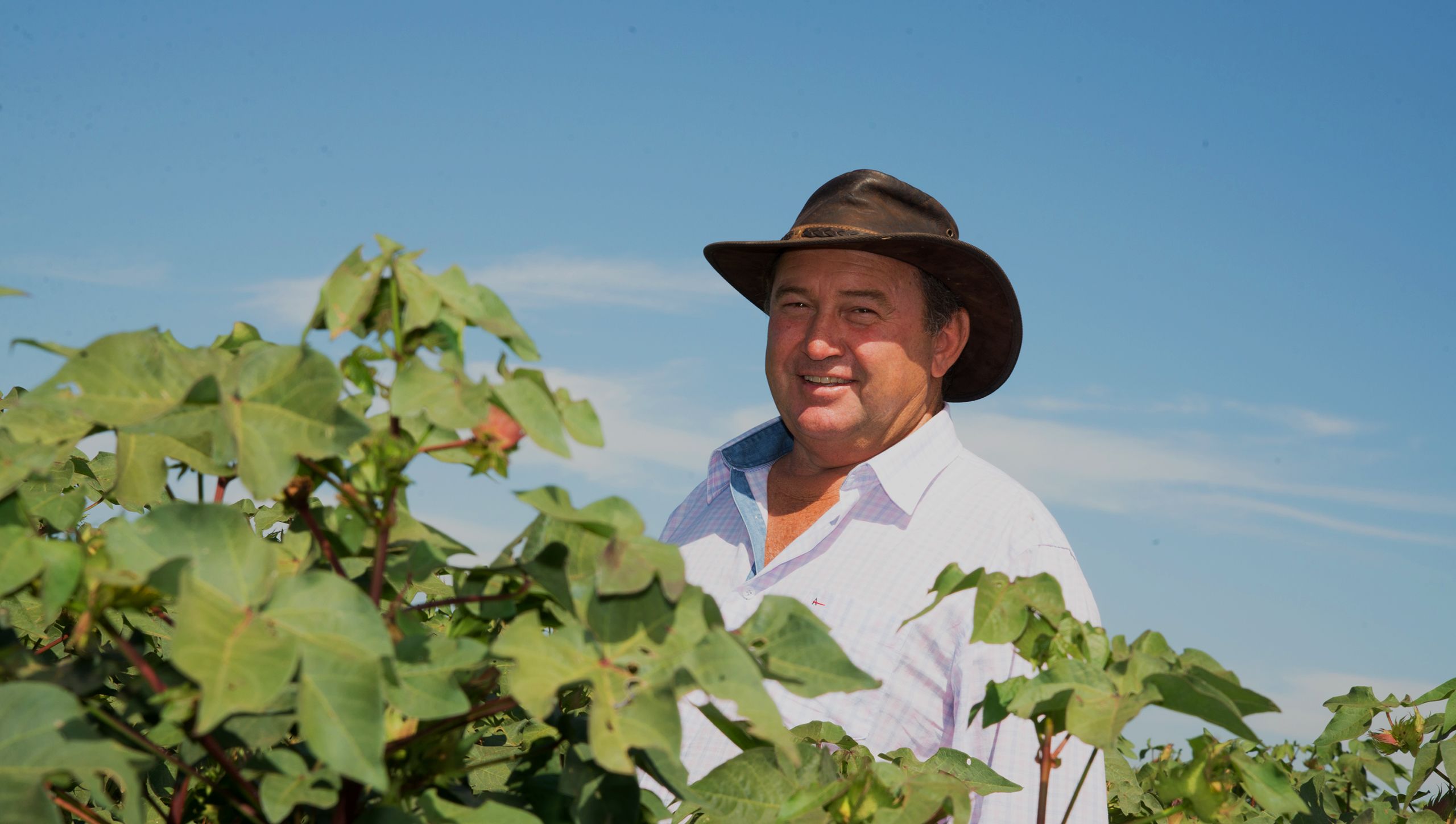
Opportunities for Expansion
In 2019, the United Nations Industrial Development Organisation (UNIDO) launched a multi-stakeholder trial project in Egypt, training cotton farmers on the Better Cotton Initiative’s approach to sustainable cotton production.
Following a successful trial project and completion of the necessary new country start-up process, Egypt officially became a new BCI Programme country in May 2020 as part of a renewed drive to increase sustainability and improve conditions for Egyptian cotton farmers. The BCI Programme — funded by the Italian Agency for Development Cooperation as part of the Egyptian Cotton Project — is coordinated by UNIDO, the Ministry of Trade and Industry, the Ministry of Agriculture and Land Reclamation together with local and international textile private sector stakeholders.
Together with UNIDO, BCI Implementing Partners ALKAN and Modern Nile Cotton will ensure that farmers receive the knowledge, tools and support to improve their agricultural practices and livelihoods.
From the 2020-21 cotton season onwards, approximately 2,000 smallholder Egyptian cotton farmers will participate in the BCI Programme, receiving training on the Better Cotton Principles and Criteria, and they will be eligible to receive a licence to sell their cotton as Better Cotton.
Will We Meet Our 2020 Target
The Covid-19 pandemic and suspension of licensing in the Xinjiang Uighur Autonomous Region (XUAR) may take us off track to reach this target, but we predict to come close. We will be able to disclose our progress later in the 2020-21 cotton season, once we have a fuller picture. Global production of Better Cotton continues to increase year-on-year, with Better Cotton reaching 22% of global production in the 2018-19 season. This was up from 19% in 2017-18 and 14% in 2016-17. With two more seasons (2019-20 and 2020-21) within which to make further advances, we will continue to strive to reach our ambitious target of 30% of global cotton production. Wherever we end up, the fact that a sustainable agricultural commodity – Better Cotton – has reached almost one quarter of global cotton production is a significant milestone for the cotton industry and agriculture as a whole.
Following her mother’s footsteps, Ruksana Kausar married a cotton farmer when she was young. Like many women in her community — where cotton communities farm the land to survive — Ruksana works hard on her family’s cotton farm, sowing seeds, weeding the fields and picking cotton amid the searing heat of Punjab. Yet as a woman in rural Pakistan, where societal ingrained gender bias prevents women from being treated equally to men, she doesn’t participate in business decisions and has little say in how the farm’s profits are spent.
In 2018, at a village meeting, Ruksana saw a presentation that immediately sparked her interest. Samina Kausar, a WWF-Pakistan1 representative told the group about an opportunity that her organisation, in partnership with the Better Cotton Initiative (BCI), had created to support local women to improve their livelihoods. Ruksana listened as Samina described how the organisations would support women like her to cultivate their own tree nurseries, selling the saplings to generate new revenue streams for themselves and their families.
“I always wanted to be financially independent,” Ruksana tells Samina. “I left school when I was 10-years-old, and started working on my parent’s cotton farm. It has always been my dream to provide better education for my children.”
Initially, Ruksana’s husband and other family members had concerns about the potential success of the tree nursery, and they weren’t convinced that it would work. So, together with Samina, Ruksana explained exactly how the project would work, diminishing their doubt.
Find out more about Ruksana and her dream of economic independence.
1. The Better Cotton Initiative works with on-the-ground 'Implementing Partners' across the world to support cotton communities to build resilience and improve their livelihoods. WWF-Pakistan is one of eight BCI Implementing Partners in Pakistan.
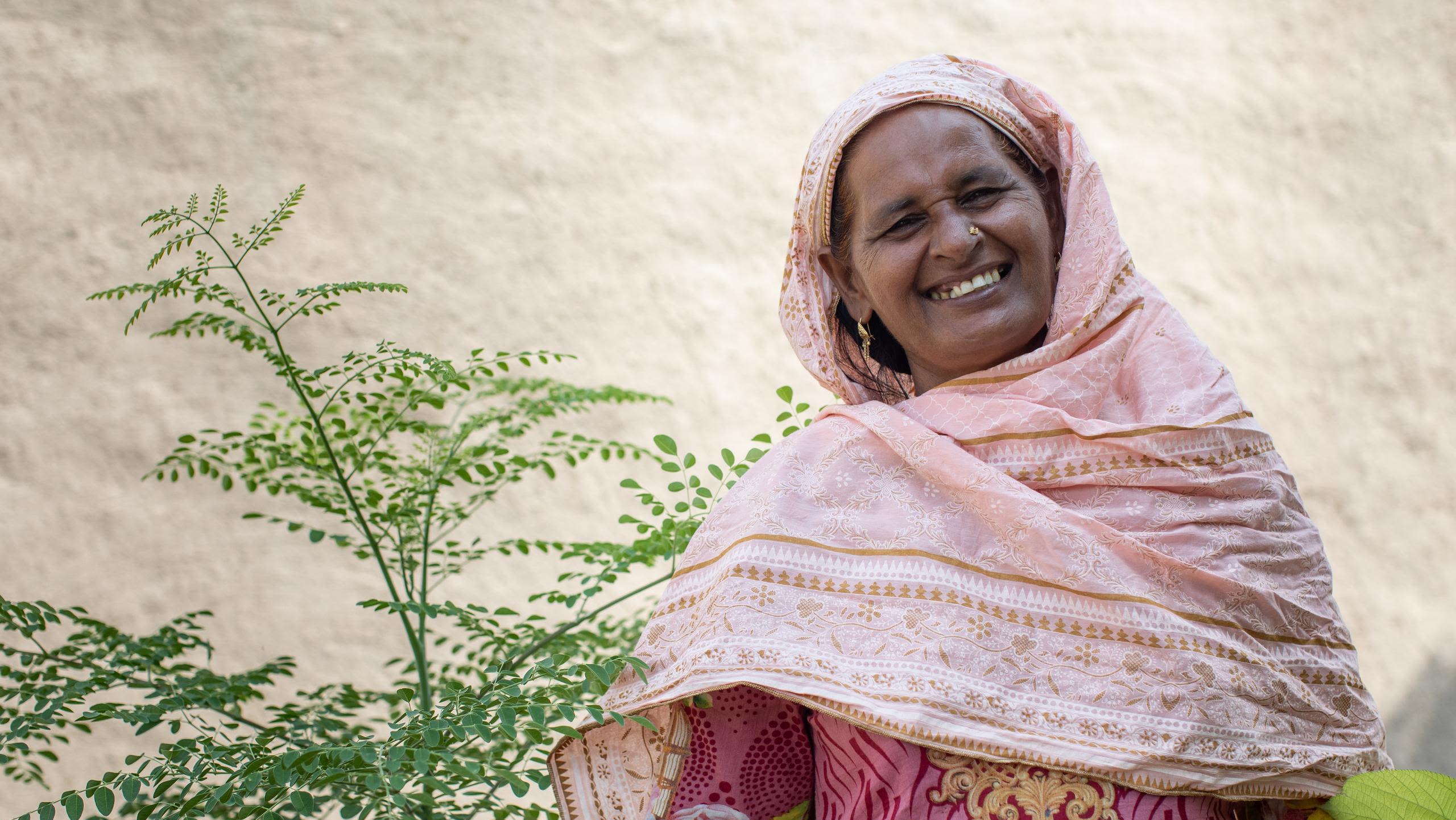
Target Two:
By 2020, we aim to support 5 million cotton farmers to improve their livelihoods by adopting sustainable agricultural practices.
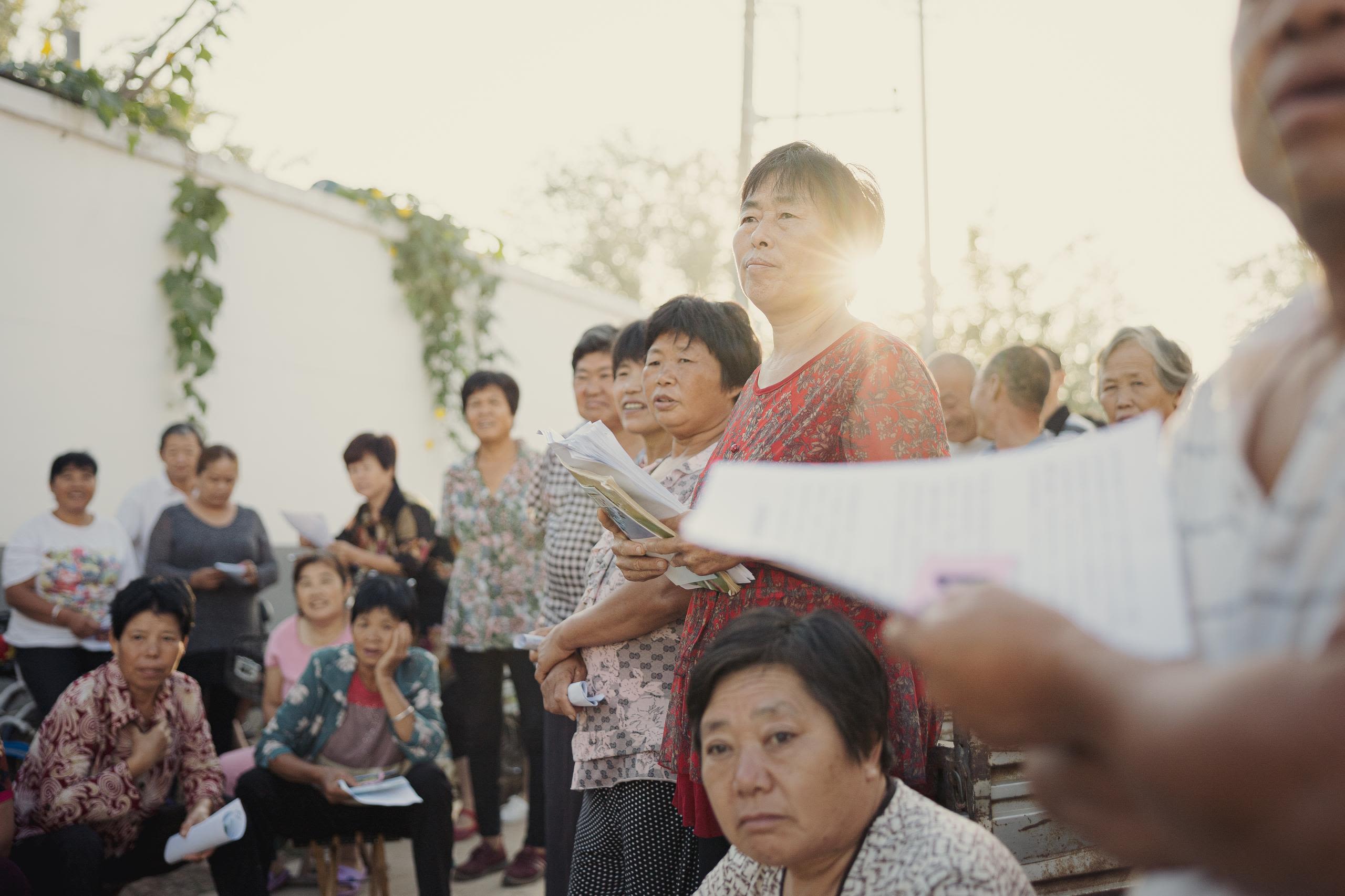
What Do We Want to Achieve
BCI exists to improve farmers’ livelihoods by helping them to adopt more sustainable farming practices which are better for farmers, farming communities and the environment. Our goal is to reach 5 million cotton farmers by the end of 2020.
The majority of the farmers we support are smallholders, many of whom live in conditions of poverty and economic uncertainty, vulnerable to fluctuating yields and prices, particularly in light of increasingly unpredictable climate conditions. We help cotton farmers build climate resilience and make a decent living from farming by growing cotton more sustainably.
We deliver training and capacity building programmes through on-the-ground Implementing Partners (organisations responsible for supporting and training farmers to continuously improve their sustainable agricultural practices), tailoring our support to help farmers address local challenges, from water scarcity in Tajikistan to pest pressure in India to high input costs in Pakistan. Throughout their Better Cotton journey, we require farmers to focus on continuously improving their practices in line with the Better Cotton Principles and Criteria.
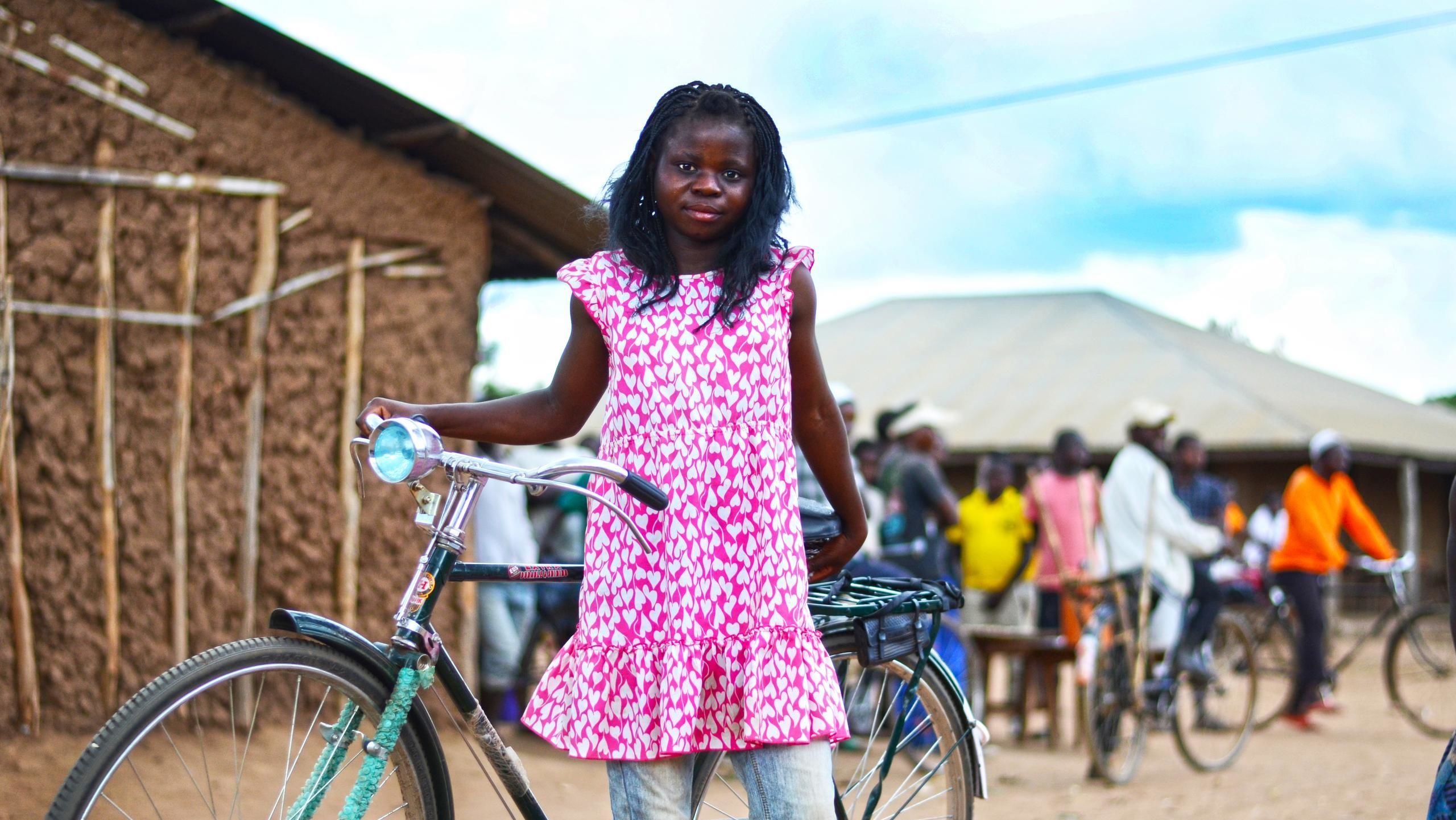
Understanding that changing families’ attitudes towards education is critical to improving children’s lives in cotton farming communities, our on-the-ground partner, SANAM, took steps to shift the community’s perceptions for good.
We learnt that children have the same rights to healthcare, food, safe water and good education, regardless of their gender or where they come from. Both boys and girls should have the freedom to attend school and play with their friends, and we have the right to be heard, particularly when our parents are making decisions that affect our lives.
Image © BCI/Morgan Ferrar
Where Are We Now
In the 2018-19 cotton season, the number of farmers participating in the BCI Programme grew substantially. Through our 76 on-the-ground Implementing Partners we delivered support, training and capacity building to more than 2.3 million cotton farmers in 23 countries.
The number of BCI Farmers who received a licence – enabling them to sell their cotton as Better Cotton – grew to 2.1 million, an 8% increase on the 2017-18 cotton season, with numbers of licensed farmers growing in almost all BCI Programme countries.
The greatest increase in numbers of licensed farmers was observed in India and Pakistan, where more than 100,000 additional farmers in each country achieved a BCI licence. In Kazakhstan, numbers also increased, as our on-the-ground partner sought to secure additional funding for projects to support more farmers and the wider cotton industry. In Mali, the number of licensed farmers increased dramatically from 3,879 to 54,326, as a result of more farmer groups gaining a BCI licence this season. The number of participating farmers in Mali has remained relatively stable over the past few years, but in the previous cotton season, due to challenging conditions and a lack of record keeping, many farmer groups failed to achieve their license.
Farmer numbers declined slightly in Tajikistan amid increasingly arid and challenging farming conditions, including increased input costs. Numbers of BCI Farmers also fell in South Africa as cotton farming became more challenging for smallholder farmers who lacked access to necessary government funding and support to grow cotton crops.
Find out more about field-level successes and challenges in the Better Cotton Country Snapshots.
How We Reach Millions of Farmers
BCI works with Implementing Partners with local knowledge and expertise, and a strong understanding of farmers’ challenges. Partners can be civil society organisations, NGOs, private sector entities, government agencies or foundations. They help cotton farmers to develop the skills and knowledge to meet and continuously improve their performance against the Better Cotton Principles and Criteria. BCI invests in strengthening our partners’ ability to deliver effective training, in order to provide the best possible support to farmers and help maximise positive change in the field. Together, we are steadily raising the quality of farmer training, helping to ensure consistency and quality across programme countries.
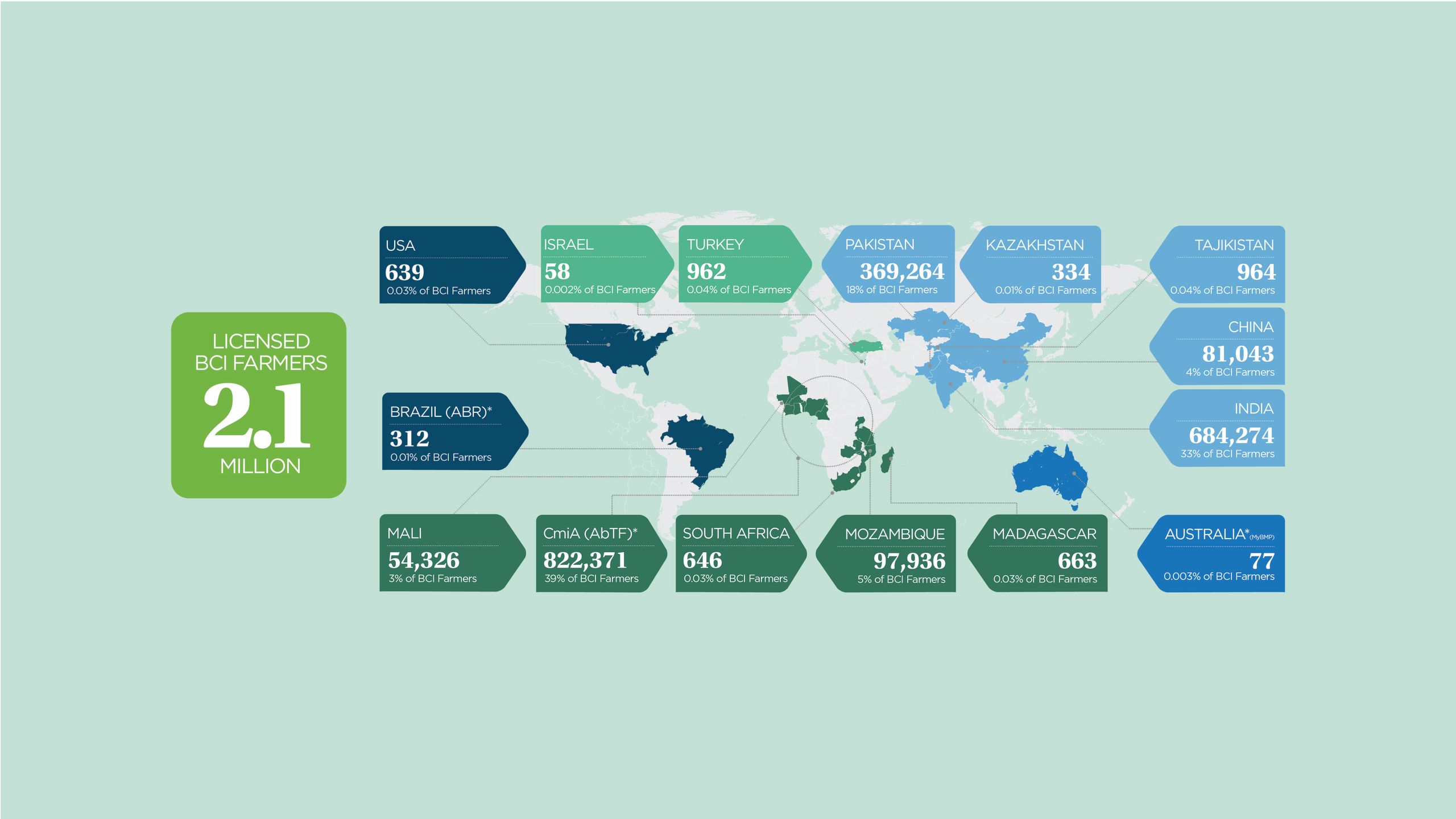
BCI Farmers Around the World
2018-19 Cotton Season
Smallholders and Large Farms
Today, 99% of licensed BCI Farmers are smallholders, farming on less than 20 hectares of land. Oftentimes, it is smallholder farmers who struggle the most, irrespective of the crop they grow, as new farming technologies may be unattainable, quality inputs and finance may be hard to afford or obtain and communities may have limited access to education. However, BCI also engages large farms around the world who may face different kinds of challenges, such as superweeds (herbicide-resistant weeds), soil depletion and water scarcity, and they can also benefit from support to continuously improve their practices. Large mechanised farms in some parts of the world are able to employ advanced agricultural technologies, and industry best practice, to produce significant volumes of cotton in a more efficient and sustainable manner. The capacity to grow larger volumes of more sustainable cotton also ensures an ample supply of Better Cotton.
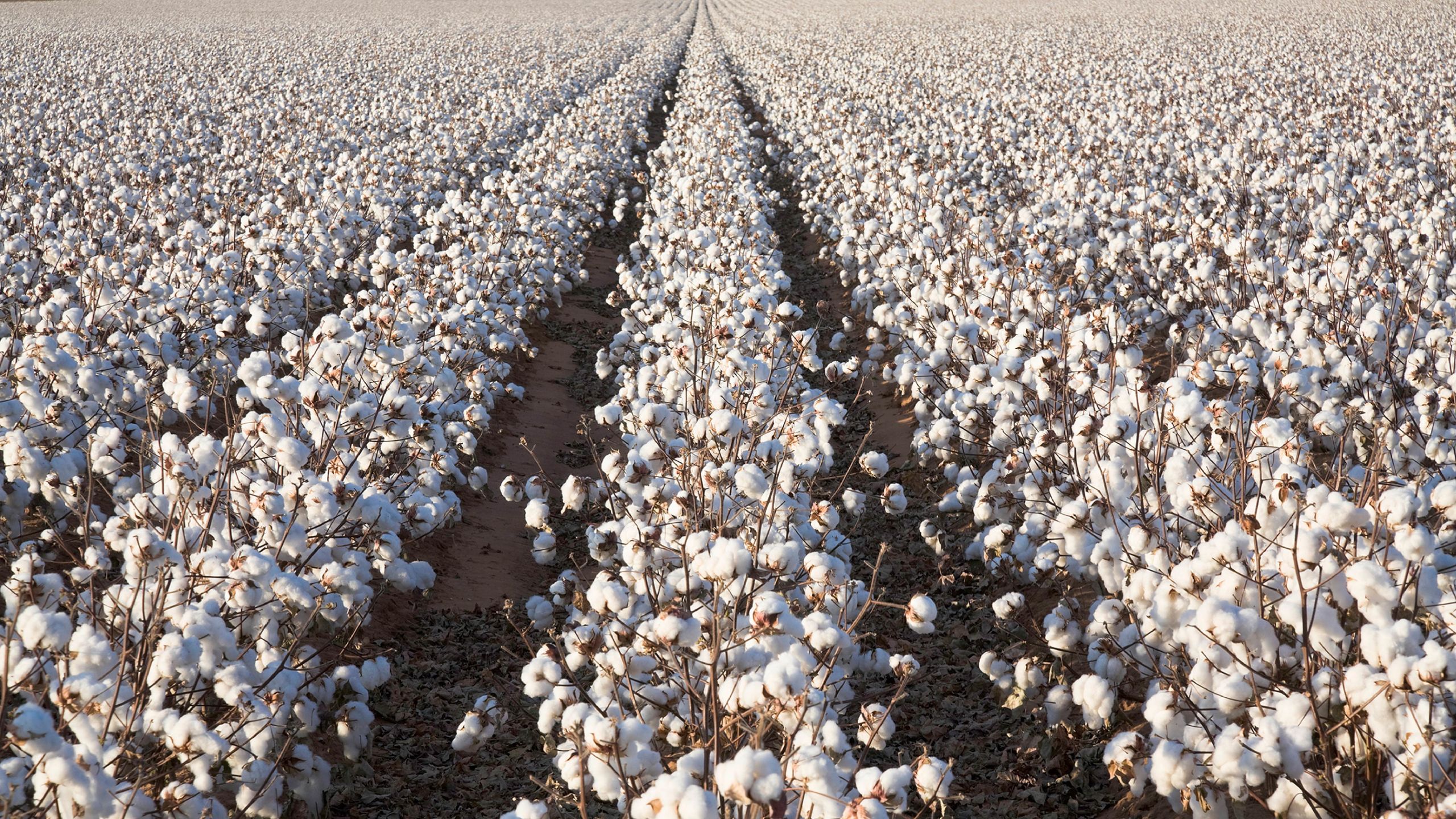
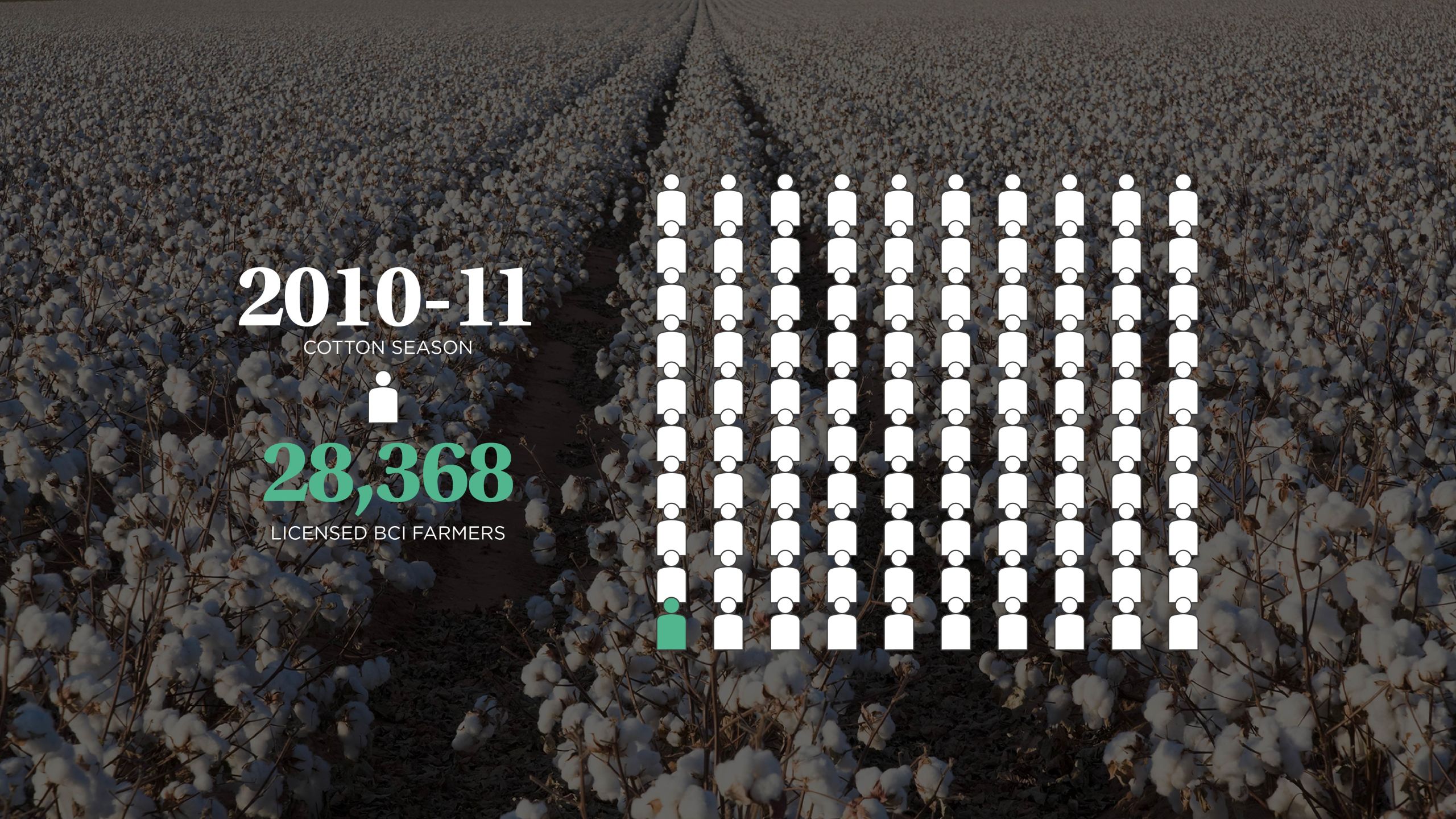
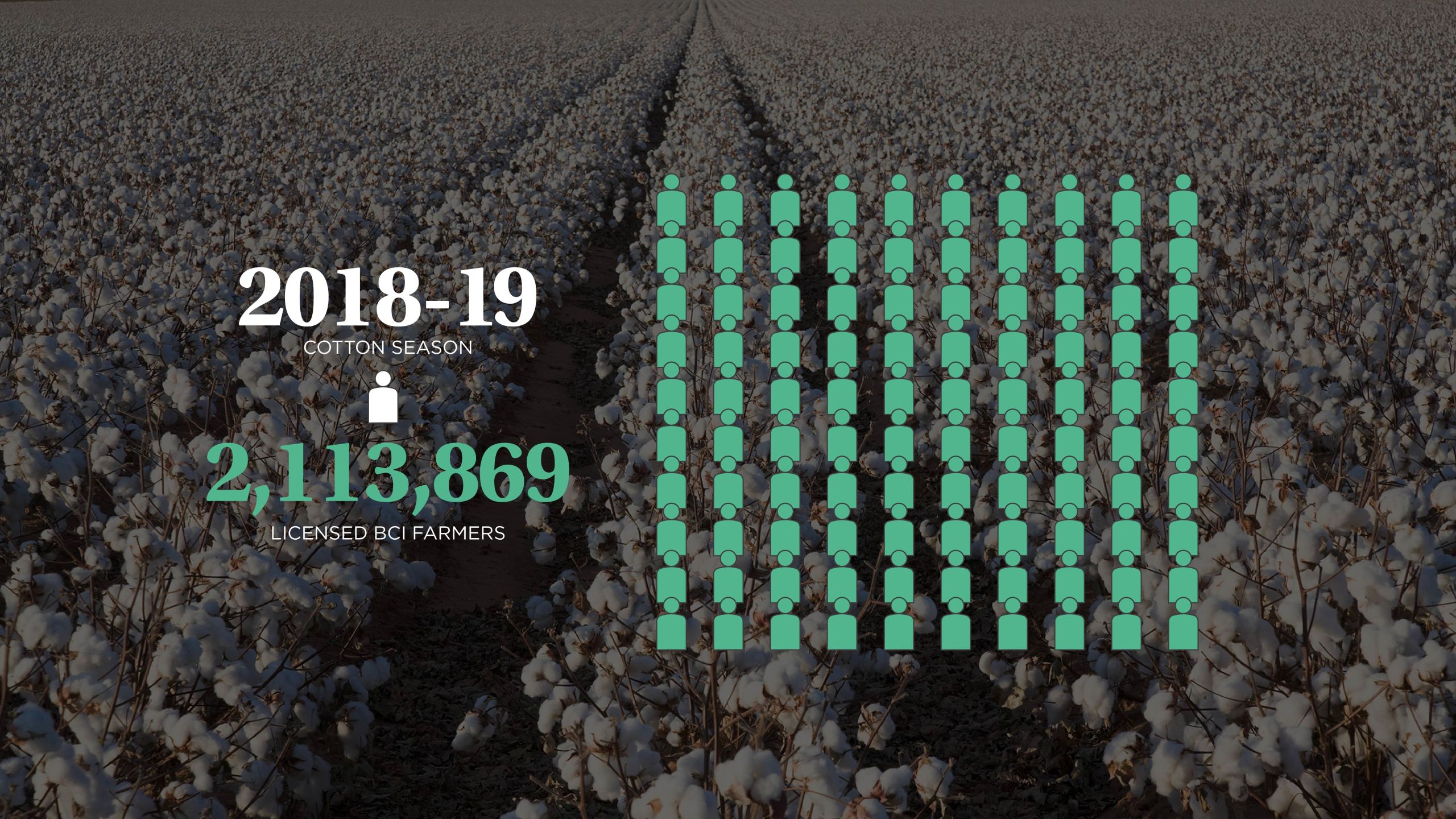
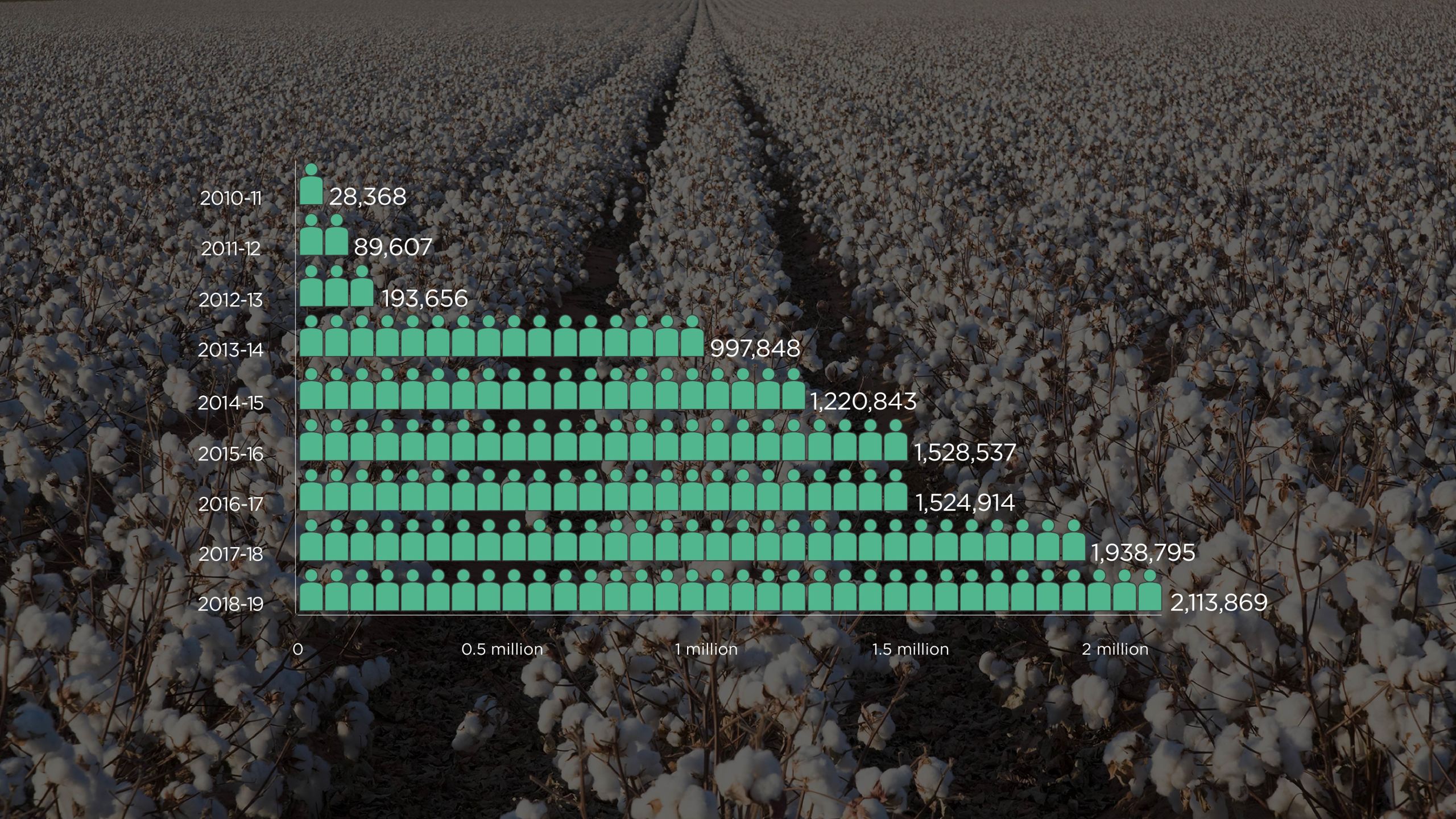
Licensed BCI Farmers
2010-11 – 2018-19 Seasons
Licensed BCI Farmers
2010-11 – 2018-19 Seasons
Strengthening BCI’s Field-Level Impact
BCI and our on-the-ground partners focus on continuous improvement at field level and seek to strengthen the Better Cotton Standard for the benefit of BCI Farmers, workers, farming communities, the environment and the sector as a whole. In the 2018-19 cotton season, we launched and implemented numerous innovations to deepen BCI’s impact at field level.
Catalysing Ideas and Partnerships with the Better Cotton Innovation Challenge
In 2019, BCI and IDH The Sustainable Trade Initiative (IDH), with the support of Dalberg Advisors, launched the Better Cotton Innovation Challenge – a global project seeking innovative ideas and solutions to improve sustainable cotton farming practices around the world. Through this initiative, we aim to offer more efficient and innovative services to farmers by creating new partnership and funding opportunities, as well as establishing a community of innovators.
The Innovation Challenge called for innovators to submit solutions that would enable more effective and customised farmer training and more efficient data collection from field up. We received 87 applications, with the 20 shortlisted innovations submitted by organisations based in India, Pakistan, the US, Greece, Israel, Kenya and Australia.
“The Innovation Challenge will identify solutions that will help us deepen the impact of the BCI Programme on cotton farmers and accelerate the adoption of sustainable cotton farming practices globally.”
In 2020, up to five finalists will pilot test their innovations on the ground with BCI Farmers. Following the pilot phase, up to four winners will share a prize fund and have the opportunity to introduce their solution to BCI Farmers.
Find out more: bettercottonchallenge.org
Innovation Challenge image.
Innovation Challenge image.
BCI iLeap app - assessment tool.
BCI iLeap app - assessment tool.
Building Field Facilitators’ Capacity to Train Farmers with the Kuza Project
As BCI Programmes continue to grow around the world, we recognise the need to continuously improve the quality and consistency of the BCI training delivered to our Implementing Partners. To help develop and improve farmer training in India, we took action to improve Field Facilitators’ (trainers employed by Implementing Partners to deliver training to farmers) ability to deliver high quality advice through an online skill development tool. We partnered with social development enterprise, Kuza, to pilot the project with six Implementing Partners in Maharashtra and Gujarat, reaching 500 Field Facilitators, who collectively reach tens of thousands of farmers. We aim to enable Field Facilitators in these regions to identify any gaps in their knowledge and skills, and to strengthen their knowledge on key topics such as Decent Work and agronomy. Through the online tool, Field Facilitators can access a personalised learning path, along with multiple videos on key topics, as well as other skills vital to training and project management.
We are evaluating the results of the pilot and reviewing how best to implement the approach at a national level. There is some uncertainty given the Covid-19 pandemic, however, we propose to use the materials developed for the Kuza pilot on two learning platforms, one in India and one in Pakistan. The materials will be made available to 3,500-4,000 Field Facilitators in 6 languages: English, Hindi, Gujarati, Marathi, Punjabi, and Urdu.
Strengthening Sustainability Measurement and Reporting: Promoting Global Consistency through the Delta Framework
There are many sustainability standards and public-sector initiatives that promote and advance sustainability within commodity sectors. However, there is typically little consistency in how impact data is collected and reported. It can, therefore, be challenging to gain a clear view of these programmes’ collective ability to progress towards the United Nation’s 2030 Sustainable Development Goals (SDGs) on a global scale.
To bridge these gaps and improve efficiency, the Delta Project was developed to achieve consistency in measuring and reporting sustainability performance at farm level across cotton and coffee sustainability standards. A longer-term aim is to also influence other commodities, thus promoting consistent and transparent impact reporting. The project is a collaboration between BCI, the Global Coffee Platform (GCP), the International Cotton Advisory Committee (ICAC) and the International Coffee Association (ICO). It is funded by the ISEAL Innovation Fund, which is supported by the Swiss State Secretariat for Economic Affairs SECO.
The Delta Framework will be field-tested in 2020 and features a common set of environmental, social, and economic indicators to measure progress on shared sustainability goals for cotton and coffee cultivation.
“While the Delta Project currently focuses on two commodities, cotton and coffee, it is being designed to allow for further expansion. We’re really excited about its potential application for cocoa, soy, palm oil, sugar and other commodity sectors in the future.”
Find out more: deltaframework.org
© Global Coffee Platform. Harvesting coffee beans.
© Global Coffee Platform. Harvesting coffee beans.
© BCI/Vibhor Yadav, 2019. Smallholder cotton farmers in Gujarat, India. (Not involved in the study.)
© BCI/Vibhor Yadav, 2019. Smallholder cotton farmers in Gujarat, India. (Not involved in the study.)
Understanding the Impact of the Better Cotton Initiative on Smallholders in India
In southern India, smallholder cotton farmers face challenges including illiteracy, small landholdings, unpredictable rainfall, high input costs, indebtedness to commission agents, lack of access to extension services and limited knowledge on minimising chemical inputs. By creating an enabling environment for farmers to participate in the Better Cotton Standard System, BCI’s Implementing Partners in the region help farmers improve profitability, water quality, soil health, input use, yields, labour conditions and health and safety. Now, an independent, three-year impact study conducted in Kurnool District among 694 households demonstrates that BCI Farmers are increasingly adopting the Better Cotton Principles, with positive impacts for smallholders and their families. Begun in 2015, funded by the Ford Foundation and commissioned by the ISEAL Alliance, the research monitored participating BCI Farmers’ progress. In particular, researchers found that BCI Farmers were using fewer pesticides and in lower doses, compared to non-BCI farmers. And in 2018, only 8% of BCI Farmers reported using combinations of pesticides – a sharp decline from 51% in 2015. Additionally, BCI Farmers were using more biological pesticides, such as neem oil and other techniques to protect cotton from specific pests.
As the study was conducted in the first three years of the BCI project being implemented, the impact seen on the ground was limited in some areas. For example, there was less evidence of progress on social indicators and results. There was a lack of affirmative measures to show positive changes in gender equity challenges such as occupational segregation, unequal access to land and property, wage discrimination, reproductive health risks, and a lack of voice within household structures.
The evaluation offers myriad opportunities for lesson learning for BCI, ISEAL members, and other stakeholders, particularly around improving the impact potential in India’s smallholder context. BCI’s model, and that of other credible standard systems, relies on this kind of in-depth evaluation, coupled with our own ongoing monitoring, to ensure that our interventions are as effective as possible.
BCI acknowledges the many challenges and opportunities identified by the evaluation. Therefore, to further increase positive impact in the region, BCI is working with its partners to reduce farmers’ dependence on commission agents, known as dalals, to whom poorer farmers may be indebted. BCI is also collaborating with its partners and stakeholders to address issues around gender inequality and collective producer action. Furthermore, BCI is enhancing efforts to build farmers’ resilience to climate change, as farmers face increasingly unstable conditions, with irregular rainfall affecting cotton sowing and yields.
Find out more: Evidensia.eco
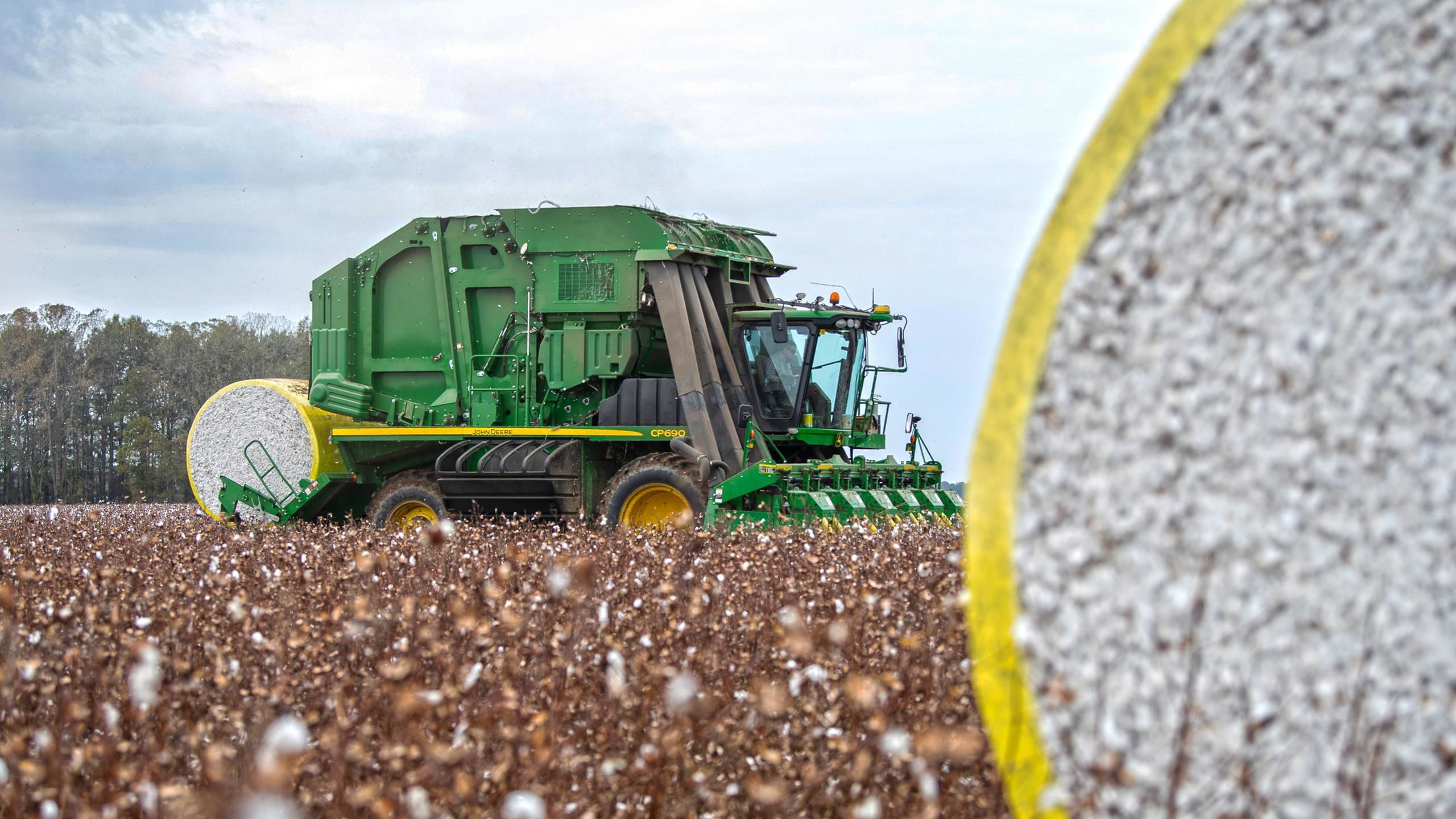
“The Better Cotton Standard has pushed me to better manage farming inputs such as water, nitrogen, pesticides, fuel and labour, which has ultimately made me a better grower and producer.”
Find out more about BCI's work in the USA.
Image © BCI/Demarcus Bowser
Promoting Gender Equality in the Global Cotton Sector
Gender inequality remains a pressing challenge in the cotton sector. Globally, women in cotton production take on varied, essential roles, but their labour is often unrecognised and under-remunerated. Where the contributions of women remain unrecognised, their critical role in adopting more sustainable practices, and creating a transformed, equitable cotton future, is missed. As an industry leader, BCI has an opportunity to address these challenges and to integrate gender equality as a cornerstone of sustainable cotton. The BCI Gender Strategy, developed and launched internally in 2019, outlines our action plan to mainstream a gender sensitive approach across our work.
BCI Gender Strategy in Action
To make cotton production better for all the people who produce it, BCI will work to improve gender equality throughout our operations. We will do this by mainstreaming gender sensitive approaches across farm-level work, and amplify this work through the sustainable cotton community and through building awareness and capacity within BCI. We completed a baseline gender assessment report in 2019 to assess BCI’s progress to date. This report identified areas for improvement and formed the foundation of our strategy. Here are some examples of the strategy in action in 2019.
Farm Level
- The majority of the Better Cotton Principles and Criteria focus on farm stewardship and environmental requirements. This means that the knowledge and capacity of Implementing Partners in relation to gender is generally lower, and that gender considerations are not always integrated across all activities.
- Going forward, we expect all of our partners to identify and deliver activities to progress gender equality. To support their efforts, we launched a partner-focused gender equality training module with the support of C&A Foundation and two expert consultants.
Organisation
- There is a need to build the capacity and awareness of BCI staff and partners, of how gender equality is relevant to the work BCI carries out, and how BCI’s mission can be better achieved if BCI’s activities are implemented with an integrated gender perspective.
- We are working to ensure that all BCI staff are trained on gender power dynamics. In 2019, the BCI Council and BCI staff participated in Gender, Equality and Diversity Training, facilitated by CARE International. Additional training is planned for 2020.
Sustainable Cotton Community
- BCI recognises that to address entrenched gender issues in cotton production, a collaborative approach has to be adopted. We are committed to sharing knowledge, experience, and learnings with others working in sustainable agriculture.
- During the 2019 Global Cotton Sustainability Conference in Shanghai, China, we hosted an action-oriented session on Women in Agriculture, convening representatives from Fairtrade International, Cotton Connect, Cotton Australia, the University of London Royal Holloway, and BCI.
BCI is at the beginning of its journey towards supporting transformative action to progress gender equality. We are actively seeking partnerships to collaboratively accelerate this work.
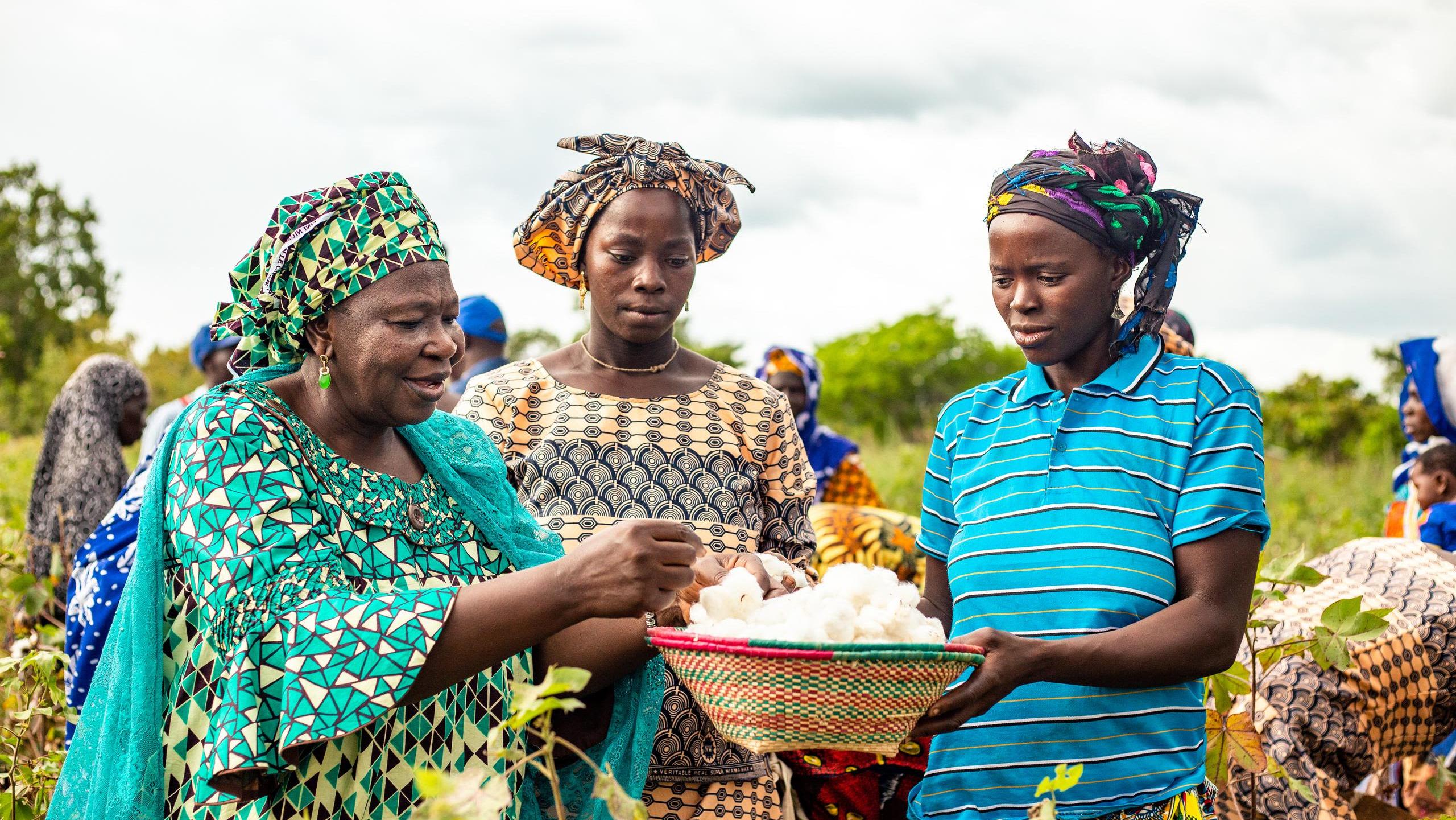
My choice to become an agronomist was guided by a passion to help smallholder farmers in the cotton sector, especially women. Cotton is a real source of pride in my region, but farmers face many challenges in raising their yields, from irregular rain to poor soil health, high input costs and unstable cotton prices. Also, women have typically had no say in the sector, from the fields all the way up to the cooperatives, despite playing an important role in cotton production.
Image © BCI/Seun Adatsi
Challenges
Task Force on Forced Labour and Decent Work
In the spirit of continuous improvement and to strengthen our approach to preventing forced labour and promoting Decent Work (one of the seven Better Cotton Principles and Criteria), BCI has established an expert, multi-stakeholder Task Force on Forced Labour and Decent Work. In particular, the Task Force will develop recommendations for the global BCI Programme to help ensure that we operate with integrity – and in accordance with clearly defined environmental and social criteria – everywhere we work. Read more about the Task Force here.
Uzbekistan
Historically, there have been challenges with Decent Work principles in Uzbekistan, one of the world’s largest cotton producing countries.
During the 2018-19 cotton season, the International Finance Corporation (IFC) launched an independent sustainable cotton project in Uzbekistan based on the Better Cotton Principles and Criteria. We are encouraged by the progress that has been made through this project and have started participating in IFC’s Sustainable Cotton Project Consultative Council as an observer member, in order to encourage multi-stakeholder dialogue. The Consultative Council is a multi-stakeholder forum in Uzbekistan including the Uzbekistan Government, relevant line ministries and local authorities.
In 2020, BCI will increase its involvement in the IFC Cotton Project, participate in a Decent Work Working Group, and engage with the Uzbekistan Government. Once these activities are completed, and with the recommendations from the Task Force on Force Labour and Decent Work we will determine if the appropriate conditions are in place to start the launch of the BCI new country start-up process.
China
After investigation, review and deliberation throughout 2019, in March 2020, BCI made the decision to suspend its assurance activities in the Xinjiang Uighur Autonomous Region (XUAR) of China, effective starting the upcoming cotton season (2020-21), based on the recognition that the enabling environment prevents credible assurance and licensing from being implemented. This means there will be no Better Cotton produced in the region during the period of suspended licensing. However, we will continue to support farmers in the region through continued training and support. We have also contracted an independent expert who is conducting an external review of the region and evaluating the risk level.
Amid global health, sustainability and economic challenges, we remain committed to our mission. Our renewed focus on Decent Work and continued support of BCI Farmers will enable us to fulfil that mission while upholding the high standards expected by BCI stakeholders. We will continue to engage with all stakeholders and experts to adapt and respond to challenges, as we build farming communities’ capacity to adopt more sustainable practices.
Will We Reach Our 2020 Target
We have made progress on reaching more cotton farmers, and by the 2018-19 season, we have reached 2.3 million farmers in 23 countries. Numbers of farmers participating in the Better Cotton programme have steadily increased over the past cotton seasons, up from 2 million in 2017-18 and 1.5 million in 2016-17. While there are still two more seasons within which to make further progress (2019-20 and 2020-21), it is likely that we will not reach our target of 5 million farmers. However, BCI will certainly have reached millions of people by this time - including household and community members who often attend BCI training sessions - helping both BCI Farmers and their communities to improve their livelihoods.
Who Do We Reach?
Across the world, smallholder farmers who participate in BCI Programmes learn about sustainable agricultural practices and Decent Work principles in small groups of around 35 people. We refer to these groups as ‘BCI Learning Groups’.
The licensed BCI Farmer — in many cases, the man who is considered ‘head of household’ — attends these sessions, and when we calculate how many BCI Farmers we reached in any given season, we presently only count the ‘official’ BCI Farmer. For example, in the 2018-19 cotton season, 2.3 million farmers were registered as participating, and 2.1 million of those farmers achieved a license to grow and sell their cotton as ‘Better Cotton’.
But what about all the other household and community members who attend sessions and activities, learning about ways they can improve their livelihoods and protect the surrounding environment? Co-farmers, sharecroppers, spouses, seasonal farm workers, permanent workers, and other community members also frequent training sessions and activities. Together with our on-the-ground partners, BCI is reaching a broad range of people, not just ‘the farmer’.
For example, in the provinces of Punjab and Sindh in Pakistan, in addition to delivering training to licensed BCI Farmers, BCI’s Implementing Partners delivered training to more than 250,000 (male and female) farm workers in the 2018-19 cotton season. These individuals are not counted as licensed BCI Farmers, but they still receive support and training on sustainable farming practices.
© BCI/Khaula Jamil, 2018. Farming community members attend a BCI training session in Punjab, Pakistan.
© BCI/Khaula Jamil, 2018. Farming community members attend a BCI training session in Punjab, Pakistan.
Target Three:
By 2020, we aim for 10% of global cotton production to be sourced as Better Cotton.
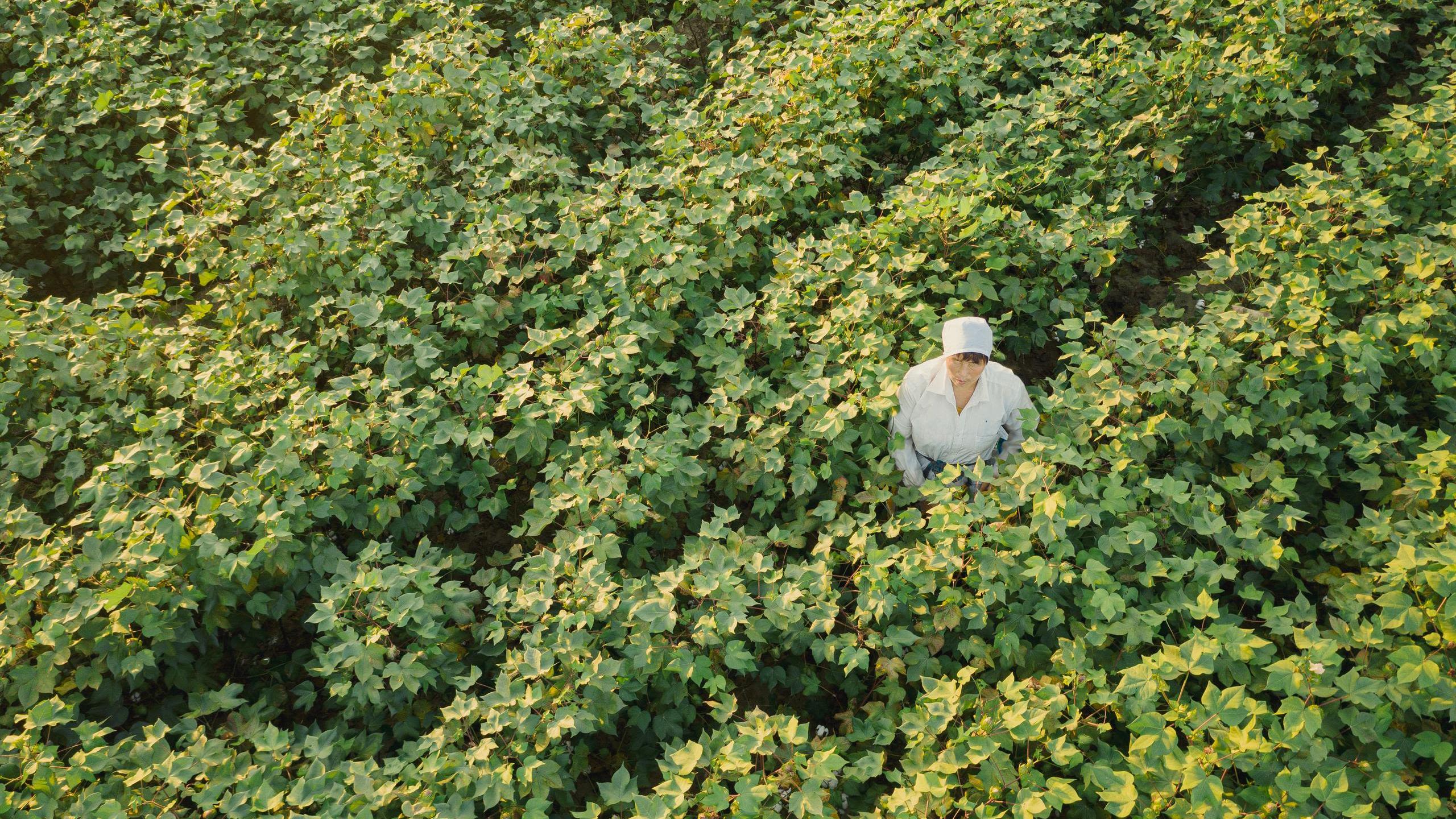
What Do We Want to Achieve
BCI engages the entire cotton sector and beyond, from ginners and spinners to civil society organisations and major global retailers and brands, to establish more sustainable cotton as the norm. Among our industry members, the fashion and textile companies – the BCI Retailer and Brand Members – stand to make the greatest positive impact and influence in the market by sourcing more sustainable cotton as their cotton of choice. Better Cotton often forms a significant part of a retailer’s portfolio of more sustainable cotton sourcing options, including organic, Fairtrade and recycled cotton. These members’ purchasing power and leverage within supply chains drive a growing demand for Better Cotton, creating a ripple effect that sees suppliers seeking more sustainable cotton and BCI Farmers benefitting from selling increased volumes. Importantly, increased demand and investment from these businesses also amplifies the funding available for farm-level capacity building. By the end of 2020, we aim for 10% of global cotton production to be sourced as Better Cotton. This would be a major achievement and a first for more sustainable cotton, helping to establish responsible, sustainable materials sourcing as ‘business as usual’.
Where Are We Now
BCI membership grew significantly in 2019, while Retailer and Brand Members made substantial progress towards their sustainable cotton goals, sourcing record levels of Better Cotton. By the end of the year, eight BCI Retailer and Brand Members had already reached (and publicly communicated) their target to source 100% of their cotton more sustainably, and a further 23 hope to achieve this target by the end of 2020.
In 2019, 150 BCI Retailer and Brand Members collectively sourced more than 1.5 million metric tonnes of cotton as Better Cotton. This accounts for 6% of global cotton production and is a more than 40% increase on 2018. The increase sends a clear signal to the market that Better Cotton is becoming a sustainable mainstream commodity.
Importantly, increased uptake of Better Cotton also leads directly to increased investment in farmer training. Retailer and Brand Members pay a volume-based fee centred on the volume of Better Cotton they source in a year. This fee is invested through the Better Cotton Growth and Innovation Fund (see Target Five for more information) and directly funds farmer training and capacity building programmes around the world. A rise in demand for Better Cotton enables BCI, directly and through the Better Cotton GIF, to invest in training and support for an increased number of farmers.
In total, 66 new retailers and brands joined BCI in 2019. By the end of the year, 52 of these new members had already completed the necessary internal training and supplier engagement to start sourcing cotton as Better Cotton, which is a great achievement. While enabling BCI to direct increased levels of funding to field-level programmes, this upsurge in sourcing volumes reinforces the trend towards more sustainable materials becoming an important component of retailers’ sustainability strategies. You can find out who the new members are in our biannual new member updates shared in the first half of 2019 and second half of 2019. At any time, you can view all BCI Members on the Find Members webpage.
As our members continue to set ever more ambitious sourcing targets, we will further invest in reaching and training more cotton farmers in order to meet the growing demand for Better Cotton.
What Do We Mean by Sourcing Better Cotton
Beyond the cotton gin level, BCI operates using a Mass Balance chain of custody system (between the farm and gin BCI uses physical segregation). Mass Balance is a term used to describe a supply chain methodology. Simply put, it means what comes out must balance with what went in. For example, if a retailer places an order for finished garments, like T-shirts, and requests one metric tonne of Better Cotton be associated with this order, a cotton farmer somewhere must produce one metric tonne of cotton to the Better Cotton Standard. This is then registered on BCI’s supply chain system, and credits – Better Cotton Claim Units – for the order are passed through the supply chain for that same weight in cotton, from one factory to the next. What comes out is the equivalent amount of cotton that the farmer produced as Better Cotton, but it has been mixed in with conventional cotton in its journey from field to product.
In this way, by committing to sourcing Better Cotton and obtaining claim units with their orders, BCI’s Retailer and Brand Members can be assured that they are supporting more sustainable cotton farming, regardless of where that cotton ends up. Our focus is at farm level and tracing physical Better Cotton to the end product is not necessary for us to reach farmers and help them adopt more sustainable practices.
When you see the BCI logo on packaging, it does not mean the product is made of physically traceable Better Cotton. It means that you are buying a majority cotton product, from a brand that has demonstrated its commitment to BCI, met a set of stringent eligibility criteria, and is investing in training and support for BCI Farmers around the world. On-product claims are one of the primary means of communicating about Better Cotton with consumers, and therefore making accurate and transparent claims is vital. As of 2019, BCI Members using the BCI logo on product packaging are required to communicate clearly about Mass Balance.
Cecilia Brannsten, Environmental Sustainability Manager, H&M Group, talks about H&M’s sustainable cotton sourcing ambitions and their commitment to Better Cotton.
Cecilia Brannsten, Environmental Sustainability Manager, H&M Group, talks about H&M’s sustainable cotton sourcing ambitions and their commitment to Better Cotton.
The important thing is that change happens where it makes an impact for the cotton growers and for the environment.
Example of Member communications - M&S website www.marksandspencer.com/c/sustainably-sourced-cotton
Example of Member communications - M&S website www.marksandspencer.com/c/sustainably-sourced-cotton
Example of Mass Balance On-Product Mark - Very
Example of Mass Balance On-Product Mark - Very
Developing Member Communications
An integral part of the Better Cotton Standard System is the revised Better Cotton Claims Framework. The Framework makes it simple for BCI Members to make credible and positive claims about Better Cotton and allows flexibility in how members communicate about their commitment to more sustainable cotton. It is also an important tool to help drive demand for Better Cotton by building market awareness. To further support members in how they communicate their commitment to Better Cotton, in 2019, BCI released a new sustainability impact claim for eligible Retailer and Brand Members. The new impact claim enables members to link their investment into farmer training programmes (channelled through the Better Cotton Growth and Innovation Fund), and the volumes of Better Cotton they have sourced in a season, to BCI Farmers’ results in water and pesticide savings and profitability, demonstrating their positive impact in a more tangible way. Individual claims are calculated following a robust methodology developed in collaboration with expert stakeholders. Building on this, BCI will seek to help members communicate on improvements over time, including carbon savings and environmental footprints.
Membership
More than 400 new members joined BCI in 2019. By the end of the year, BCI had 1,842 members across five membership categories, a 29% increase on 2018.
- Suppliers and Manufacturers: 1,585
- Retailers and Brands: 168
- Civil Society: 42
- Producer Organisations: 30
- Associates: 17
Partnering with Civil Society Organisations
Five new civil society organisations joined BCI in 2019:
Indira Priya Darsini Women’s Welfare Association (India) focuses on women’s empowerment, sustainable agriculture, child labour, skill development and training.
Sustainability Innovation Advocacy Foundation Pakistan is an organisation of researchers, scientists and policy scholars committed to sustainable development.
Pakistan Rural Workers Social Welfare Organisation seeks to improve the socio-economic conditions of disadvantaged, vulnerable and rural communities.
High Conservation Value (HCV) Network (United Kingdom) strives to protect high conservation value areas (natural habitats of outstanding significance), where the expansion of forestry and agriculture may put important forests, biodiversity and local communities at risk. This partnership is reciprocal, meaning that BCI is also a member of the HCV Network.
Global Alliance for Sustainable Supply Chain (Japan) is a non-governmental organisation promoting a sustainable supply chain in Japan.
We joined BCI to kick-start its training on biodiversity management tools with BCI Farmers in Mozambique and India. Through our collaboration to date, the HCV Network has also contributed to the revision of the Better Cotton Principles and Criteria. We look forward to continuing to support BCI.
As a multi-stakeholder organisation, we recognise the value in including and engaging a diverse mix of stakeholders in our efforts to make the future of cotton more sustainable. This includes civil society organisations (CSOs). These groups already contribute to BCI as knowledge, field-level and funding partners and bring invaluable industry and technical expertise. Despite this engagement, to date BCI has not focussed specifically on bringing CSOs into the BCI membership. We recognise that a stronger civil society membership base will further build BCI’s expertise and ability to create lasting change, and we are committed to creating the right conditions for them to play a greater role in our future. In 2020, we plan to implement a strategy to bring more CSOs into the membership and to deepen engagement with existing members. The strategy includes better understanding the needs of our existing CSO network, seeking opportunities for mutual benefit, clearly defining the value of CSOs joining BCI and establishing how we can better work together.
Will We Meet Our 2020 Target
We will come close to meeting this target, but we are unlikely to meet it. At the end of 2019, BCI Retailer and Brand Member sourcing accounted for 6% of global cotton production, up from 4% in 2018. At the beginning of 2020, Retailer and Brand Members were on track to source two million tonnes of Better Cotton lint by the end of the year, which would have accounted for approximately 8% of global cotton production, landing BCI close to our 2020 target. However, the global Covid-19 pandemic has added an element of uncertainty, which may prevent some members from achieving their 2020 sourcing targets. In addition to potentially lowering sourcing levels, the virus outbreak could also impact new member numbers.
Despite this, we have confidence that demand for more sustainable materials will continue to increase over the coming years. This is reflected both in the 64% year-on-year increase of committed BCI Retailer and Brand Members (66 new Retailer and Brand Members in 2019), and 41% increase in Better Cotton volumes sourced (1,503,435 tonnes in 2019), compared to the previous year. Overall, we are delighted to see uptake of Better Cotton come ever closer to the 2 million tonne mark – a huge achievement for BCI, our members and more sustainable cotton.
Target Four:
By 2020, we aim for nine countries to take responsibility for funding and implementing the Better Cotton Standard.
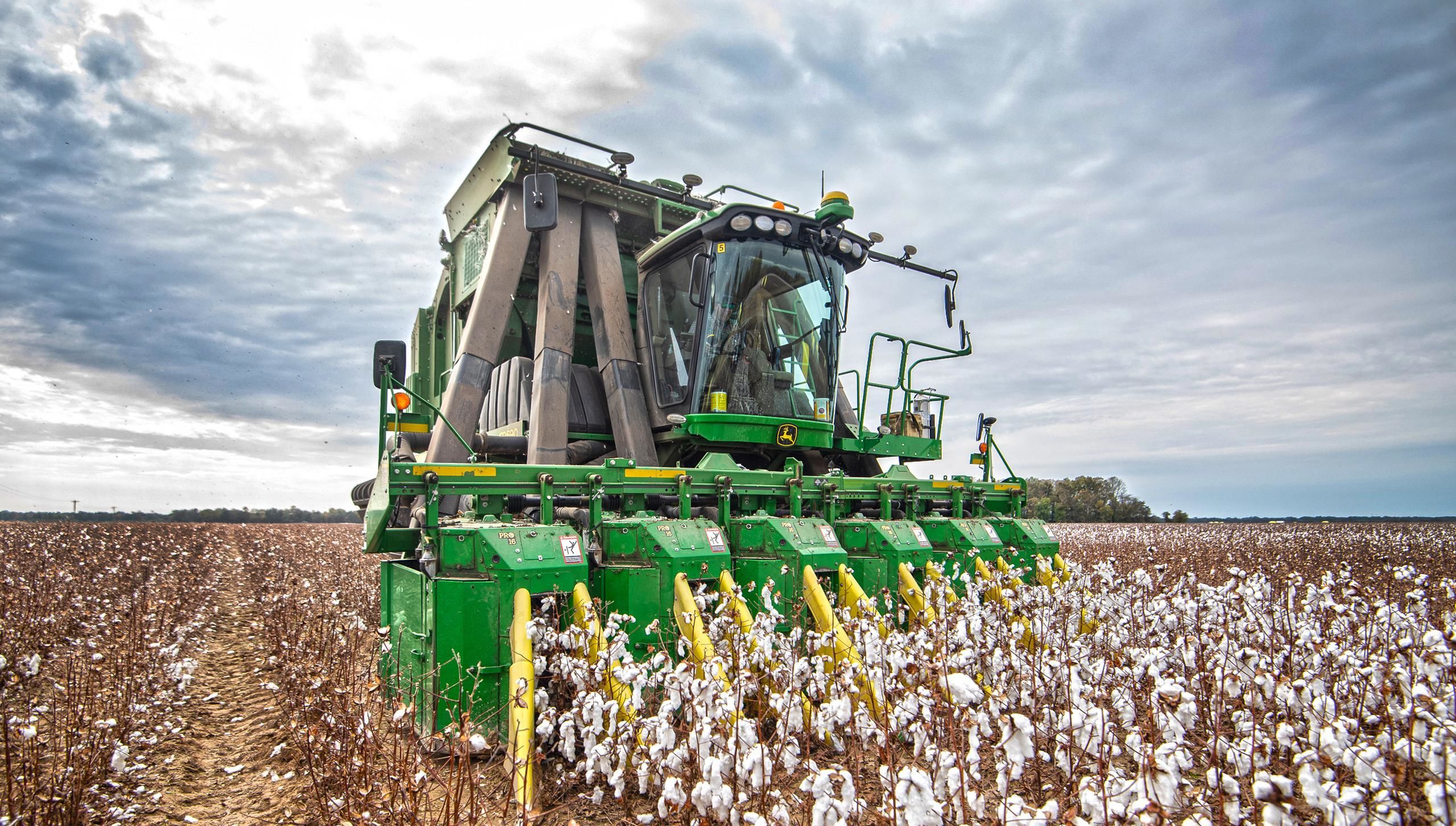
What Do We Want to Achieve
Ultimately, improving cotton farmers’ livelihoods for the long term requires national and regional partners to take ownership of funding and implementing the Better Cotton Standard or an equivalent standard system in their respective countries – supporting cotton farmers in adopting sustainable practices will also contribute to countries’ economic growth. ‘National embedding’ will be achieved when an organisation or institution within a country has a formal, nation-wide responsibility to fund and uphold the Better Cotton Standard or has a benchmarked equivalent standard in place. Our goal is to achieve this in nine countries by the end of 2020. To help countries advance on this journey, we support national governments and farmers’ organisations in understanding how they can formally manage and fund national BCI training programmes. In this way, some become Partners. With each production country taking responsibility for the daily management of their Better Cotton programme, BCI will be able to focus our efforts on improving the Standard and acting as advisors to our partners. This evolution is crucial to achieving our ambitions and is central to our new 2030 strategy.
Where Are We Now
Since this strategic goal was set in 2016, BCI has actively engaged with partners to promote national embedding in all countries of operation, with most progress made in Australia, Brazil, Israel, Mozambique, Pakistan and Turkey. In each country, progress towards national embedding takes different forms. Farmers could establish regional or national associations to take ownership of implementing the Better Cotton Standard, or governmental agencies may participate in work at field-level or integrate the Standard into agricultural policy and guidelines, for example. You can find out more about national embedding progress in the above countries in BCI’s 2018 Annual Report.
In 2019, BCI developed a National Embedding Framework in order to consider national embedding more holistically and create a flexible tool to support BCI country teams, and our partners and assess the extent to which the Better Cotton Standard System is becoming embedded in each BCI Programme country.
Here are some key country updates from 2019.
Israel
BCI’s partner in Israel – the Israel Cotton Production and Marketing Board (ICB) – is a farmer-owned producer organisation that represents all cotton farmers in the country. In 2018, while diligently implementing the Better Cotton Standard in the country, ICB began developing its own national-level sustainable cotton standard system – The Israel Cotton Production Standard (ICPS).
BCI and ICB began benchmarking the new system against the Better Cotton Standard System in 2019. The process should be complete in 2020, and the ICPS will become a BCI-recognised equivalent standard. This will mean farmers licensed to sell cotton under the new ICB standard will also be able to sell their cotton as Better Cotton. As an active contributor to BCI, we look forward to welcoming ICB to our network of strategic and benchmarked partners when the organisation formally launches its new ICPS in 2020.
Here in Israel, we greatly appreciate our partnership with the Better Cotton Initiative. The development of our cotton production standard – the ICPS – is a key part of our commitment to continuous improvement, an important value we share with BCI.
Pakistan
In Pakistan, BCI’s priority is to work with regional governments to embed the Better Cotton Principles and Criteria into the country’s cotton production technology guidelines. BCI and Implementing Partner WWF-Pakistan are working with Governmental Agricultural Extension Departments (AEDs) in the Punjab and Sindh provinces on national embedding processes. In 2019, the AEDs participated in the implementation of three BCI projects in Punjab and one in Sindh, and took responsibility for one BCI project, as an independent Implementing Partner, that was previously managed by WWF-Pakistan. In many areas, crop clinics for cotton farmers are now jointly run by Implementing Partner field staff and AED staff. In 2019, the Punjab AED became an independent BCI Implementing Partner and was awarded an additional project, with funding from the Better Cotton Growth and Innovation Fund. Going forward, both AEDs will gradually take on more projects as they gain knowledge and experience. In the long term, our ambition is for the Better Cotton Standard System to become embedded within national cotton policy.
“For national embedding to work in Pakistan, we need the involvement and support of government departments. When each province’s agriculture department takes ownership for the implementation of the Better Cotton Standard System, we will move significantly closer to mainstreaming the production of Better Cotton.”
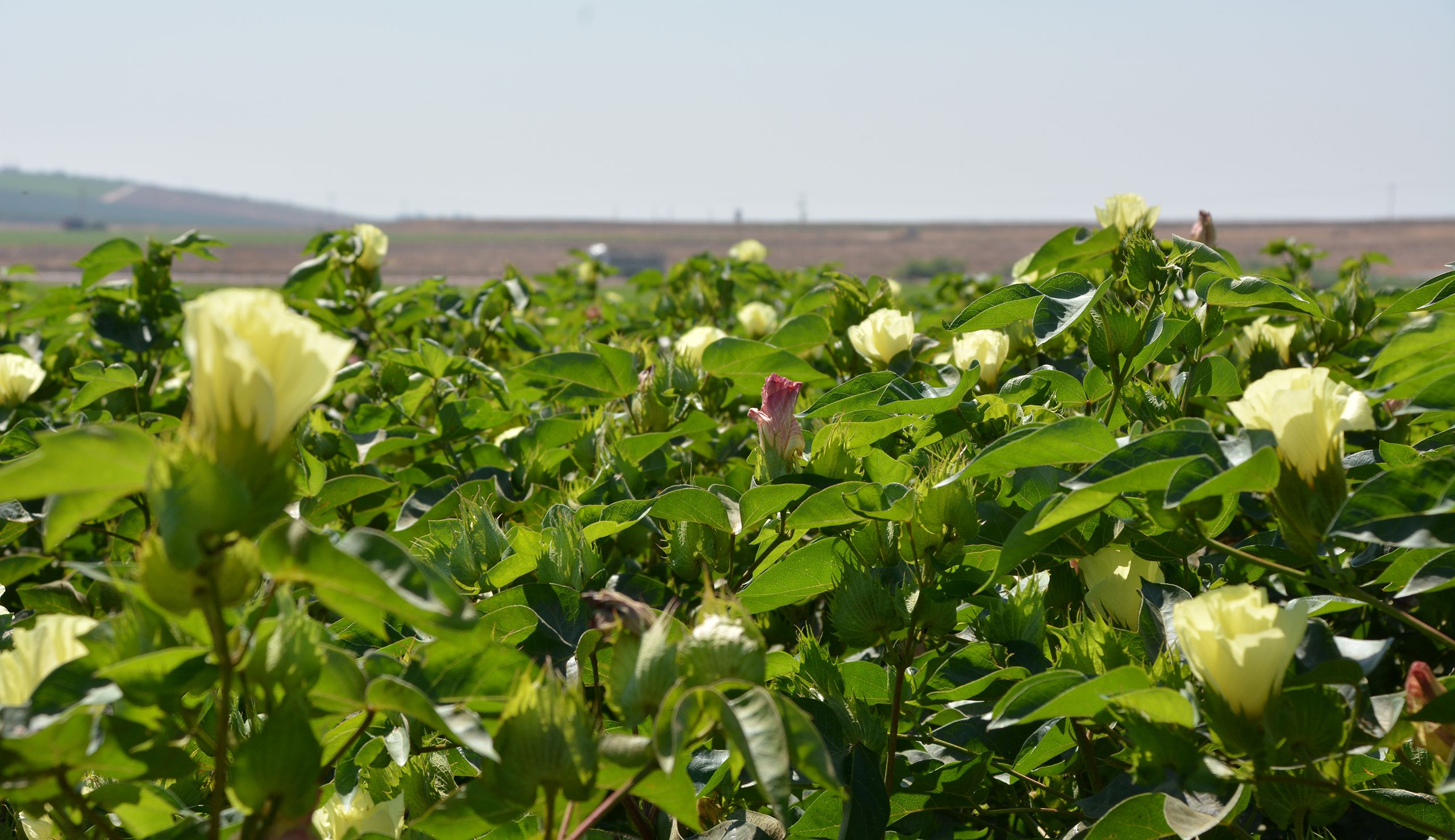
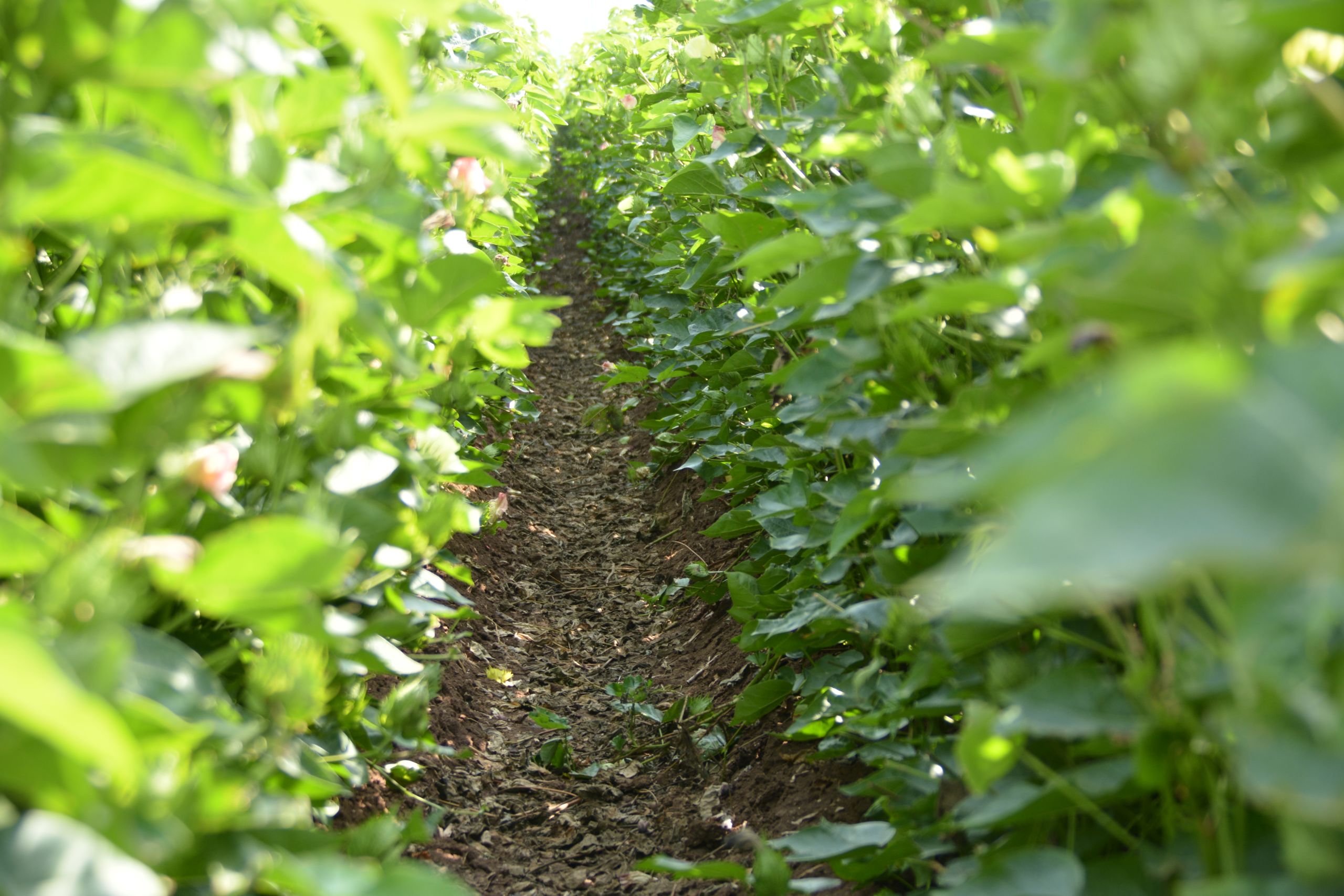
Opportunities to Advance National Embedding
South Africa
In South Africa, BCI Partner, Cotton South Africa (an organisation that represents all cotton industry stakeholders in South Africa), has a national commitment to reach 100% Better Cotton. The initiative, and the implementation of the project, are funded by the South African government as part of the Sustainable Cotton Cluster.
Mali
In Mali, BCI is working closely with Implementing Partner Compagnie Malienne Pour le Dévelopement du Textile (CMDT), a government enterprise, to develop a national embedding strategy at country level.
© BCI/Seun Adatsi, 2019. Tata Djire with cotton community members, Mali.
© BCI/Seun Adatsi, 2019. Tata Djire with cotton community members, Mali.
Greece
In 2019, BCI, Ergon and IDH, The Sustainable Trade Initiative, began a review based on the Better Cotton Standard benchmarking criteria in order to identify similarities and gaps between the Better Cotton Principles and Criteria and the approach to sustainable cotton production in Greece under the AGRO-2 agricultural sustainability standard.
The AGRO-2 standard was developed by the Greek National Agricultural Research Organisation, ELGO-DEMETER, a statutory body under the Ministry of Rural Development. ELGO-DEMETER and the Inter-professional Cotton Organization (ICO) have proposed to work in partnership to steward, promote and implement the AGRO-2 standard in cotton farming in Greece and are seeking equivalence with the Better Cotton Standard System to allow Greek cotton farmers to sell their AGRO-2 compliant cotton as Better Cotton.
Following a thorough benchmarking review, some augmentations were made to the AGRO-2 standard to align it with the Better Cotton Standard System. Once the recommendations had been implemented, Greece began the official BCI country start-up process. The process will be completed in 2020 and if successful Greece will become a new equivalent standard country and the AGRO-2 standard will be recognised as equivalent to the Better Cotton Standard. Farmers growing cotton under the AGRO-2 standard will then be able to sell their cotton as Better Cotton.
Egypt
Although Egypt has just become a new BCI Programme country (in May 2020), there is demonstrated potential for significant national embedding in the country. This is based on its Cotton Research Institute’s high level of engagement and capabilities, and interest from government departments including the Ministry of Agriculture and Land Reclamation and related agencies, the Ministry of Trade and Industry, and the Ministry of Public Business Sector.
© Rehab ElDalil/UNIDO Egypt, 2018. Farm worker with freshly picked cotton, Damietta, Egypt.
© Rehab ElDalil/UNIDO Egypt, 2018. Farm worker with freshly picked cotton, Damietta, Egypt.
What’s Next
BCI, together with its partners and stakeholders, will continue to take the lead in defining how national embedding could evolve in each country, based on country-specific contexts.
BCI is committed to empowering local actors to own and drive the implementation of the Better Cotton Standard System, in order to catalyse an evolution towards increased national ownership. We will therefore support national governments and farmers’ organisations to explore how they can implement and/or fund national BCI training programmes. In this way, they will contribute directly to establishing Better Cotton as a mainstream commodity, while BCI will be able to focus its efforts on supporting other actors and fostering continuous improvement of the standard system.
Will We Meet Our 2020 Target
National embedding is a journey, and while there is still a long way to go, we are pleased to see the progress made over the past few years. To date, we have successfully engaged with partners to promote national embedding in six countries: Australia, Brazil, Mozambique, Pakistan, Turkey and Israel. While Australia, Brazil and soon to be Israel implement and fund their own robust sustainable cotton standards (benchmarked with the Better Cotton Standard), we are working with Mozambique, Turkey and Pakistan to determine how national embedding will continue to develop and take hold in these countries. We may not hit this target, but with the additional focus on Greece, Mali, South Africa and Egypt, where we hope to have further developed national embedding strategies by the end of 2020, we have confidence in coming close.
Target Five:
By 2020, we aim for all core operational costs to be covered with earned income: 100% of donor funds go to projects at farm-level or to innovation.
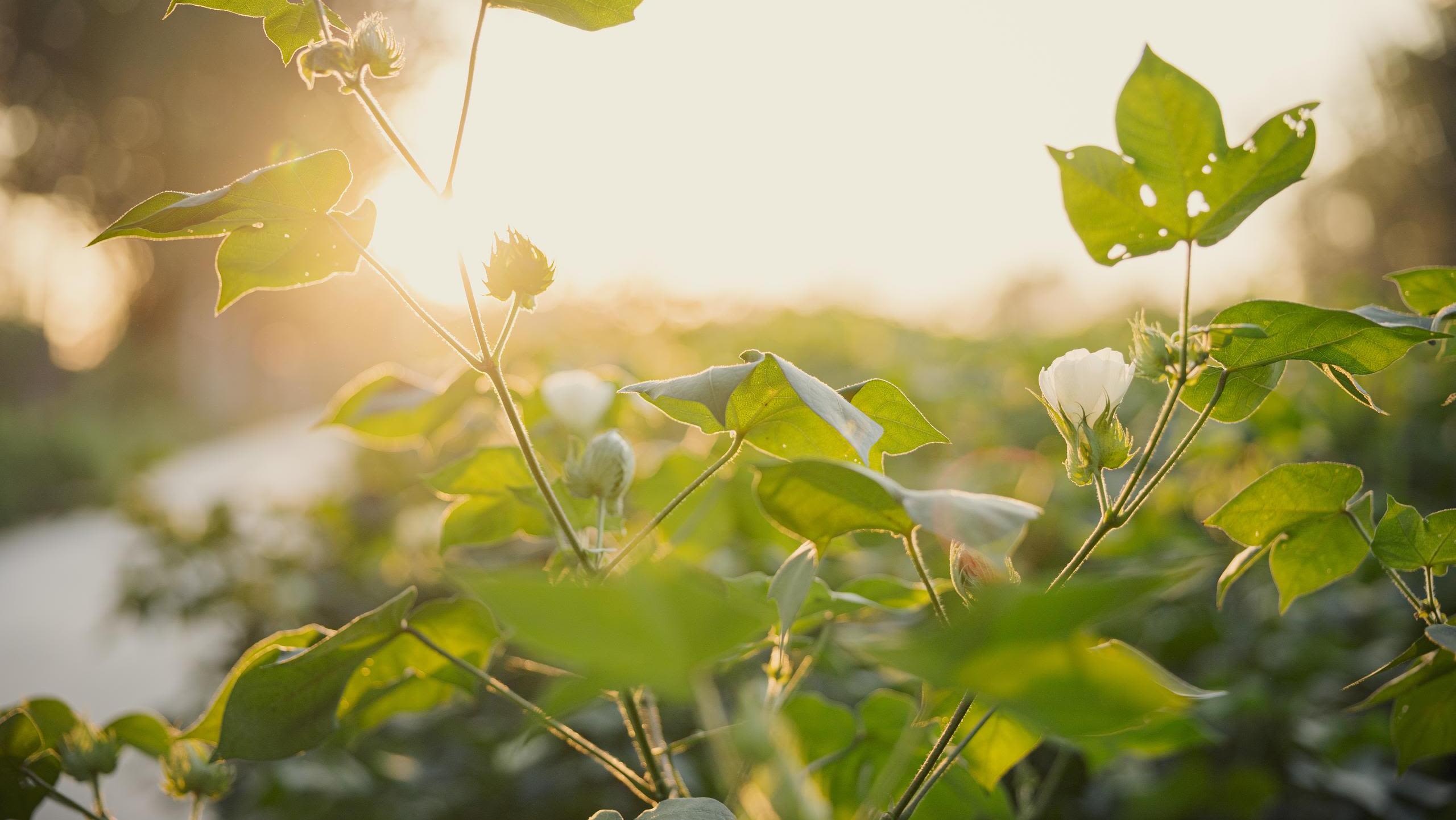
What Have We Achieved
BCI’s operational costs include the service we deliver to members in overseeing the Better Cotton Standard System, managing governance and supporting supply chain actors in implementing the Better Cotton Chain of Custody. We have already reached this target as core operational costs are covered by earned income, and all donor funding goes to field-level activities and innovation.
In 2019, BCI membership rose by nearly 29% to 1,842 members (up from 1,433 in 2018) as we recruited members across our five membership categories: retailers and brands, suppliers and manufacturers, civil society, producer organisations and associates. We saw the largest increase in retailer and brand members in any one year, as more organisations sought to incorporate more sustainable cotton into their sustainable materials strategies. As BCI has grown and recruited more Retailer and Brand Members, there has been a rise in smaller retailers and brands participating. Therefore, the increase in participation does not directly translate to a corresponding increase in income levels. Membership fees are determined on a number of factors including a company’s turnover.
The Volume-Based Fee (a fee paid by Retailer and Brand Members to BCI based on the amount of Better Cotton they source) continues to be a significant part of the funding directed to farmer support and training. The income from the fee is donated by Retailers and Brands through BCI to the Better Cotton Growth and Innovation Fund, which makes strategic investments in Better Cotton projects (find out more about the Better Cotton Growth and Innovation Fund below).
Additionally, our focus on strengthening the credibility of the Better Cotton Chain of Custody resulted in 5,665 organisations signing up to use the Better Cotton Platform (our digital system) to record volumes of Better Cotton entering and travelling along the supply chain, up from 2,000 organisations in 2018. This increase was largely due to two new developments: a requirement for suppliers and manufacturers to become platform users and record transactions on the system as the previous paper-based transactions are phased out; and the launch of an integrated registration and payment system, facilitating sign-up. We also offered introductory fee reductions to further increase user registrations. Better Cotton Platform user fees are lower than BCI membership fees and non-member users of the system do not have the same benefits or obligations as BCI Members.
Donor funding continues to be an important part of our approach to fund efforts to train and support farmers. In the past, funding has enabled BCI to build a solid infrastructure and strengthen its programmes and membership base around the world. We will continue to focus on deepening field-level impact and will work to see the financial commitments of retailers and brands match-funded by donors to continue to build the scale and impact of farmer capacity building projects across the globe.
Financial Highlights
In 2019, the Volume-Based Fee paid by retailers and brands increased by 23%, compared to the previous year. Overall, 82% of BCI funding came from the private sector, highlighting the importance of ongoing engagement with business and the growing retailer and brand membership.
Overall, BCI allocated €14 million to farmer support or training either directly through our country teams delivering capacity building support, or via Implementing Partners, some of whom are funded through the Better Cotton Growth and Innovation Fund.
Income and Expenditure
Below we have highlighted the sources of our funding and where it was allocated in 2019. This includes the combined income of the Better Cotton Initiative and the Better Cotton Growth and Innovation Fund. The financial data summarised below does not constitute a statutory set of financial statements. To receive a copy of these, please contact [email protected].
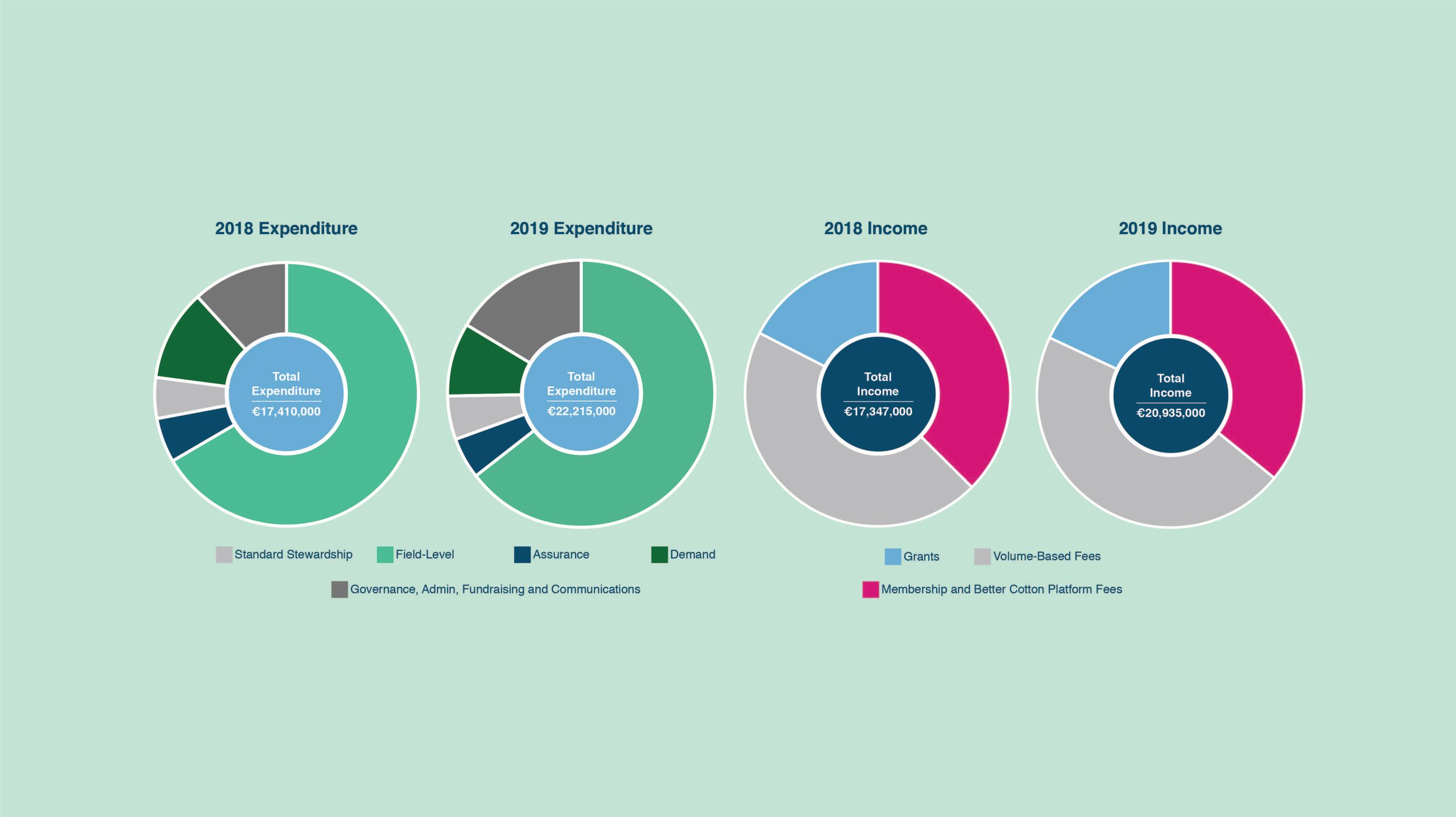

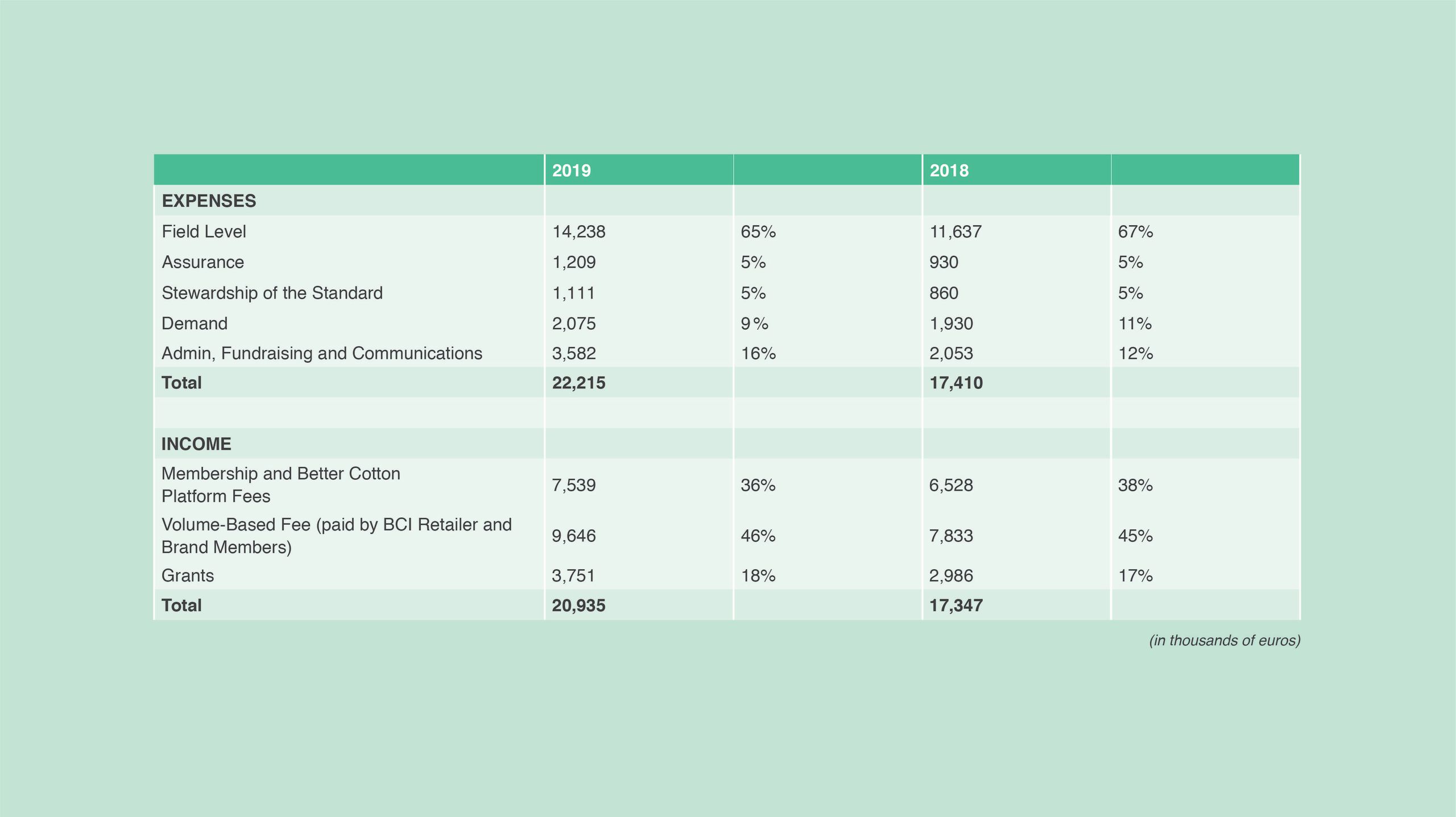
Income & Expenditure
Better Cotton Growth and Innovation Fund
The Better Cotton Growth and Innovation Fund (Better Cotton GIF) makes strategic investments in Better Cotton projects to assist BCI in reaching the farmers who need the most support. The Fund identifies and invests in field-level programmes and innovations, while fostering the adoption of the Better Cotton Standard System by governments, trade associations and other entities.
The Better Cotton GIF is governed by the BCI Council, in partnership with BCI Retailer and Brand Members, Civil Society Members and government bodies. IDH, The Sustainable Trade Initiative, is the fund manager, as well as an important funder and strategic partner of BCI.
The Fund’s ability to support farmers is directly linked to the commitment of BCI Retailer and Brand Members. Their contributions are determined by means of a fee (known as the Volume-Based Fee) based on the total volume of Better Cotton they declare to BCI as sourced during the year. The Volume-Based Fee is the primary funding mechanism of the Better Cotton GIF, enabling a mutually beneficial cycle whereby as demand for Better Cotton increases, the flow of funding to farmer training programmes rises.
In the 2018-19 cotton season, the Better Cotton GIF directly invested €11 million from BCI Retailer and Brand Members, public donors (DFAT), and IDH to support 1.3 million cotton farmers in India, Pakistan, China, Mozambique, Turkey, and Tajikistan. The Fund also mobilised an additional €3.4 million in co-funding from Implementing Partners and supply chain partners (social enterprises, ginners, spinning mills and garment manufacturers).
Over the past decade, BCI has grown and achieved a scale unprecedented in the cotton sector – it now works with more than 2.5 million cotton farmers worldwide. In the coming years, BCI’s Retailer and Brand Members need to commit to sourcing larger volumes of Better Cotton to drive increased investment at field-level and to really transform the cotton sector. There are many reasons for BCI to be successful going forward. We need to keep the momentum going.
Funding and Donor Updates 2019
In 2019, BCI and the Better Cotton Growth and Innovation Fund received grants and funding from C&A Foundation (renamed Laudes Foundation from 2020), Deutsche Gesellschaft für Internationale Zusammenarbeit (GIZ) GmbH, Helvetas / Swiss Development Cooperation, ISEAL Innovations Fund, Swedish Postcode Lottery Foundation, Swiss State Secretariat for Economic Affairs SECO, USAID DIV, IDH The Sustainable Trade Initiative, Australia Government Department of Foreign Affairs and Trade (DFAT), DANIDA, and the Dutch Ministry of Foreign Affairs. We are extremely grateful for the ongoing support of all donors and funders.
Two multi-year funding projects with USAID and C&A Foundation came to a close in 2019. Over the past three years, these organisations have donated $1 million, and €1.5 million, respectively, and their donations enabled us to scale BCI’s membership base and field-level programmes. We would like to take this opportunity to recognise the value of these partnerships. You can read more below.
USAID Development Innovation Ventures
In 2016, BCI received $1 million in unrestricted funds from USAID Development Innovation Ventures (DIV) to scale the BCI Programme. This grant gave BCI the flexibility to allocate funding to different project areas as needed, as the scope of BCI’s work expanded. This has contributed greatly towards BCI’s growth over the past three years.
A requirement under the USAID DIV grant was a Pesticide Evaluation Report and Safer User Action Plan. This work strengthened BCI’s approach to pesticide use, aligned with the revised Better Cotton Principles and Criteria, and contributed towards the development of new training modules for Implementing Partners.
C&A Foundation (Laudes Foundation as of 2020)
The C&A Foundation’s €1.5 million grant to ‘accelerate BCI to mainstream sustainable cotton production and uptake’ came at a critical time in BCI’s development. The grant was particularly valuable in terms of member recruitment and it enabled BCI to reach out across the cotton supply chain and bring a diverse group of organisations onboard to support BCI’s mission. At field level, the grant supported the development and revision of the Better Cotton Principles and Criteria, specifically in the areas of water stewardship, land use, biodiversity and gender. The funding enabled us to pilot test our new approaches in India, Pakistan and Mozambique and develop subsequent training materials and modules for BCI’s on-the-ground Implementing Partners.
As the three-year grant period came to a close, BCI and C&A Foundation took part in an independent external evaluation. The independent evaluators interviewed 41 people, including BCI staff, industry professionals and partner organisations. The evaluation looked at the work covered by the grant in terms of its effectiveness, sustainability and scalability, relevance and efficiency – the results were positive.
Overall the value added by the grant was considerable across all the grant project goals. The evaluation highlighted many achievements that had exceeded expectations, including the recruitment of retailers and brands and boosting uptake of Better Cotton. It also provided key recommendations for BCI, such as adapting BCI’s value proposition and recruitment approach for new markets and countries, and telling a compelling, evidence-based Better Cotton story directly to consumers and others in the supply chain.
BCI is the world’s largest cotton sustainability programme and is responsible for putting sustainable cotton on the map. For a single initiative to have reached 22% of global cotton production is impressive. To our knowledge, this is unique. The Better Cotton Standard System was designed for scale and it has achieved that in a short period.
New GIZ Project Funding
In 2019, BCI received €1.2 million in funding from the Deutsche Gesellschaft für Internationale Zusammenarbeit (GIZ) GmbH to improve farming practices – leading to more sustainable and higher cotton yields – in the Indian State of Maharashtra. The objective of the project funding is to train 140,000 cotton farmers on the Better Cotton Principles and Criteria so that they can become licensed BCI Farmers in the 2019-2020 season.
The project is being implemented by BCI Implementing Partners, Ambuja Cement Foundation and Lupin Foundation, and will run for a period of 12 months, from August 2019 to July 2020.
The BCI Team
In 2019, the BCI Secretariat consisted of 93 staff, working across the UK, Switzerland, China, Brazil, Burkina Faso, Mali, Kenya, Turkey, Pakistan, India, Mozambique and the US. Our 76 Strategic Partners and Implementing Partners worked with hundreds of Producer Unit Managers, thousands of Field Facilitators and tens of thousands of Lead Farmers in 23 countries to deliver training and support to millions of cotton farmers.
Please note that the Field Facilitator and Lead Farmer figures are estimates.
ISEAL Member
ISEAL is the global membership association for sustainability standards, and its member base includes some of the most recognised and credible standards systems in the world. Being an ISEAL member is a sign of trust that a standards system is credible and has been developed following globally recognised good practices. BCI gained full ISEAL membership in 2016. With the recognition of ISEAL, BCI Members can have confidence that by supporting Better Cotton, they are supporting a more sustainable future for the cotton sector as a whole.
Thank You
We would like to thank the following committed stakeholders, who, by supporting and participating in BCI, are driving change. Together, we are working towards a more sustainable future for the cotton sector.
- BCI Farmers who work tirelessly to produce a more sustainable raw material essential to the daily lives of nearly every person on the planet.
- Implementing Partners and Strategic Partners (2018-19 cotton season), who bring the Better Cotton Standard System to life at farm level every day, helping us to reach millions of farmers.
- All BCI Members, who across the supply chain are working with us to create transformational change within the cotton sector.
BCI Implementing Partners
Africa (various countries)
Aid by Trade Foundation (AbTF)
Australia
Cotton Australia
Brazil
Associação Brasileira dos Produtores de Algodão (ABRAPA)
China
Binzhou Nongxi Cooperative, XPCC Cotton & Linen Trading Co., Ltd (suspended from 15 Jan 2020), Yuli Zhong Wang industry and trade company Ltd, Guoxin Rural Technical Service Association, Xinjiang Luthai Fengshou Cotton Industry Co. Ltd., Akesu Jintian Farm Co., Ltd, Yuli County Zhongliang Cotton Co.,Ltd, HuaFu Top Dyed Melange Yarn Co.,Ltd, Shandong Huitong Textile Co. Ltd., Xinjiang Taichang Industrial Co. Ltd., Changzhou Keteng Textile Co., Ltd, Solidaridad China, Cotton Connect China, Songzi Agriculture Technology Promotion Center
India
Cotton Connect India, Trident Ltd, Arvind, Vardhman, Basil Commodities Pvt.Ltd, SIPL, Pratibha Syntext Ltd., Mahima, STAC INDIA, K.K. Fibres, WWF-India, Deshpande Foundation, Action for Food Production (AFPRO), Ambuja Cement Foundation (ACF), Participatory Rural Devpt Initiatives Society (PRDIS), MYRADA Kaveri Pradeshika Samsthe (MYKAPS), Coastal Salinity Prevention Cell (CSPC), Udyansh Gramin Samaj Sewa Samiti (UGSSS MP), Lupin Human Welfare And Research Foundation, Farmer Association For Rural Management (FARM), Bharat Cotton, Vrutti, Self Employed Women’s Association (SEWA), Aga Khan Rural Support Programme-India (AKRSPI), Development Support Centre (DSC), Puneet Enterprises
Israel
Israel Cotton Production and Marketing Board
Kazakhstan
Louis Dreyfus Company Kazakhstan
Madagascar
TianliAgri, Conseil Cotton
Mali
Association des Producteurs de Coton Africains (APROCA), Compagnie Malienne Pour le Dévelopement du Textile (CMDT)
Mozambique
Instituto do Algodão de Moçambique (IAM), OLAM, SAN/JFS, SAN/AM, FESAP
Pakistan
Sangtani Women Rural Development Organization, Cotton Connect Pakistan, WWF-Pakistan, CABI, Lok Sanjh Foundation, REEDS, Mariam Rural Welfare Organization, Yazman
South Africa
Cotton South Africa
Tajikistan
Sarob
Turkey
İyi Pamuk Uygulamaları Derneği (IPUD), WWF-Turkey
United States
ECOM, Quaterway, Allbright, PCCA, Allenberg-ProCot, Cargill-IP, Indigo, OLAM, StaplCoton, Loeb & Sons
Please note that this is our partner list for the 2018-19 cotton season. You can find our most up to date partner list on the BCI website.
Secretariat and Fund donors
Secretariat Donors
- C&A Foundation (now the Laudes Foundation)
- Deutsche Gesellschaft für Internationale Zusammenarbeit (GIZ) GmbH
- Helvetas / Swiss Development Cooperation
- ISEAL Innovations Fund
- Swedish Postcode Lottery Foundation
- Swiss State Secretariat for Economic Affairs SECO
- USAID DIV
Better Cotton Growth and Innovation Fund Donors
- IDH, The Sustainable Trade Initiative
- Australian Government Department of Foreign Affairs and Trade
- C&A Foundation
- DANIDA
- Swiss State Secretariat for Economic Affairs (SECO)
- Dutch Ministry of Foreign Affairs
This report is made possible by the generous support of the American people through the United States Agency for International Development (USAID). The contents are the responsibility of the Better Cotton Initiative and do not necessarily reflect the views of USAID or the United States Government.

Better Cotton Country Snapshots
Did you know that Brazil produced the largest volumes of Better Cotton in the 2018-19 cotton season and that India had the greatest number of licensed BCI Farmers? In our new Country Snapshots, we dive into each country where Better Cotton is grown and explore the successes, challenges and key changes that occurred in the 2018-19 cotton season.
Explore the Better Cotton Country Snapshots.
We joined the ABR and BCI programmes in 2013 as we wanted to be 100% aligned with the social, environmental and economic best practices championed by the two Standards. Over the years we have increased our operational efficiency; focused on continuously improving our processes from soil preparation to harvest practices; made better use of available resources and technology; and placed a greater focus on long-term sustainability.


